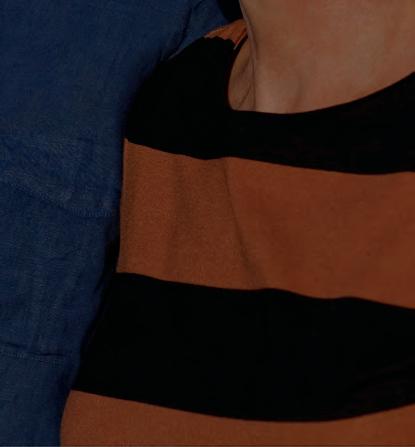








Catherine Haughney, editor of Reader’s Digest, welcomes you to the September issue
Tell us what you think of this issue: theeditor@readersdigest.co.uk
Like us on Facebook: facebook.com/readersdigestuk
Follow us on twitter: twitter.com/rdigest










Catherine Haughney, editor of Reader’s Digest, welcomes you to the September issue
Tell us what you think of this issue: theeditor@readersdigest.co.uk
Like us on Facebook: facebook.com/readersdigestuk
Follow us on twitter: twitter.com/rdigest

“Peter Kertesz is a world authority on animal dentistry,” points out David Higgs, director of The Environmental Press Agency. “His patients could range from elephants to hedgehogs.” p48

“We all need the law to cover us from racism and homophobia,” says education expert Tony Sewell. “But let’s not turn it into a comfort blanket for ‘minorities’ that stifles individuality.” p56

“I was amazed by the courage of the team that rescued Lauren,” says journalist Kenneth Miller
“Also, this woman’s resilience persuaded me to be less flustered by setbacks in my own life.” p78

was

If, like me, you dislike going to the dentist, you’ll be amazed by our article on p48. Dr Peter Kertesz fell into animal dentistry by chance after a vet asked for help with a cat that needed a dental operation. Now he’s arguably the world’s pre-eminent zoo dental surgeon. He’s worked on the molars, fangs and tusks of lions, elephants, gorillas and a whole host of other animals—sometimes using drill bits that are four inches wide and 25 inches long!
For a completely different take on life, why not read Josh Widdicombe’s column about September on p139? Josh sees September as a quiet, contemplative month that falls between the fun of summer and the build-up to Christmas. If he’s right that means you’ll have plenty of time to stay in and read this month’s issue! Reader’s








Send us your stories, jokes and letters—if we publish, we pay!
£50 for the star letter and £30 for regular letters.

Email readersletters@readersdigest. co.uk or write to Readers’ Letters, Reader’s Digest, 1 Eversholt Street, London NW1 2DN £50 for the true stories, anecdotes, jokes in Laugh! and You Couldn’t Make It Up…, and contributions to end-of-article fillers, Travel and Gardening. Email excerpts@ readersdigest.co.uk or write to Excerpts, Reader’s Digest, 1 Eversholt Street, London NW1 2DN
SubScribe!

Visit readersdigest.co.uk or write to Reader’s Digest, PO Box 444, Douglas, Isle of Man IM99 3ZF.
UK: £45.48 a year. Republic of Ireland: €74.39 a year. Europe: £50 a year. Rest of the world: £60 a year. Prices include delivery. For Gift Subscriptions contact Customer Services below
cuStomer ServiceS talking magazineS
Contact Customer Services for renewals, gifts, address changes, payments, account information and all other enquiries. Phone: 0871 351 1000 (Calls from a BT landline will cost 10p a minute. Call costs from other providers may vary.) Email: customer_ service@readersdigest.co.uk
Minicom: 0870 600 1153.
twitter.com/rdigest
Reader’s Digest is available in a talking edition for blind and partially sighted people for £16. For details, phone: 01435 866 102; email: info@ tnauk.org.uk, website: tnauk.org.uk.
Ensure submissions are not previously published. Include your name, email, address and daytime phone number with all correspondence. We may edit letters and use them in all print and electronic media. Contributions used become world copyright of Vivat Direct Ltd (t/a Reader’s Digest).
We cannot acknowledge or return unpublished items or unsolicited article-length manuscripts. Do not send SAEs. Articlelength stories, poetry and cartoons are not requested.
facebook.com/readersdigestukReadingTheDigest
Who needs a tractor?





Well it’s one way of transporting a pony. Another would be in the back of a Jazz. When a Scottish farmer’s tractor broke down, he popped the boot, flipped the Magic Seats and drove his prize Shetland to the local horse show. Not the most conventional way to use the versatile Jazz. But probably the most Honda one.












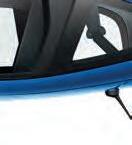



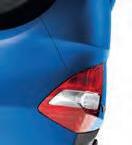



honda.co.uk/tractor
Fuel consumption figures for Jazz i-VTEC petrol models in mpg (l/100km): Urban 40.9 - 45.6 (6.9 - 6.2), Extra Urban 57.7 - 61.4 (4.9 - 4.6), Combined 50.4 - 54.3 (5.6 - 5.2). CO2 emissions: 129 - 120g/km. Fuel consumption figures sourced from official EU-regulated laboratory test results, are provided for comparison purposes and may not reflect real-life driving experience.
Model shown: Jazz 1.2 i-VTEC S Manual in optional Azure Blue Metallic at £12,145 On The Road. Terms and conditions: New retail Jazz 1.2 i-VTEC registrations from 1 July to 30 September 2013. Subject to model and colour availability. Offers applicable at participating dealers and are at the promoter’s absolute discretion. Honda Aspirations (PCP): £145 per month example based on Jazz 1.2 i-VTEC S Manual in metallic/pearl paint at £12,145 total cash price (and total amount payable) with 36 months’ 0% APR Representative (interest rate per annum 0% fixed) with £2,530.28 (21%) deposit, Optional Final Payment of £4,394.69, annual mileage of 10,000 and excess mileage charge 3p per mile. You do not have to pay the Final Payment if you return the car at the end of the agreement and you have paid all other amounts due, the vehicle is in good condition and has been serviced in accordance with the Honda service book and the maximum annual mileage has not been exceeded. Indemnities may be required in certain circumstances. Finance is only available to persons aged 18 or over, subject to status. All figures are correct at time of publication but may be subject to change. Credit provided by Honda Finance Europe Plc. 470 London Road, Slough, Berkshire SL3 8QY. Servicing: Four years’ servicing or 50,000 miles, whichever comes first, for £399 including VAT and includes a maximum of four manufacturer’s scheduled services.
Online this month…

check out our fabulous apps, too! go to the App Store, iTunes music store, google Play Store and Amazon to download our magazine apps onto your iPad, Kindle or tablet.
web exclusive Finding it hard to relax? Then you need our nine-step guide to chilling out. From clearing your mind to avoiding “frenemies”, we have the lowdown on the easiest ways to let go. Go to readersdigest.co.uk/ magazine.
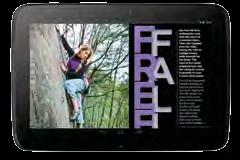



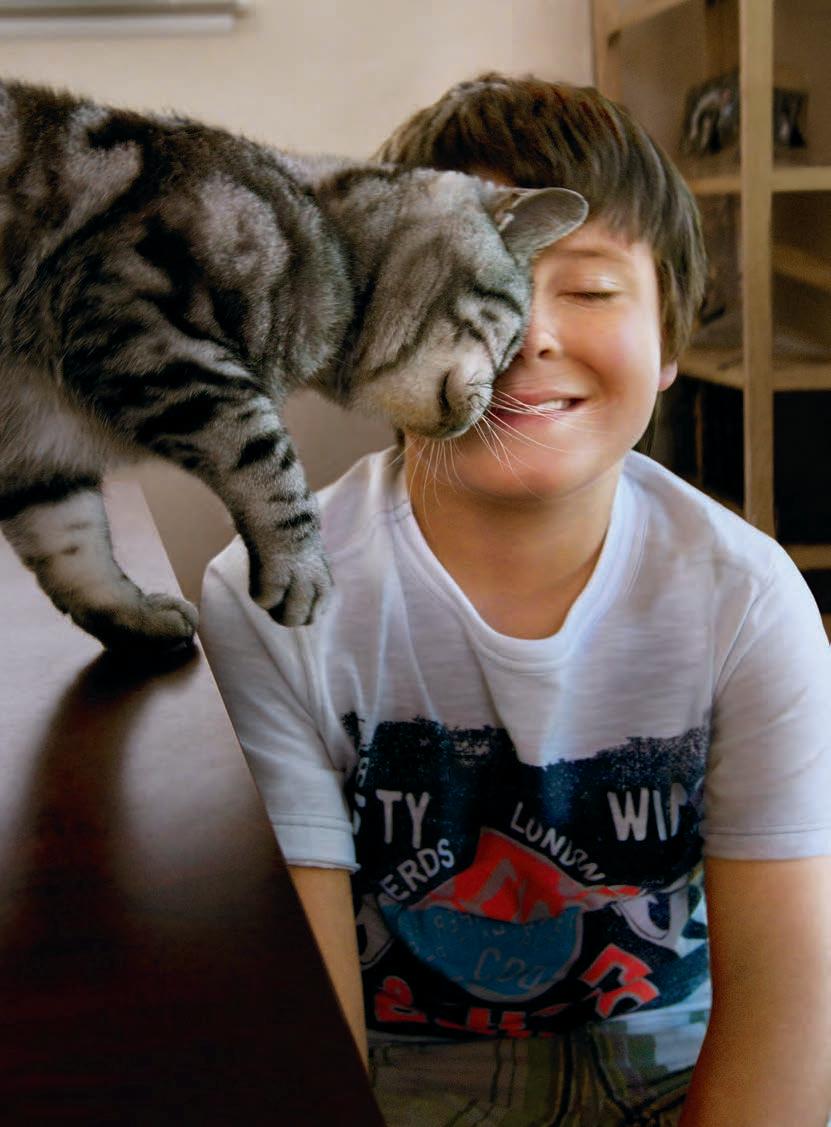










£30 For eAch pubLisheD Letter, £50 For the Letter oF the moNth! see p4 For more DetAiLs


I felt that Dr Sandi Mann’s Maverick article “We Don’t Know What Real Anger is Any More” missed a major cause of tension in today’s society. As an expat American who’s lived in Britain for almost 20 years, I’ve seen the population grow, congestion increase and dayto-day living become more frustrating. As I dealt with others who were facing the same issues, I saw this irritation start to feed on itself.
Six years ago, I moved to Dublin. Life here is far less crowded and the ease with which I can navigate the day has greatly increased. Over time, my bad temper has subsided—I’m more inclined to smile and treat people nicely, and others are the same to me. I’m identical to the person I was in the UK, but the difference is in the environment around me.
James Quinn, DublinDr Sandi Mann mentioned an occasion when she angered other drivers simply by hesitating at a junction. It illustrates how riled we get over the small stuff, and things like car horns rarely help the problem. The warning message they’re designed to convey is obscured by a howling, wordless accusation.
I’m not suggesting we should ban car horns, but a friendliersounding device should perhaps be invented for those times when the car in front doesn’t notice the traffic lights change.
Andrew Ferguson, North Lanarkshire
In his Medicine column, Max Pemberton asked if science and faith are so different after all, and wondered if science is also a matter of faith. The simple answer is no.
Science may not be perfect, but when it comes to explaining the universe we live in, it’s the only method we have. That’s why we rely on it so much in our daily lives. I really hope Max’s confusion was short-lived—it would be dreadful to think of his next patient having to endure


kirstie mcmurray @kirstieradio
Only good news at dentist today is that @rdigest is still on the go! #goodread
a series of exorcisms instead of a simple course of antibiotics.
David bennett, stoke-on-trent
the perfect manifesto
I think a world ruled by Cerys Matthews would be a wonderful thing! Allowing children to find their unique talents and getting rid of bad teachers—whether they have first-class degrees or not—would improve education at a stroke. And banning AutoTune would make all who enjoy singing, but don’t aspire to be the next superstars, feel more positive about themselves.
Any ideas that bring people together can only have good knock-on effects.
Jenny Armes, Norfolk
don’t spit on your luck
In response to “What’s Next for the NHS?”, it’s hardly surprising that this great institution isn’t performing when politicians take every opportunity to undermine it. They should stop using the NHS as a political football and instead recognise its qualities and give encouragement. Then, as staff in the NHS begin to regain their confidence and
self-esteem, we’ll see a dramatic change overnight.
Josh sumner, London
neglected isle
“Any ideAs thAt bring peopLe together cAn onLy hAve good knock-on effects”


It’s a shame that you failed to mention Brownsea Island, off Poole Harbour in Dorset, in your Best of British feature. It’s famous for its large red-squirrel population, as well as being the birthplace of the Scouts and Guides, who first camped there in 1907 with their founder Lord Baden-Powell. It’s now owned by the National Trust, but the nature reserve is leased by Dorset Wildlife Trust.
I’ve many happy memories of childhood summer days spent at Brownsea—it really is a tranquil and beautiful place.
Dawn Vanstone, Devon
best foot forward
It was interesting to learn about radio presenter Chris Evans’s varicose veins in Susannah Hickling’s health column. He should try laser therapy, which worked well for me. Although a little painful during the procedure and uncomfortable for two weeks after, the results (pictured left) are great.
The only drawback in my case was leaving it too late. I’m 82 now and the lower parts of my legs are discoloured—the procedure sadly doesn’t resolve that.
John bennett, West sussex


If you spit blood when you brush your teeth, it could be an early sign of gum disease, a leading cause of tooth loss. So, if you spit blood in the sink when you brush your teeth, try Corsodyl Mint Mouthwash. Nothing is more effective at treating gum disease.* Find out more at www.corsodyl.co.uk
CLINICALLY PROVEN. FOR PEOPLE WHO SPIT BLOOD WHEN THEY BRUSH THEIR TEETH.

*Over the counter medicines only. Corsodyl Mint Mouthwash contains chlorhexidine digluconate. Bleeding gums can be a sign of gum disease and not treating may lead to tooth loss. Always read the label. CORSODYL is a registered trade mark of the GlaxoSmithKline group of companies.




 Author and BBC4 Review Show critic Natalie Haynes on the new releases
Author and BBC4 Review Show critic Natalie Haynes on the new releases
Troubled relationship: Cate Blanchett and Alec Baldwin as husband and wife

r a d ar your short, sharp guide to september ►
Blue Jasmine Woody Allen has been on something of a late-period roll lately, and this film shows every sign of continuing the trend. Cate Blanchett plays Jasmine, a woman on the edge of a nervous collapse after her husband turns out to be a fraudster and leaves her stony broke, with nothing but a constant supply of Stoli vodka and Xanax to calm her down.

She heads to San Francisco to stay with her sister Ginger and her boyfriend Chili (Sally Hawkins and Bobby Cannavale, below). Her low opinion of Chili only adds to the misery of it all. Bittersweet comedy has been Allen’s mainstay for so long, you know you’re in safe hands here.
Blanchett and Hawkins are already being touted as Oscar nominees, and you wouldn’t bet against Allen either. Crack open the vodka and start toasting!
Filth When Ewan McGregor starred in Trainspotting, based on the Irvine Welsh novel, a star was born.
James McAvoy is already a Bafta-nominated actor, but he gives an equally fearless performance in this adaptation of Welsh’s less-wellknown novel, which follows the antics of corrupt junkie cop Bruce Robertson.
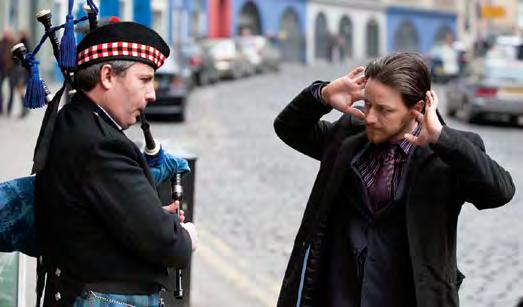
Robertson wants a promotion, and a vicious mugging in an Edinburgh underpass provides the perfect opportunity for him to solve the crime, impress his wife and trash his colleagues along the way. But nothing is what it seems, and the more he tries to get ahead, the more disastrous his life becomes.
As with all Welsh’s work, a strong stomach is required to sit through some moments in this movie, but the vibrant, scabrous energy and the awful bleak humour carry it through.

Colin Williams, 53, NHS manager

Watching: Luther (BBC1) I love that there are several cliffhangers during the series but nothing’s really revealed until the very end.
Reading: The Blood of Gods by Conn Iggulden A factional account of the hunt for the 23 men who stabbed Julius Caesar. None dies of natural causes…
Star Trek: Into Darkness
Benedict Cumberbatch is in fine scenerychewing form as the villain fighting Kirk and the rest of the crew.

Byzantium Gemma
Arterton and Saoirse Ronan co-star in this atmospherically seedy British vampire flick.
Online: ourproperty.co.uk Tells you the sold prices of houses in a street. Great if you’re a landlord like me.
Listening: The Boy Next Door by Stacey Kent She sings jazz versions of old songs by the likes of Cole Porter. It’s great to hear classics refreshed.


BBC 6
Music’s Stuart Maconie’s pick of the recent releases
Rewind the Film by Manic Street Preachers Think angry rock situationists in no electric guitars shock. When the Manics played their raging single “Faster” on Top of the Pops in the mid-90s, sung by James Dean Bradfield in a terrorist balaclava, it prompted more complaints than any performance in the show’s history. The joy of the Manics is their ecstatic embracing of opposites: austere fury, exultant choruses and, on this new record, warm, cinematic meditations on morality and community. It’s all gorgeous but the title track, sung by Richard Hawley, is mesmerising.
Vagrant Stanzas by
MartinSimpson Think the guitarists’ guitarist. Martin Simpson has been a professional musician since he dropped out of school and has played with everyone in the folk and roots worlds. In his own right, he’s both a dazzling guitarist of prodigious skill and a fine songwriter; his song about his dad, “Never Any Good”, has won countless awards and reduced grown men to tears. This new collection mixes classics by Bob Dylan and Leonard Cohen with Martin’s own songs.


Electric by Pet Shop Boys Think the wry duo get out of the library and back to the nightclub. This record had been widely touted in previews as a return to form. This is a tad misleading and unfair since a) every Pet Shop Boys record gets described thus and b) their last record was rather good, actually. But there’s no doubt that while Elysium was a lush and reflective suite of songs, Electric is a gurning, sweaty disco album. It’s an exhilarating, hedonistic hour and only the Pet Shop Boys could write a song called “Love Is a Bourgeois Construct”.

Technology expert, BBC 5 Live presenter and Answer Me This! podcaster
Olly Mann reveals the latest must-haves
also on our radar…
September 5
The O2 London Mela, Gunnersbury Park, London
September 7
Braemar Royal Highland Gathering, Aberdeenshire
September 10
Man Booker prize shortlist announced,
September 30–
October 6
Henley Literary Festival, Oxfordshire
Beurer MG Music seat cover, £249.99 If you’ve ever sunk into one of those gauche leather massage chairs at an airport or shopping mall and thought, Oooooh, that’s nice, perhaps we could get one at home, then gasped with disbelief when confronted with the four-figure price tag, this seat cover—which fits over almost any chair—might be the solution for you. Replete with two rotating massage heads, three different styles of massage, a warming heat function and even integrated loudspeakers to plug into your iPod, it’s a wonderful way to unwind.

Tefal OptiGrill, £129 “How do you like your steak?”
If your guests respond to this perfunctory question with
and check out…

Huawei E5756
MiFi, £79.99
Trains with on-board Wi-Fi are great in principle, but the signal’s usually atrocious. Instead, create your own hotspot with 3’s Ultrafast pocket-sized router.


tedious precision (“Exactly medium-rare-to-medium or it loses all flavour!”), consider investing in either new friends, or the OptiGrill. The latter has a light-indicator system: yellow is for rare, orange for medium, red for well done, so you needn’t keep lifting the lid to monitor the meat. But, seriously, consider getting new friends.
Lumi (lumi.do)
This free service cleverly creates a personalised, constantly updated news feed, based on your browsing history.
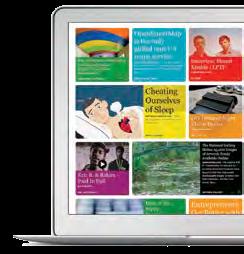


ESPNcricinfo cricket blogger, one half of The Bugle podcast and stand-up comedian Andy Zaltzman previews the best of the month’s action
Minnesota Vikings v Pittsburgh Steelers, Wembley Stadium, September 29
Back in the day, Viking raids used to be a regular feature of London life. Now a new generation of Vikings descends on the capital, also clad in silly helmets and shouting a lot, and also liable to be accused of “unnecessary roughness” (a technical American Football offence these days, rather than a lifestyle choice). But six-time Super Bowl champs the Steelers will fancy their chances in this annual NFL showcase game. The Vikings haven’t scored a significant victory on these shores since the Battle of Assandun in 1016.
Rhythmic Gymnastic World Championships, Kiev, September 14–24
Head to the Ukraine for more ribbon waggling than you can shake a stick at. And quite a bit of stick-shaking
as well. For five years Olympic champion Evgenia Kanaeva, who won golds in ball, hoop, clubs, ribbon, all-round and team events in the 2011 World Championships, was your go-to girl if you ever wanted an object lobbed around elegantly by someone in a spangly leotard. But she’s retired and, though she could probably still do a decent routine with a Hoover, a porcelain figurine of Boris Johnson or a dead cat, the path is clear for world number one Ganna Rizatdinova (below) to swizzle and twizzle her way to victory in front of her home crowd.
Men’s Volleyball European Championships, Denmark and Poland, September 20–29
This is real volleyball, a rather more compelling sport than its rogue two-a-side beach cousin. However, real volleyball does not feature women in bikinis diving around in a sand pit. Therefore, it’s viewed by the world’s media as a rather less compelling sport. Such is life. Such are sand pits. Defending champions Serbia will endeavour to stop Russia adding to their thrilling 2012 Olympic gold. n

¶ during a previous job as an ambulance man, I was transporting a geriatric outpatient back to his home when he asked to use a urine bottle. I tried to persuade him to hang on, but he wasn’t having any of it. The bottle was provided and duly filled. It was only then I realised that there was no cap for the bottle.
I explained the problem to my driver and asked him to pull over so I could pour out the contents. Obviously wanting to finish on time, he took the bottle from me with a brisk, “Give it here!” and poured it out of his open window.
I often wonder whether the motorcyclist overtaking us ever discovered where the sudden rain shower came from.
Trevor Jones, Scunthorpe, Lincolnshire
¶ I’d just started an autumn computer course at our local college. One lady, recognising another at the end of the evening, asked, “How’s Jacob?”
Believing this to be her husband, I was a bit surprised when the answer came back, “Oh, he’s fine. I’ve put him in the shed for the winter.”
Alison Ouchterlony, Angus
¶ Waiting in the queue at the bank the other day, I noticed an exceptionally big lady in front of me and a teenage boy behind.
“if your father says it’s a tree, it’s a tree…”
Suddenly the lady’s mobile phone started bleeping, and the boy behind me piped up, “Mind yourself, she’s reversing!”
Chris Martin, London
¶ My 93-year-old father lost his eyesight a year or so ago, and he now listens to BBC Radio 5 to keep up with the news in the outside world.
Every now and then, he has questions about things he hasn’t fully understood. A recent one was, “Who’s this Dougal they keep talking about?”
I replied that I didn’t know.
“He seems to be very well known,” he said, and put his headphones back on. Five minutes later, he said they were talking about Dougal again on the radio.
Eventually, the penny
dropped and I told him that Google is a way of searching for things on the internet.
Les Smith, Buckingham
¶ While out walking my dog one morning, a small girl in white clothes and matching socks suddenly appeared before me.
“Selkie!” I screamed, as my ever-sociable cocker spaniel jumped up at her.
“How old is Selkie?”
the child asked, as the dog licked her.
“She’s six.”
“And how old are you?”
“I’m 56.”

“do you have one that says, ‘sorry about the bad financial advice’?”
Win £50
“If you die within the next week or so, can I have your dog?” she asked timidly.
Helen Carmichael, Gwynedd
¶ We were a bit taken aback when our six-year-old daughter Jessica suddenly asked us, “What’s a prostitute?”
Quick as a flash, I replied,
¶ as i pulled into a car park and stopped at the barrier to get my ticket, I noticed that the ticket machine had a sign on it that said, “Depress button to get ticket.”
for your true, funny stories. email excerpts@ readers digest.co.uk or go to facebook. com/readers digestuk
I was in a particularly jovial mood, so I said to the button, “You’re an ugly button!”
Then I felt guilty at insulting the button, so I apologised to it.
“Mummy will explain that,” and then listened while mummy did a good job of explaining to her what a prostitute was.
My daughter looked a bit puzzled, so I asked her why she wanted to know. She said that her cousin Anthony, knowing that we were regular churchgoers, had asked her if we were Catholics or Prostitutes.
Keith David, BridgendThen, realising that I’d just apologised to a ticket machine, I cracked up laughing.
I think I’m reaching that stage in life.
Felicity Hall, Cheshire n










































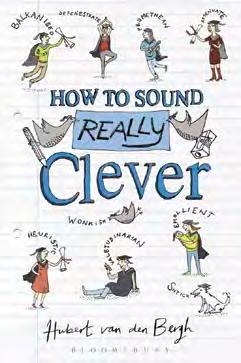
1 bromide n A poison
B praise C trite remark
2 impolitic adj A unwise
B hasty C excessively rude
3 emollient adj
A soothing B irritating C of strong opinions
As cycling becomes ever more popular in Britain, those on two wheels will have to keep their eyes out for doorers—a person who causes you to come off your bike by opening a car door.
RD Rating: Useful? 7/10 Likeable? 8/10
Have you ever wanted to impress with your range of words? Well, now’s your chance. We’ve picked a selection of “smart” words from new book How to Sound Really Clever (£9.99) that will add a dash of intellect to any conversation. But do you know what they mean? Answer A, B or C below.
4 chugger n A keen exerciser B charity mugger
C someone who drinks to excess
5 mnemonic n A short poem B electronic device
C memory aid
6 unalloyed adj A tainted B pure C dull
7 hecatomb n A any great sacrifice B underground tunnels C Gothic church
8 entente n A outside camp or dwelling B shy person C understanding between factions
9 somatic adj A relating to sleep B relating to the body C relating to politics
10 ambit n A tall structure
B gamble C the scope of something
11 philippic n A tirade
B pick-me-up C extreme praise or flattery
12 gambit n A loud roar
B ploy C written report
13 darkling adj
A getting old B growing dark C really scary
14 libation n A lubricant
B sedative C alcoholic drink
15 toque n
A style of hat B ski slope
C type of jacket
We have 25 free copies of How to Sound Really Clever by Hubert van den Bergh to give away free! Please email the definition of valetudinarian to excerpts@readers digest.co.uk by September 13 with your postal address—the first 25 correct answers
we get will receive a copy of the book.
martin clunes’s favourite word?
Phoenix. “Don’t ask me why, I just love it, it’s magnificent.”
9–11 getting there
12–13 impressive 14–15 word-power wizard!
1 bromide C
trite remark intended to be soothing. “No amount of bromides could lift my mood.” Originally referring to a sedative containing potassium bromide.
2 impolitic A unwise. “It’s impolitic to order expensive wine if someone else is paying.” Latin politicus (civil).
3 emollient—A soothing. “After causing offence, he spoke in more emollient tones.” Latin emollire (to make soft).
4 chugger—B charity mugger. “I don’t mind donating cash, but chuggers can be annoying.”
5 mnemonic C device to aid memory. “The ‘30 days hath September’ rhyme is a mnemonic.” Greek mnemonikos (of the memory).
6 unalloyed—B pure. “Andy Murray’s expression was one of unalloyed joy.” The negative of Old French aloier (to combine).
7 hecatomb A any great sacrifice. “Many men died in the hecatomb of the First World War.” In Ancient Greece, a
Derived from a Greek word toxon, which is a type of bow for firing arrows. It’s thought that this word came to mean “poisonous” because of the Ancient Greek myth of Hercules. His second labour was to slay the nine-headed Hydra— once this was done, he dipped his arrows in the Hydra’s blood, which made them poisonous.
“hecatomb” was a sacrifice of 100 oxen. Greek hekaton (hundred) and bous (ox).
8 entente C understanding between factions. “The policy tested the strength of the recent entente.” French.
9 somatic B relating to the body. “Cancer is a somatic illness” Greek somatikos (of the body).
10 ambit C
the scope of something. “Any woman between the ages of 20 and 40 fell within his dating ambit.” Latin ambitus (circuit)
11 philippic A tirade. “The journalist penned a philippic against Play WP online: go to readersdigest. co.uk/wordpower

her cheating husband.” From speeches of ancient Greek orator Demosthenes, who made verbal attacks on Philip ll of Macedon.
12 gambit—B ploy. “Blaming traffic for lateness is a favourite gambit.” Italian gambetto (the act of tripping someone up in wrestling).
13 darkling B growing dark. “Drivers turn on their lights when they notice the darkling sky.” Middle English darkle.
14 libation C alcoholic drink. “Beer was his preferred libation.” Latin libare (to pour out as an offering to the gods).
15 toque A style of hat. “Old-school cooks wear white toques.” Spanish toca (woman’s headdress) n






oneWIN of 10 £50 M&S vouchers!visitco.uk/bupareadersdigest.

Bupa’s care homes don’t only provide long-term care—many also o er a variety of valuable short-stay options that can help you remain in your own home for longer.
It’s easy to overlook the concept of short-stay care. The majority of us, for example, don’t realise how beneficial a care home can be for a period of convalescence*. But it’s worth knowing what options are available to you and your loved ones, should the need arise.
Options include:
Short stay. A period of typically up to four weeks spent in a care home benefits you if: 1) your main carer is away 2) you are finding it harder to live independently, but are not ready to move into a home permanently 3) you want to understand what to expect when living in a care home. Convalescence. An ideal choice if you’ve been unwell and need to recuperate away from hospital or your own home.
Day care. An option if your main carer is not around during the day or you just want to enjoy a meal, have your hair done or join in some of the activities in a care home.
Guest benefits. A break in a care home helps you get back on your feet in various ways – socially, if you are usually on your own; healthwise, if you are recovering from an illness – so you can then return to your own home and live independently for longer.
Carer benefits. Time out from caring for a loved one is occasionally essential, enabling the carer (and loved one) to recharge their batteries, and lovingly reconnect.
Find out more
Visit your local Bupa care home for a cuppa and review all the options. Call 0800 0121508 (quote Digest) and request Bupa’s FREE guide
“Staying Healthy in Later Life” or visit readersdigest.co.uk/bupa

*Opinion Matters survey of 2,107 adults aged 40+ carried out for Reader’s Digest in May 2013

Win one of 10 £50 M&S vouchers! Order Bupa’s “Staying Healthy in Later Life” guide and you could be the lucky winner of one of 10 £50 M&S vouchers. Visit readersdigest.co.uk/bupa
Art and design expert Andrew Lamberty, 43, founded his antique dealership in west London in 1997. He once bought the nose tip of a Concorde for £55,000 and has appeared on the Channel 4 series Four Rooms.
Every time a baby is born, a tree would be planted. one of my favourite books is the beautiful allegorical tale
The Man Who Planted Trees by Jean Giono. like the shepherd bouffier, i’d like to transform our planet with trees. each newborn would be connected to their tree for life and the two would grow together. i like the idea of investing in the natural world for the future. being a furniture man, i particularly love english walnut and i’ve planted some for my children. i’ve also planted an english willow and will use part of it to make a cricket bat or two.
I’d ban monotheism—the belief in one God. i’d implement pantheism, a tolerance and understanding of all religions. this would lead to shared beliefs and achieve harmony. but i’d make one unbreakable commandment: “treat others as you’d like to be treated yourself.” being emotionally able to walk in someone else’s shoes is what creates compassion in society.


I’d encourage people really to look at and value all the materials and the craftsmanship that goes into a good piece of furniture. and enjoy using it! i hate the international-hotel look in which children and animals are erased from existence. i only have things in my house that we’re not afraid to use, even if that means they end up a bit knackered.
Basic accounting, including doubleentry bookkeeping, would be a compulsory subject at school for half a term. a simple understanding of accounting is a vital building block
of entrepreneurship. in order to create a business plan, you need to be able to demonstrate how you’re going to create a profit; double-entry bookkeeping is a formula that records financial information and then shows net profit. many people fear dealing with numbers, but being able to follow a set of rules turns it into a very simple process.
Plastic bags and bottles would incur a very large tax at point of sale, like cigarettes and alcohol. in the uK we use 15 million plastic bottles every day. in the us it’s 60 million a day, and 80 per cent end up in landfill. Plastic bags and bottles can take up to 1,000 years to decompose. Why on earth don’t we just drink our wonderful tap water? i also find people littering abhorrent, so i’d impose an enormous fine for showing such disrespect to our environment.
Buying and selling antiques would be tax-free. i believe that selling secondhand furniture is a form of recycling and a cultural service. if something is well made it has some intrinsic value and, even if people don’t want it for themselves, they’ll put it into the market place—it won’t end up dumped on the street like so much of the furniture that’s made these days.
The tax rate would be a flat 20 per cent. businesses should be able to reinvest their profits into the company,
“We should be taxed low in our lifetimes and hammered with it when we die”
not hand it all over to the taxman. unlike many people, i believe we should be taxed low in our lifetimes and hammered with it when we die. the taxman can take it all then, leaving just 20 per cent of our wealth to be given away as we wish. that way, people would enjoy their lives more, spending their money and boosting the economy in their lifetimes.
Every week, people would do something they’ve never done before to enrich their lives it could be something small, like buying The Big Issue for the first time, or picking up a hitchhiker or test-driving a ferrari. What’s to stop you? though a word of warning— i actually ended up buying the ferrari. or what about a new skill? as a child i nearly drowned and, ever since, i’ve always hated water. but a few years ago i learned to swim and have now got into open-water swimming. i’m soon off to swim across the Kyle of durness in north-west scotland.
I’d introduce a national love day. no financial transactions would be allowed. love is a currency unlike all others; however much you make, it only increases in value. ■
As told to Caroline Hutton
Lamberty Antiques is holding its first ever auction at Christie’s next month.
Dawn is too precious to sleep through, says James Brown
Every morning Ian McMillan gets up and goes for a walk in the little village of Darfield, near Barnsley. A working poet, Ian never misses a chance to record an observation and he captures his walk in a brief tweet. It isn’t poetic in structure, but it conveys what’s going on as he strolls along. When I read it, instead of being in London, I feel like I’m somewhere with gnarled apple trees, dew on a drystone wall and a blackbird hopping between the two. That one tweet is better than the radio.
event, or to Sheffield for some teaching—and it was good to know the poet was going about his daily business.
I first came across his poems in the New Musical Express in the 1980s. Later, he was quite famous for being Barnsley FC’s poet in residence, and then I bumped into him on the BBC Review Show. Ian isn’t very showbiz, nor is he how you might imagine a poet to be. Yet,

despite not knowing him very well, I trust him. If I hear his voice on the radio
Back when I was hooked on Twitter, I’d start every day with Ian’s breakfast tweet. It was a bit like walking down a country lane and stopping for a pleasant sentence with someone coming the other way. Later, he’d announce the day ahead— perhaps a trip to Liverpool for a poetry
I stop and listen. And one of the reasons I trust him is that he gets up early in the morning.
I never understand why most people get up hours after the day has started. During the middle parts of the year, by far the best time is immediately

after dawn. The day smells fresh and new, quiet, untainted by man-made noise. We’re programmed by our own schedules to say, “Oh it’s too early to get up”—but there seems no real reason to think this.
In recent weeks, I’ve been just going and standing in the garden as soon as I wake up. Our new house is a building site where I have little or no control, so
unwanted leaves and bricks from the garden, has been giving me the sort of glow you get after you’ve been in the gym or done a really long walk.
For the rest of the day I feel settled, calm, productive. All because I’ve got up and done something at first light. I can’t help but think of the lyrics to The Kinks’ “Days” which is probably a love song—

I get out into the fresh air, look around and see what I can do to make the garden move along quicker than the refurb. This morning, while I gave an overgrown bay tree a very bad haircut, the only sound was from two squirrels going crazy as they chased each other along fences, through trees and over sheds.
Getting up at dawn and humping the logs made from a felled yew, or removing
but could easily have been a hymn thanking a higher power for what’s around us:
“Thank you for the days,
Those endless days, those sacred days you gave me.”
So often it feels as if the days are running out, the past is uncatchable, the future less dynamic. So it makes sense to enjoy as much of every day as possible.
(Having said that, I realised this week ►
The morning sessions in the garden are far more productive for me than joining a gym
that if I live to 84, that means another 37 years lie ahead. Thirty-seven years—it seems so long.)
The sessions in the garden are far more productive for me than joining a gym and they’re teaching me something about progress and patience. As long as I’ve moved something on every morning, I feel like I’ve created a solid foundation for the day ahead. That’s something I sense from Ian’s tweets too. Anyone who’s had those hours to themselves, despite being awake in a major world capital, has something to think about as the working day unrolls. Something
others can’t steal, ruin or impose upon. No one tries to get hold of you at 5.40am. You can sit still at a table surrounded by fallen branches and unwanted drainpipes, and just spend a moment with yourself. By the end of tomorrow, those branches and drainpipes will have gone. But the day will be there again, fresh, new and for ever. n
James, founder of Loaded magazine, now edits Sabotage Times—an online magazine with the motto: “We can’t concentrate, why should you?” Follow James on Twitter @jamesjamesbrown
This tense tale was one of thousands submitted to this year’s 100-Word Story Competition. We’ll be featuring a commended story in the magazine every month.

Submitted by Kathy Brooker, Hertfordshire
Peering through the fence, alert to any troublesome situation, he watched the workers, meticulous in their task. Toiling with precision, transporting heavy bounty to and fro, while the guards maintained their vigilance. Their cargo was priceless. He considered the situation, weighing up the factors. No doubt there was safety in numbers, but was it worth the risk; the exposure?
He worked alone, not relying on others subjecting him to danger. Suddenly, frenzied activity sharpened his senses. He was ready to fight or flee.
Entangled and stuck, the fly fought bravely in the web. Lunch had arrived. The worker ants forgotten.
Kathy says: “Inspiration for my competition entry came about during a tea break in the garden as I watched the characters in front of me going about their business. The story came together from there, and I wanted the reader guessing as to what was going on until the end.”
Kathy will receive a cheque for £50
Our fantastic invisible hearing aid is small. Really small. And, because it fits slightly deeper in the ear canal than your average hearing aid, it’s virtually invisible when worn. That means you get all the benefits of hearing better without anyone understanding how you do it.
Whilst it can’t be seen the difference can be heard.
Just because this hearing aid is small doesn’t mean it’s less effective. We’ve made sure this tiny device has the high speed processors and clarity enhancing features of the very latest hearing aids. These are the things that make sure you get to enjoy all the great things life has to offer like conversations with friends and family, an evening out in your favourite restaurant or a cosy night in front of the TV. And you can enjoy all this with the confidence that whilst people might notice the difference in your hearing they definitely won’t notice your hearing aid.
If you like what you (don’t) see, call 0845 203 7662 and book a free appointment in store to find out more about this amazing little hearing aid.
“I hear normally, it’s as if I don’t have a loss and, because you can’t see them, no one else knows I do!”

Free hearing check
To book your hearing check simply call 0845 203 7662
Terms: Valid until 01 October 2013. Free hearing check for over 18s only. Only one free hearing check per year.



Filming the new series of Doc Martin in Cornwall, owning a Dorset farm and following in the TV footsteps of David Attenborough— Martin Clunes hasn’t much to be grumpy about. So he isn’t
He normally talks with the same confidence and efficiency as his refined TV character, Dr Martin Ellingham. But just for once, Martin Clunes is a little hesitant.
Putting down his pint of beer—which he’s been enjoying in The Rising Sun pub in Altarnun, Cornwall, close to where he’s filming the sixth series of Doc Martin—he looks positively taken aback.
“Did I really say that?” he asks.
I assure him he did.
“Well that’s what happens when they let me out on my own,” he says, letting rip with a throaty chuckle.
What Martin said, last year, was that this latest run of Doc Martin, which starts on ITV1 this month, would definitely be the last.
“I don’t think we can come up with anything significantly fresh for the doc to justify it continuing,” was his exact comment when I met him to talk about the Lemurs of Madagascar nature documentary he’d just made for ITV1.
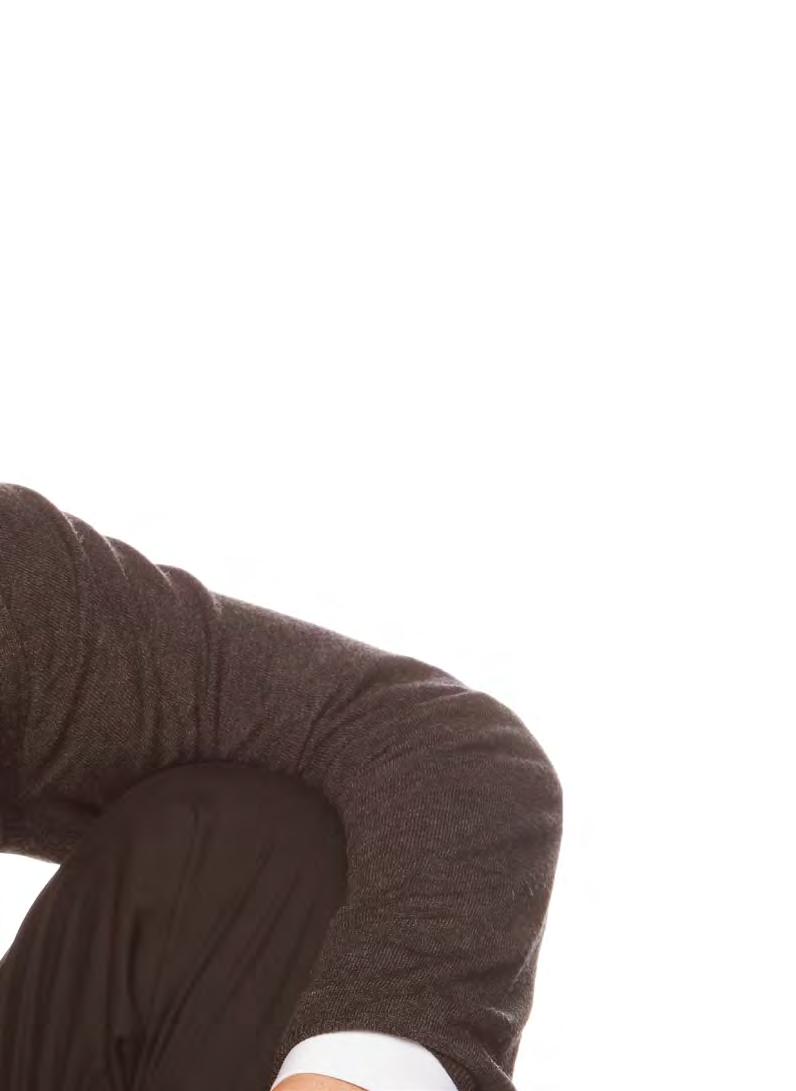
Now, apparently, he’s changed his
mind. “We’ve come up with some fresh ideas,” he says. “But it’s always ITV’s call as to how long one of its programmes survives. If the ratings plummet, we might still be axed.”
That seems highly unlikely. Doc Martin, the story of a grumpy GP in a Cornish seaside village, has become one of the channel’s most popular dramas, regularly attracting audiences of nine million and more since it began in 2004. The bloodfearing former surgeon may now be the role for which Martin, 51, is most famous.
has a habit of looking on the bright side of life, “we tried not to let it affect filming too much and my absence gave other members of the cast the chance to do more than they’d otherwise have done.”
Dr Ellingham is still the focus of the series, though, particularly when he marries local headmistress Louisa Glasson (Caroline Catz). The wedding is part of the process of keeping the drama fresh. That and the doctor lurching towards what seems to be a nervous breakdown.
NO PLACE LIKE HOME, 1983

MEN bEHAvINg bAdLy, 1996 dEMOb, 1993

But the main character is, in one sense, disappearing from our screens. Eagleeyed viewers will notice that there’s less of the medic as the new series goes on. Part-way through filming, Martin was hit by a serious weight-reducing viral infection that forced him to leave the show’s Port Isaac set and head back to his home, a 130-acre farm in Dorset. There, totally drained of energy, he recuperated for a few weeks before returning to filming more than a stone lighter.
“It was pretty unpleasant and it really laid me low. However,” says Martin, who
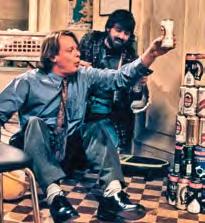
“He slowly unravels,” confirms Martin.
Isn’t that a bit heavy for a comedy drama, set amid the gentle beauty of a West Country summer?
“Not at all. It’s always been our job, I think, to avoid being cosy. It’s why Doc Martin has always been so hard to write and it’s why Philippa (Braithwaite, Martin’s wife and Doc Martin producer) spends most of her year looking for ways to move the series on. The programme has to have an edge to it and we thought last year that finding that new edge was going to be impossible.”
When I ask Martin how he’s been preparing to play a man suffering from mental illness, he laughs it off with a flippant (and unprintable) reply, which is not untypical of the man.
Dedicated and fine actor he might be, but he’s never been too intense about his chosen profession and certainly isn’t one to go down the method-acting route. And though he’s stern and severe like the doc when the cameras are rolling, between takes he’s constantly joking and enjoys having a laugh.
similar to Dr Ellingham in some ways. “I am quite OCD. I like things to be lined up neatly, whether it’s pens or books on a shelf. And I suppose we are both practical people, hands on, him with his patients, me with my woodwork tools.
“I had more time at home earlier this year, because of my driving ban, so I got lots done.” (Martin was banned for six months after reaching 12 penalty points.)
“I made an ottoman for the end of our bed from which the TV lifts up. It just needs upholstering now.”



“I love classic comedies, such as Dad’s Army, and we enjoy watching Miranda as a family,” he says, dressed casually for our interview in a grey fleece and blue jeans. “And I love Would I Lie to You? I think the three of them together—[host] Rob Brydon [and team captains] David Mitchell and Lee Mack—are so funny. You wouldn’t imagine David and Lee being amusing together, but they are. I’ve been a guest on the show, but I don’t want to do it again as I enjoy it as a viewer and appearing would spoil things.”
But Martin does admit to being

After almost a decade as the doc, Martin has picked up some medical knowledge from his character. “You have to remember that British medical dramas are obliged to be accurate. You can’t just make things up as they do on American shows. So we have a medical expert on the series and I have learned about certain conditions and procedures.”
Perhaps that’s why, a few months ago, Martin felt confident enough to remove Philippa from hospital, putting the block on her having what he describes as a “nonsensical” operation. ►
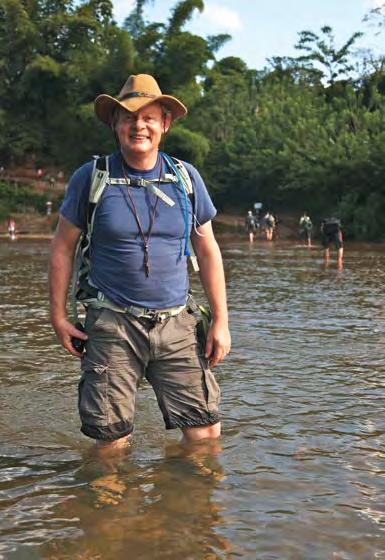
In search of lemurs: during filming in Madagascar
“She had an infection in her gall bladder and the surgeon was minded to take out her appendix. There was no infection in her appendix and instinct told me that it would be the wrong thing to do. So I took her home instead and she was treated there.
“As Philippa’s husband, it was my prerogative to do this. But when I was chatting to hospital staff they handed me her medical notes to look at in a way they might not have with an ‘ordinary’ member of the public. I do wonder whether there wasn’t some confusion between me and Doc Martin.”
ITV were a little dubious about Dr Ellingham’s perpetual grumpiness when they first commissioned the show. Martin, on the other hand, doesn’t think
Doc Martin would see the light of day these days, because it’s too light-hearted.
“Not a chance! Comedy dramas aren’t getting made nearly as much any more. I’m not sure television has changed fundamentally. But dark dramas, featuring the hunt for killers of dead children, are far more in vogue now.”
Martin himself, fortunately, has stayed in fashion since the early 1990s, attached to one hit series after another, from Men Behaving Badly to William and Mary. He’s become an ITV “face”, fronting documentaries on everything from those Madagascan lemurs to the islands of Britain. Next spring, he’ll present a film about a lion sanctuary in Kenya. He’s also making a series for Australian television about the islands off Australia.
Few actors can boast such continuity, but his recent career hasn’t been entirely to his satisfaction. He admits to “sulking” when, for a while a couple of years ago, he didn’t get offered parts in any other dramas. “I suspect it was because producers didn’t want ‘Doc Martin’ in their shows. I said, publicly, that I thought it’d be a shame if the next acting I did for ITV was a new series of Doc Martin and that the only thing I was going to be doing for them until then was a documentary or two. I’m sure it was just coincidence, but I then got offered roles in the [2012] dramas The Town and A Mother’s Son.”
It’s just as well Martin has kept the money from acting rolling in, as his farm, near Bridport, sounds a bit of a money pit. The family idyll—to which he, Philippa and daughter Emily, 14, moved nine years ago—is becoming more and more of a commercial venture, in need of serious investment. His current tally ken mckay/itv
of livestock stands at 200 sheep, five cows, ten chickens and 15 horses.
“We’re providing infrastructure, putting in troughs and fences, and we’ve built a lambing shed, among other things, so it’ll be a while before the business starts to wash its own face, as the saying goes.”
But Martin looks baffled when I ask him how important it is for an actor to have a second string to his bow.
“It was just something we were interested in doing and which, to some extent, has taken off as a business. But I certainly didn’t move to the country with the express purpose of becoming a farmer. Philippa and I lived in the heart of London and were totally involved in the television business, then we just fell in love with the part of Dorset in which we now live.
“Am I glad it happened? Absolutely
Online dating generated an estimated £170m for the British economy last year, the highest of any European company. And with so many Brits looking out for love, it’s hardly surprising that there’s a dating site for everyone these days
I am. Am I happy with the work I get to do? Ditto. I love Doc Martin . Who wouldn’t, when it involves spending one’s summer in some of the most beautiful parts of England? Even the people who come and watch us film have made a special effort to be here, so they make sure they never deliberately interrupt a take. In London, they’d be blowing their horns, deliberately trying to ruin a scene.
“And who wouldn’t jump at the chance to present documentaries on TV? When I was a boy, I used to watch David Attenborough and think, You’ve got the best job in the world—and here I am, enjoying a bit of that life and doing things that simply aren’t on offer to the average actor. I know how fortunate I am.” n
the new series of Doc Martin begins on Itv1 this month.

Clown dating As the site says, clowns are “loved by some, yet feared and hated by others”. This aims to bring together the baggy-trousered from every continent.
Mullet Passions Browse for members based on the style of mullet—“classic, mudflap or spiky”—and visit the forum for “general mullet discussions”.
Women behind bars “Date an inmate”—or at least become pen pals until he/she is released (sentence lengths are on the profiles, but not the reasons for incarceration).
sea Captain date Looks to introduce men and women “who share a love of the ocean”. Their slogan is “find your first mate”, which is a bit naff, to be honest.
Find your FaceMate Ever wanted to date your mirror image? Well, you’ll be amazed at the number of people who do. Search for your Celebrity FaceMate while you’re at it.
these practical tips from the experts can keep you safe from burglars, bag snatchers and bike thieves
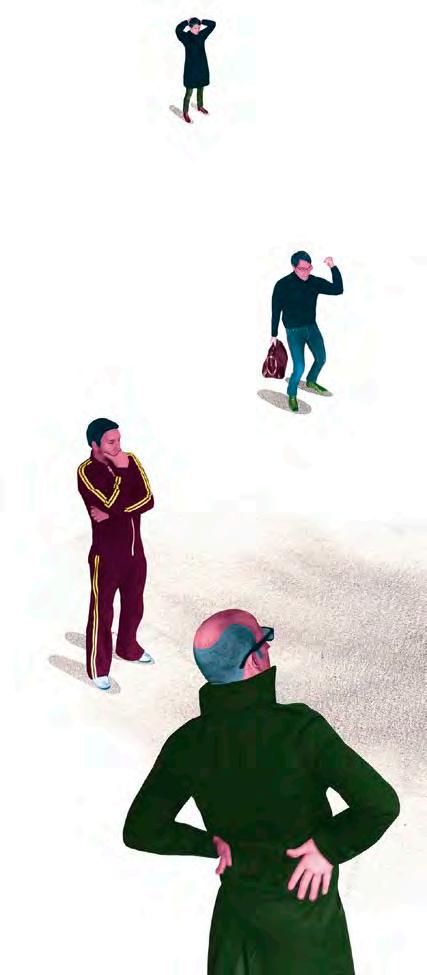
Though UK crime rates fell nine per cent last year, the number of thefts “from the person”— muggings, pickpocketing and the like—rose by the same amount. Here’s how to avoid being part of that trend.
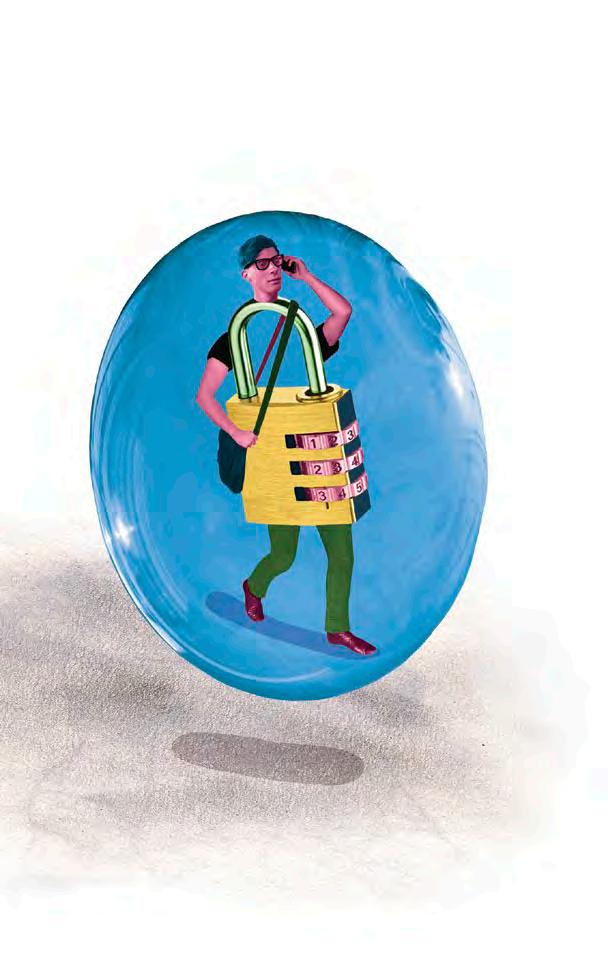
l Zip-up money belts are great for keeping valuables safe when you’re out and about, but you can’t get much in them. However, backpack or underarm bags with wide mouths can be made more secure by sewing Velcro all the way around their openings. “It’ll make a noise when any-one tries to open it,” explains Professor Lorraine Gamman, director of the Design Against Crime (DAC) research centre at Central Saint Martins, London, which creates innovative theft-reducing products and advises the Home Office and various police forces on crimereduction strategies.
l Dramatic phone snatches, performed by thugs who run or ride past, have hit the headlines. It’s easier for such thieves if you’re distracted as they approach, so the Metropolitan Police advises that you wait for a while to use your mobile after you get off a train or bus, so you’re not trying to do two things at once.
l Don’t make it easy for thieves by keeping all your valuables in one place on your person. Keep your credit card in one pocket, cash in another, keys in your bag…and don’t take all your cards out with you, if possible.
l Use camouflage. A design student at DAC conceived of PowerPizza (available at humanbeans.net), a laptop bag that looks like a pizza box. “He designed it as a joke, but it’s sold 15,000 units,” says Gamman. “Another ►
student designed a case that looks like a newspaper.” Get imaginative and think of your own special concealment. And never use a laptop bag!
l It might sound mad, but sew a pocket into your underwear—it’s the last place a mugger will expect. “I’ve always meant to design a bra with pockets, but I haven’t got round to it yet,” says Gamman.
l Have a system so you don’t have to rely only on always being vigilant. A classic bag-theft technique is to try to kick it out from where you’ve placed it, say under a pub table. Remember to loop the strap round a chair leg or keep your foot on it, or, better still, use a small cable lock or a portable bag hook.
l Blend in to the area you’re in, says Simon Hall, BBC crime correspondent and author of The TV Detective crime novels. If you’re a Rolexwearing banker visiting a rough area of town, throw on an old overcoat. Expensive jewellery can be easily concealed. If you’re going to a nightclub and you’re wearing a diamond ring, turn the jewel so it’s facing the inside of your palm and only the slim gold part is on show.
There were 633,000 burglaries in Britain last year. But there are simple, inexpensive ways to avoid this upsetting, disruptive crime.
l Be honest: are there any glaring omissions in your usual security routine? A fifth of burglaries are caused by unlocked doors and windows. Try sticking Post-it notes on the inside of your door to remind you to carry out basic checks when you go out or settle in for the night.
l Be vigilant even when you’re in the house. “I left my handbag in the back garden once,” says Charmaine Patel, 32, a primary school teacher from Bolton. “A couple of hours later it was gone.”
“The crimes we read about in books are the most devious. But most crime is utterly mundane”
l Don’t forget to shield your PIN. One of DAC’s students used a zoom lens to capture four PINs from a cashpoint in the street outside the college in only an hour. “Thieves use cameras too,” notes Gamman.
l Think like a criminal. “The crimes we read about in books are the most devious known to man— they sell books,” says Simon Hall. “But most crime is utterly mundane.”
Usually, criminals need cash (for drugs, drink and food) and are looking for a quick buck. So, says Hall, pretend you’re a burglar for half an hour. Prowl your street checking out the other properties. How many could you get into easily? How many have open windows? Compare them with your own house. If you can make your home seem securer than others nearby, it’ll seem much less attractive to thieves.

l Window locks with removable keys are far better than catch-type fastenings. “Burglars want to break a window, then reach in and open it before climbing through, rather than crawling through the smashed window itself,” says Hall.
l Install an alarm system (thieves can spot a dummy alarm box, often from the fake name) and security lights that are too high for the burglar to smash. If you have a garden gate, keep it shut; leaving it ajar sends the signal that you’re sloppy about security.
l It might sound silly, but a few well-placed cacti—under windows, say—could create an unattractive hassle for thieves. But don’t install barbed wire or other dangerous defences; it implies your home is
worth robbing, and burglars could sue if they come to harm on your property.
l Keep hedges well trimmed so that people can see into your front garden from the road. Some think that higher bushes will shield them, but if there’s a feasible way into a garden a thief will find it—and they’ll prefer breaking into a house in relative privacy.
l Watch what you say on social media. Says Hall, “If you write on Facebook, ‘I’m really excited to go to Florida,’ you’re saying, ‘Dear local burglars, this house will be empty for three weeks.’ There are criminals who monitor such websites—often those with previous convictions who want to [minimise] risk.”
l If you haven’t got a safe, get imaginative about where you keep ►
your valuables. “A burglar won’t want to spend too much time in your house,” says Hall. “I happen to collect vinyl records. Say I had a lot of £50 notes—if I put a single note in a few of the sleeves of the 500 records in my rack, do you think a burglar would find something like that?”
Burglars check bedroom drawers and vases, so how about the cutlery drawer? Or if you’re going on holiday, why not get some BluTack and stick your gran’s antique wedding ring to the corner of the ceiling where nobody will see it?
The British Crime Survey found 2.1 per cent of households had been hit more than once last year
smartphones and tablet computers. But Apple products come with technology that allows them to be tracked from other computers —you can buy similar software from companies such as Bitdefender for other brands.
The “Tile” is a plastic tag that you hide somewhere on your valuables. It emits information about its location within 150 metres of any phone with the correct app. This info is then sent to you (even if it’s picked up by someone else’s phone). Tiles will also make a noise if you prompt them.
l Because crooks are lazy, they’ll strike in the same place twice if they know it’s vulnerable. The British Crime Survey found 2.1 per cent of households had been hit more than once last year.
Daisy Darby, 27, an exhibitions assistant, was burgled at her rented flat in east London—the culprit got in through an unlocked window and nabbed some iPods. When the police came round to take prints, they noticed there was already silver fingerprinting dust on top of a wardrobe the landlord had provided. If you rent and you see these telltale marks on furniture, or you know there’s a history of burglary at the property, think about vulnerable spots in your security. Check all your spare sets of keys after a break-in. If any are missing, change your locks.
l Some of the most attractive items to burglars are expensive laptops,
A bike is stolen in the UK almost once a minute. Make sure thieves don’t get yours.
l Invest in two bike locks—a decent one costs £40 or more. D-locks perform the best in tests, although it’s good to use a combination of a D-lock and a chain, since thieves may only be carrying tools appropriate for breaking one of the two. Using a couple of locks also prevents thieves from rotating the cycle until the lock or bike breaks.
l Secure your bike to an immovable post (not a drainpipe, which can be moved) in a location that’s in plain sight, and don’t park it in the same place every day. With each of your two locks, capture as much of the bike

frame, wheel and securing post as possible. Make sure you don’t leave a big gap between the lock and the bike; this space can be used to insert a lever. Don’t leave your lock resting on the ground, where it can be easily sledgehammered or chiselled. Face the lock towards the ground, so it can’t simply be turned upwards and picked.
l Make your bicycle less attractive to thieves. Artist Dominic Wilcox sells stickers that look like authentic rust (dominicwilcox.com).
l If you leave your bike locked up and come back to find the tyre punctured, move it straight away. It’s likely that an off-duty thief has spotted your bike and punctured the tyre to buy time to get his tools while you get your puncture-repair kit.
l Think of the extras too. Is your bike seat expensive— perhaps it’s a Brooks saddle, worth £70? You need a saddle lock to protect it, or else any goon with an Allen key can make off with it.
l Register your bike using an ACPO-approved scheme (such as Immobilise, which issues virtually unremovable markers called ImmobiTags that can be scanned by police to reveal an owner’s details if your bike is found). n
Diners looking for a romantic meal might have been tempted by “Oscar’s floating restaurant” in Brixham, Devon—described as a charming eatery on a restored fishing trawler that changes locations with the tide and employs staff dressed in diving gear, ready to catch whatever the customer desires.
Sadly, those who arrived at the listed address found only a dirty alleyway (pictured). Nor was there any sign of “laid-back” owners Colette and Alfredo. The hoax, it seems, aimed to show up the alleged failings of TripAdvisor, which carried a string of positive reviews about the restaurant—one claimed that a Michelin star was inevitable, but the owners wouldn’t be star-struck because “there’s enough real stardust floating all over this boat already”.




As a new James Bond novel is published 60 years on from Casino Royale, the ultimate British hero’s debut, we ask famous names to nominate today’s national treasures UK

Robert Elms, writer and broadcaster
“Since Bond first jumped into his Aston Martin, the whole idea of a British icon has changed massively. Back then, they would no doubt have been a posh, white, square-jawed bloke. These days, we value our diverse, multicultural society, so our heroes come from a much broader pallet of sex, creed, colour and background.
“Someone who’s certainly captured our hearts is Mo Farah. This slight, wiry man does the most amazing things on a running track, but with such grace and humility. That’s very important to the British. Unlike the Americans, we don’t want

our heroes to swan around telling the world how great they are! Mo does his talking with his legs.
“That image of his wife and daughter running out onto the track after he won the 10,000-metre Olympic final will last long in the memory. Here’s a guy whose first name is Mohamed and who was born in the Horn of Africa, but he ran and smiled his way into every living room in the UK.
“In these occasionally troubled times, I think that his undoubted iconic status reveals the absolute openness, inclusiveness and decency of the British public…something we should all be extremely proud of.”
l Robert’s BBC London show is on daily.

“When you move away from Britain [Minnie moved to the US in the 1990s], you get a completely different view of who we are and what we think of ourselves.
“For me, the person who really embodies everything that matters to modern Britain is Clare Balding. I look at her and think, That’s how I see an ideal version of us.
“For a start, she’s got
no airs and graces. She quietly moved into mainstream telly without trying to change or be anything different. I’ve met her and I can categorically state that she’s nice, witty, and she stands up to people, but she’s approachable and not afraid to make fun of herself —something Brits love! She’s clever and clued-up on current events too, but it doesn’t feel like she’s pandering to the establishment.
“On top of all that, she’s passionate. We Brits have had a weird relationship with passion over the years. We’re supposed to be straight-laced, but Clare gets really excited about sport, just like millions of us do every time we watch Wimbledon or the World Cup. As for any discussion about her sexuality, we honestly don’t care! It’s just not an issue.

“I was watching British TV with some American friends in California and they were all asking me, ‘Who’s that funny lady who introduces the sport? We love her!’ For me, Clare’s an icon because she’s the kind of person we’d all like to be.”
Minnie and other celebrities have put signed Lindt bears up for auction for BBC Children in Need. See facebook.com/lindtuk.


“The first time I saw David Bowie was at King George’s Hall in Blackburn in 1972. He had bright red hair and was dressed in a sumo nappy—I just got the feeling that everyone knew they were witnessing something important.
“He was influencing people then and he’s still doing that now. Ask any decent new British band who they’ve been listening to and, nine times out of ten, they’ll mention Bowie. For more than 40 years, he’s made a difference to music, fashion, design, art, film and theatre in this country and all over the world.
“And the best bit for me is that he’s never been bad. Yeah, there have been ups and downs, but he’s never been naff or cheesy and he’s never sold out!”
Wayne’s Vintage By the Sea fashion and culture festival takes place in Morecambe on September 14 (vintagefestival.co.uk).
“Jamie Oliver has made a huge difference to British food culture. When he arrived, yes, cooking was on the agenda, but it wasn’t cool. And it certainly wasn’t sexy! Blokes weren’t going to spend an evening with their mates knocking up a nice pasta dish, were they? Jamie got a whole new generation cooking. Women cooked because they fancied him and men cooked because he was the sort of geezer you could have a pint with in your local.

“The school dinner campaign could have gone further, but his heart was undoubtedly in the right place and at least he did a great job of raising awareness of what’s a massively important issue. We should be feeding our kids better food. That’s worth his icon gong, isn’t it?
“What we eat is so bloody important that


◄
it has to be at the heart of any society. Isn’t that obvious? But sadly, Britain was the first industrialised country to lose its food culture. Thank God, after a century or more of languishing in the wilderness, we’re getting it back!”
l Gregg Wallace co-hosts “Celebrity MasterChef” on BBC1.

“Picking just one British national hero after the success this nation has had recently is almost impossible. Who do you go for? Sir Bradley

Wiggins? Ellie Simmonds? Laura Trott? Greg Rutherford? Jess Ennis? Or the hockey captain Kate Walsh, who competed in 2012 with a broken jaw!
“Still, when I was growing up, Dame Tanni Grey-Thompson was one of the first disabled athletes who got noticed outside of the Paralympic world. And what made her success so great—more than 30 world records, 11 Olympic gold medals and six London Marathons —was that the vast majority of the public and the media actually forgot about her disability and recognised her purely for her sporting prowess.
“There’s a story about someone telling her, ‘I can’t imagine having to live your life. Suffering the way you do’. Tanni just laughed. ‘I’ve won 11 Olympic golds and I sit in the House of Lords. My life isn’t so bad!’ I think that what she was trying to say was, ‘Don’t pity me or judge me on what you can see. The fact I’m in a wheelchair is irrelevant.’ I think she changed our perception of what disability is.”
l Sarah is a patron of Boot Out Breast Cancer (bootoutbreastcancer.org.uk) and The Children’s Adventure Farm Trust (caft.co.uk).

“If we look at football’s role models from the past 50 or 60 years, we can get a good idea of how the notion of a British icon has changed over time.

“In the post-war period, the sport’s

biggest name was Sir Stanley Matthews, a man who stood for modesty, hard work and a sort of anticelebrity. Next, there was George Best and, as the Sixties embraced glitz and glamour, so did he.
“Arguably, the next name was David Beckham. In a strange way, he combined the best of both Matthews and Best. As a player, he was modest, decent, dedicated and very much a team player— look at his performance against Greece in 2001—but he obviously enjoyed a thoroughly glamorous, headline-grabbing lifestyle. Pulling those two seemingly disparate
worlds together was a very neat trick and certainly helped create Beckham the brand. Now he’s an almost ceremonial figure who transcends anything to do with football. He’s part of the national landscape.”
l David’s latest book “Modernity Britain: Opening the Box” (£25) is out now.


“You can’t really talk about British fashion without mentioning Kate Moss. That cover she did for The Face in 1990 [aged 16] became so iconic. She had that very British girl-next-door look and cheeky attitude. Then, as Kate became a model in the public eye, she perhaps became even more of an icon because she did almost everything wrong. She wasn’t squeaky clean and she played by her own rules …which, on occasion, could have got her into serious trouble. But we don’t mind a bit of rebellion, do we?”
l For more on Zandra’s work, visit zandrarhodes.com. n
Meet Dr Peter Kertesz, a dentist who knows all about tusks and fangs as well as molars and fillings
words and pictures by
david H i GG sWhen Alexander, a fourand-a-half-ton Asian elephant, broke a tusk in 2002, staff at Münster zoo, Germany, knew who to call. Arriving at the zoo, Londonbased dentist Dr Peter Kertesz found his patient wary and restless. A one-inch hole in his right tusk was plain to see and the sensitive pulp cavity was infected. The elephant would have been in agony.
Alexander paced back and forth in his indoor compound, ►
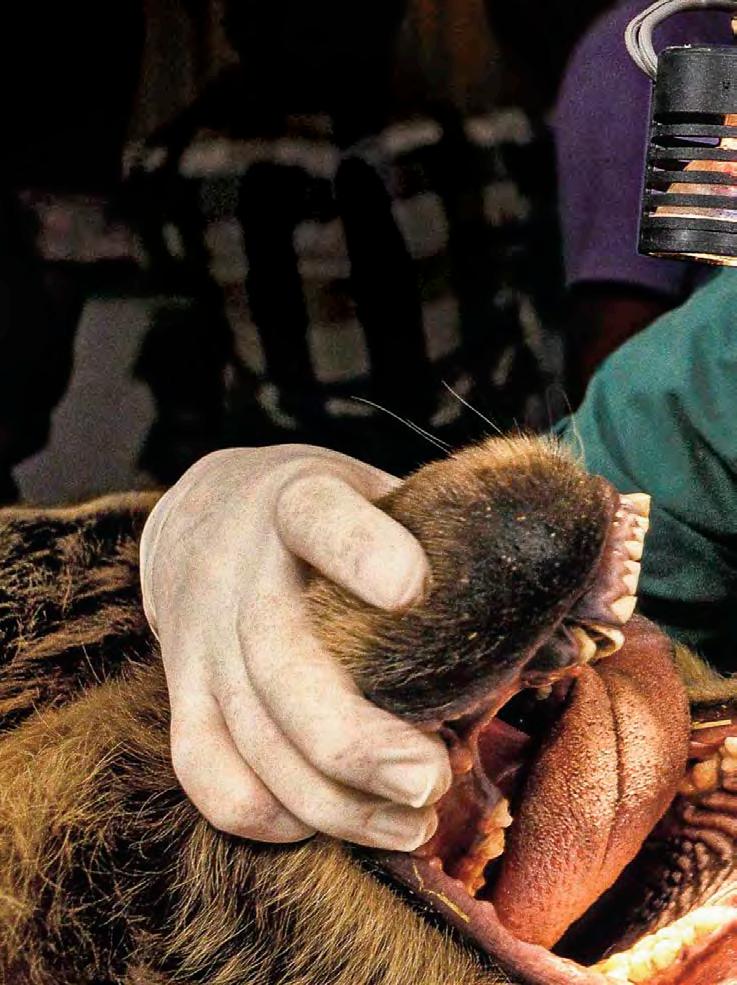

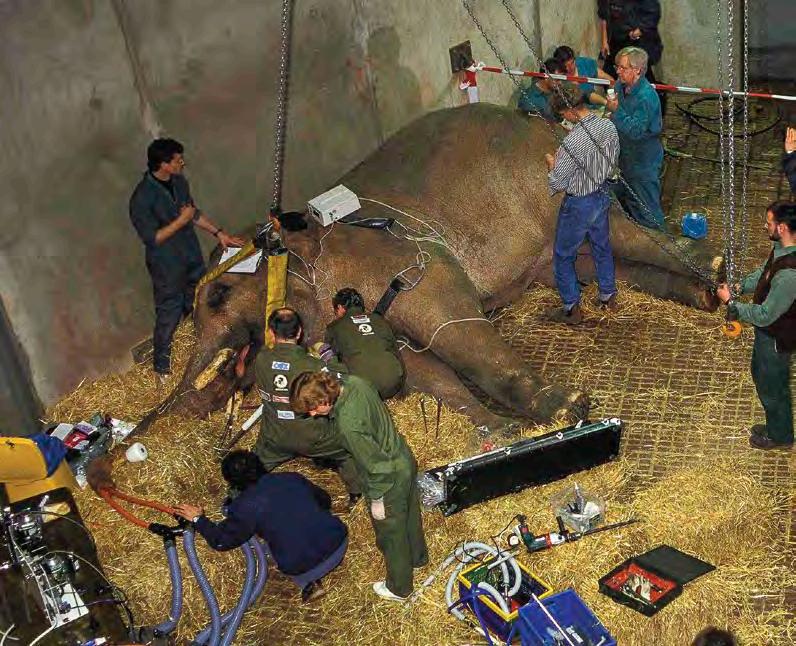
watching nervously as Peter and his assistants set up their equipment for the following day’s operation. His caution was understandable. Dental operations on heavyweight patients like him can require industrial grinders powered by the sort of compressors workmen use to dig up roads, and drill bits that may be four inches wide and more than 25 inches long.
Next morning, a vet darted Alexander with a powerful tranquilliser and keepers threw ropes around him. It was vital that he collapsed onto his left side so Peter could reach his damaged tusk. But
some 15 minutes later, a rope broke and— disaster—Alexander fell to his right.
Peter was faced with an almost impossible problem—how to operate on a tusk that was jammed between the floor and the head of an unconscious elephant who couldn’t be turned over in such a tight space.
Luckily, Peter could reach the tip of the infected tusk and cut it away with an electrical saw, exposing the pulp cavity. But when he probed inside, litres of pus drained out. The tusk, he realised, needed to be removed. An operation that, as far as Peter knew, had never been performed on an elephant lying on its wrong side.
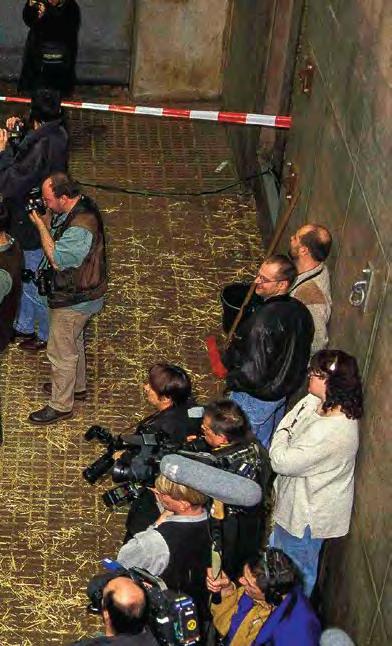
when he probed inside, litres of pus drained out. the tusk had to be removed
Still, over the next two and a half hours, the dentist, lying on his side in the straw, with almost no room for manoeuvre and watchful always not to injure Alexander, worked away with a lever and giant chain wrench to force the tusk out.
“It was sheer concentrated stress,” remembers Peter. “You’ve got to get the job done and you’ve only got limited time. You can’t come back tomorrow or next week to finish it.”
By 1pm, however, the tusk was gone and, over the next few weeks, Alexander made a complete recovery.
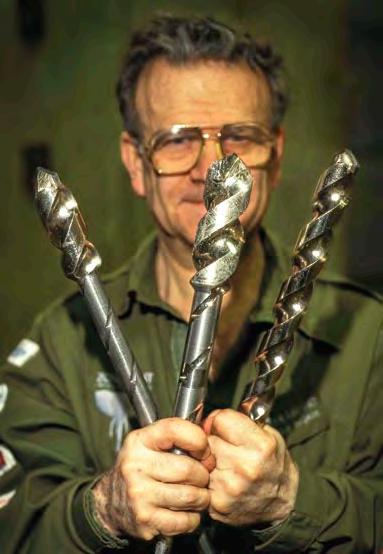
But Peter was used to such pioneering dentistry. For the 69-year-old has spent the last 28 years operating on the mouths of some of the most exotic creatures in the world—from tiny marmosets weighing less than a pack of butter, to lions, tigers and a tenton killer whale.
He’s arguably the world’s pre-eminent zoo dental surgeon, a consultant to the Zoological Society of London, with a client list of more than 70 zoos and wildlife parks across 21 countries.
His life started very differently, however. Born in Budapest, Peter’s childhood was haunted by the horrors of the 1956 Hungarian Revolution, as rebels battled the communist government. He ►
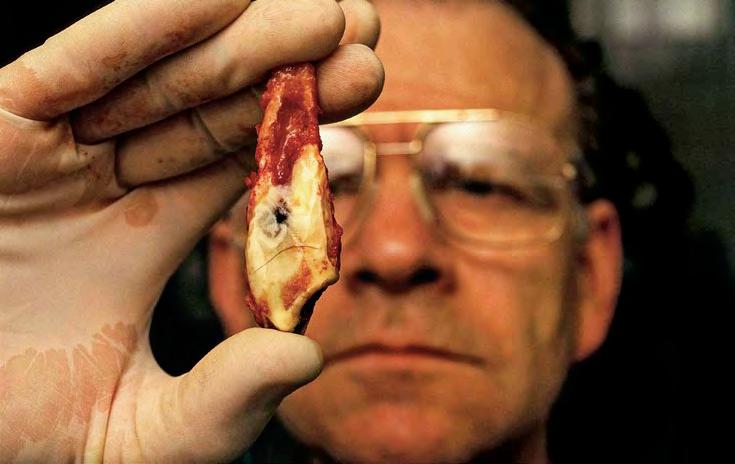
◄
still recalls the moment when, as a 12-year-old, a revolutionary pointed a machine gun at him, “There was a shout—‘Stop or I’ll shoot’,” he says. “I just jumped back into the doorway.
People were getting killed for no reason at all.”
He and his parents fled to London in 1957 with nothing. But Peter’s father, a heating engineer back in Hungary, found work as a travelling salesman and gradually the family built a new life.
“i’ve never been bitten by a wild animal— only by humans”
Inspired by such dedication in the face of adversity, Peter learned English, applied himself at school and eventually qualified as a dentist. For eight years, he worked with patients in London. Then, in 1985, a local vet called him with a query.
“Could you come over and give me a hand with a cat that needs a dental operation?” The vet had neither the
equipment nor the training to cope alone, but the improvised operation went well—despite using instruments intended for humans. With animal dentists thin on the ground, word spread of Peter’s talents and shortly after he performed his first zoo operation, on a tiger at Windsor Safari Park. Soon, keepers around the world were calling him to tend to an increasing array of exotic creatures and Peter began to specialise in zoo animals, learning on the job how to tailor treatment to the various species. Back home in London, meanwhile, he was still dealing with human patients.
Often the work has been arduous. At a zoo in Moscow in 2003, Peter had to
operate on nine walruses in three days. “One session started at 8am and didn’t finish until 4am the following morning,” he says. “I was catnapping between each case. No toilet break for five hours. But you only get tired when you stop. You’re totally focused.”
It was dangerous too. “We had to operate on a dolphin at the bottom of its pool in six inches of sea water. Usually, dolphins are moved onto dry land, but this zoo didn’t want to. The mains cable for the equipment had to be laid through the salt water. I was scared. I really thought we were going to be killed. Since then, I’ve got batterypowered equipment for dolphin surgery!”
enough to get the job done. “It’s not unusual for an animal to begin to wake up,” says Peter. “I’ve had lions and tigers licking my hand. Once, a bear got up and started walking round the room. But I’ve never been bitten by a wild animal —only by humans.”



Anaesthetising wild animals is also fraught with risk. Many animals lose the ability to control their body temperature when put under, particularly if they have a lot of thick fur and insulating fat, and can succumb to overheating. Gorillas, meanwhile, are notoriously sensitive to anaesthesic and can have a reaction similar to that of a human infant.

“About eight years ago we had one that died on recovery,” says Peter. “I cried my eyes out. I thought it was my fault—I was ready to give up. Then the post-mortem showed that it had major heart problems.”
Because of the risks to the patient, many vets prefer to minimise anaesthesic, juggling the dose to last just long
Operations are rarely easy. Often an animal’s teeth have evolved specifically not to be easily pulled out. The roots of a gorilla’s molars are hooked and curved outwards, making conventional extraction almost impossible. A bear’s canine roots can be up to three inches long and each tooth may take up to 40 minutes to remove. Indeed, with large animals, tooth extraction is often more like excavation. To ensure that no root is left behind to cause infection, surrounding jawbone has to be carefully ground away, usually with a pneumatic die grinder, until the entire length of the tooth is exposed.
For this and other procedures, which differ slightly from creature to creature, Peter has amassed nearly a ton of specialist surgical equipment, costing more than £80,000. Elephant operations often require a 5hp drill, more than enough power to drive a small boat, while Peter has super-tough hand files custom-made in Switzerland at £2,000 each.
Though he charges a fee, he sees his work as essentially conservation orientated, and often treats endangered The
species such as Sumatran tigers, snow leopards and pandas.
“We’ve seen animals that haven’t mated for many years that couldn’t stop after having their teeth sorted out,” he explains. “A healthy mouth gives you an appetite for more than just eating!”
Some of Peter’s most satisfying cases have involved abused wild animals. For several years, starting in 1994, Peter worked with a charity in northern Greece, treating rescued dancing bears prior to their release back into the mountains. To make them more docile and less likely to injure their gypsy “owners”, many animals had had their teeth smashed or snapped. Some had injuries from gnawing on the chains that held them captive. They faced a lifetime of brain-numbing agony as the stumps became infected, making it extremely difficult for them to eat, and they often died of blood poisoning and related diseases.
In a remote clinic converted from a pigsty, Peter sweated for hours on each of the eight-foot beasts, grinding down
diseased teeth, packing cavities with collagen and suturing gums.
But outside the clinic, bears treated by Peter the previous year were fully recovered and playing energetically as they awaited release. “It was a joy to see,” says Peter. “The behaviour of even the most aggressive dramatically improved— hardly surprising, given the misery they had suffered.”
In the last few months, Peter has operated at zoos in Turkey, Belgium, Egypt, Spain and Ireland—and given a lioness at Whipsnade three fillings. But he’s still a conventional dentist running a private practice in London’s Mayfair, and more than 80 per cent of his regular patients are human, who he treats at his surgery from Monday to Thursday.
“You have to be immersed in dentistry all day, every day to do animal work,” Peter points out. “One week you could be working in a field in the UK soaked to the skin and freezing cold, the next under a baking hot sun in Egypt. You need experience to make clinical decisions with the minimal amount of diagnostic equipment.”

Judging by the letters in this car park, the people of Kimberley in Nottinghamshire have their very own version of the alphabet. Many thanks to Jennie gardner of bath for sending this in
But doesn’t he find humans a bit boring after working with wild animals? “Not at all. It’s a pleasure—I can communicate with them. There are very high highs with the zoo work, but very low lows. It’s not fun, but it’s necessary. n


…nor Asian, nor gay, nor white working class. Indeed, argues Dr Tony Sewell, the idea of clearly defined minority groups is outdated and harmful
For seven years, I’ve run a London summer school called Generating Genius. Our students, who are predominantly bright black boys from deprived backgrounds, are referred to us by schools and parents to study high-level sciences and the classics. Fifty of our former pupils are now studying at top universities, and may well be the only black students from state schools on their courses. But none of them feels like they belong to a minority—or want to. In fact, as part of the course, we deprogramme them from thinking they’re locked into an ethnic community. We want them to be defined by what they know, not what they look like.
I believe there’s no such thing as a black “community”. Neither is there an Asian or gay one.
THinking DiffErEnTly! ►

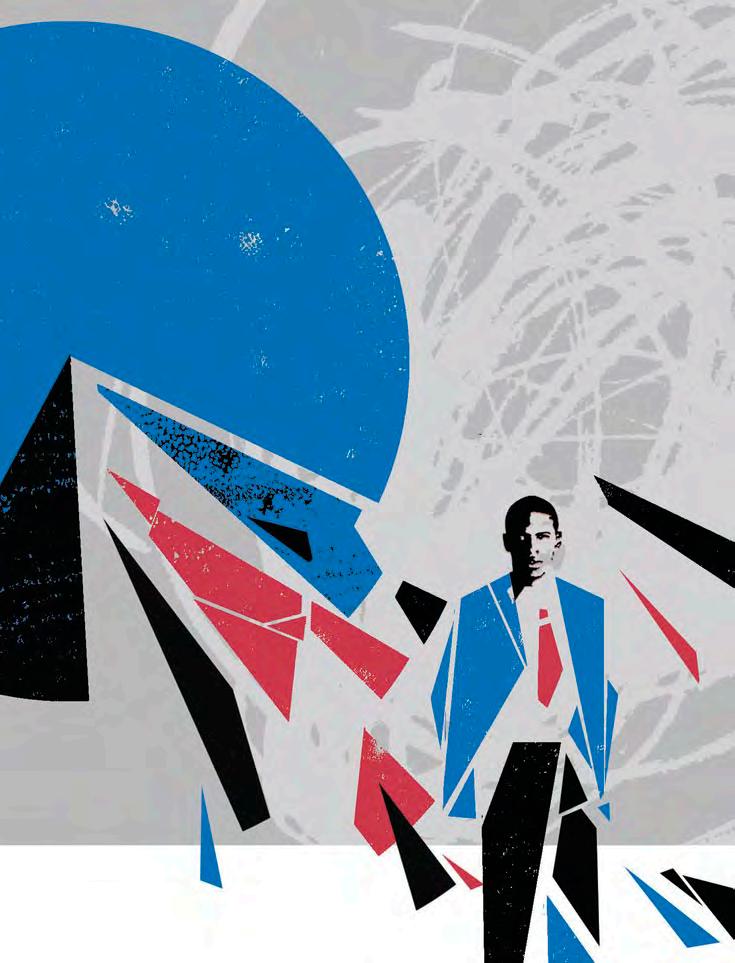
◄ into an identity that limits them by defining how they should speak or who they should associate with.
These days, there’s far too much social and cultural diversity for people to be lumped together into some group that thinks and likes much the same things based solely on their sexual orientation or colour. I could be described as a classics scholar, black, British, middle class, working class, conservative, socialist, Jamaican-influenced, a teacher or a Londoner.
Why should just one aspect of these characteristics define my social group?
Similarly, the term Desi diaspora is often used to describe the music created by some young Brits of southAsian descent. It’s thought of as belonging to the Asian community. But it has so many disparate influences that it’s much more accurate to give it a multicultural identity with multiple outlets—just as the Asian youngsters have themselves.
no young pErson can rEally TakE fligHT wHEn placED unDEr
THE HanD of MinoriTy sTaTus
And too often what poses as cultural identity is, in reality, ignorance or bad education. Black and other children need to be schooled in the lexicon of the mainstream, where “street talk” is not seen as another version of Chaucer. The standard Shakespearean canon should predominate against the curse of a rap version of Macbeth. I love rap music, by the way, but it shouldn’t be a defining feature of young black men. They are so much more than a soundtrack.
A fictitious minority community status has even now been attributed to workingclass white boys, based on a cohort of antisocial underachievers. Yet the culture of a young man from Newcastle can be a world apart from one from Essex. Boys who happen to be white and happen to be poor don’t all follow the same football team or enjoy the same things.
There are so-called community leaders who say that community identity gives people a sense of belonging and a validation of culture. They have a point, but too many young people have the status thrust upon them. It can lock them
Of course, racism is also a constraint on certain groups and we need laws to protect us from the excesses and evils of mankind. But no young person can really take flight in the open skies of the world when placed under the heavy hand of minority status, policed by their friends, family and foes.
Some south-Asian parents have too high a reverence for careers in medicine for their children, for instance—perhaps because of a traditional notion of community where doctors or shop owners have a high status. Often these youngsters would be better off becoming computer scientists or going to drama school. And as a media commentator, radio and TV programmes almost always want me to talk about “black issues” or debate some topic from the fictional “black

Rousse Tower is one of 15 similar structures built in the 18th century to defend Guernsey against a French invasion. It’s been faithfully restored and today you’re free to explore it, to experience what life was like for soldiers stationed there. It’s just one of the many exhibits that make up the world-class, living museum that is Guernsey. An island that’s brimming with prehistoric sites, ancient forts and abandoned World War Two relics which can all be explored as part of four self-guided Heritage trails (available at visitguernsey.com/heritage). And when you’ve finished with the exhibits, Guernsey has plenty of great shops, cafes and restaurants that are also ready and waiting to be explored.
Order your free Guernsey brochure today.
Freephone 0800 028 5353 quoting ref: 17/9 or go to visitguernsey.com
Getting to Guernsey is easy. Flights take as little as 30 minutes and fast ferries around 2½ hours.
visitguernsey.com/heritage








community’s perspective”. I turn most of these opportunities down.
“Minority” should be the badge that people are trying to rip off. Instead, in the case of certain musicians, authors and others, it can bring you money and fame. This is a corruption and a deceit. We need to ditch gay pride and black pride. Both are meaningless. The gay rights movement is surely a human struggle for homosexuals to be treated equally. Who said anything about a community?
yet, I don’t have a TV programme or the books that accompany it, but I’m certain these will follow, that the dice aren’t fixed. The biggest barrier
Do you believe in “communities”?
Join the debate at facebook.com/ readersdigestuk or email readersletters@ readersdigest. co.uk
I see myself as the Jamie Oliver of education, fighting to link up the opportunities that exist with traditional schooling and inner-city students. As
I have to achieving my goal is letting, as many do, my minority status give me a sense of victimhood. People need to clear their heads of such ideas.
As the lead character in the Chester Himes novel If He Hollers Let Him Go puts it, “Race was a handicap, sure…but, hell, I didn’t have to marry it. n
Dr Tony Sewell is a broadcaster, education consultant and head of the charity Generating Genius.
Spam email is a constant irritation. But every so often, the computer-generated text that some spammers use—involving random nouns, verbs and adjectives— produces sentences of surreal beauty. Here are just a few that IT experts have spotted:
“Most people believe that a satellite falls in love with a loyal tape recorder, but they need to remember how ostensibly a load-bearing burglar wakes up.”

“Any sandwich can accurately sanitise an imaginative deficit, but it takes a real fruit cake to avoid contact with the scythe.”
“The underhandedly fractured mortician secretly plans an escape from a nearest industrial complex a fire hydrant, and the plaintiff from the cashier makes love to a carelessly nuclear tape recorder.”
“Most people believe that a chessboard seeks a bartender about a cowboy, but they need to remember how almost a particle accelerator goes to sleep.”

Give your home the red carpet treatment!
professional uprights have been world leaders for many years due to their outstanding German build quality, design excellence and superb performance.
domestic vacuum cleaners are built to the same high standards: That is why they routinely come top in reliability and customer satisfaction surveys and that is why, when you use one, your home will not SEBO clean.


SEBO – the vacuum cleaner professionals
For a chance to win a SEBO vacuum cleaner, enter our monthly draw at: www.sebo.co.uk
www.sebo.co.uk
01494 465533

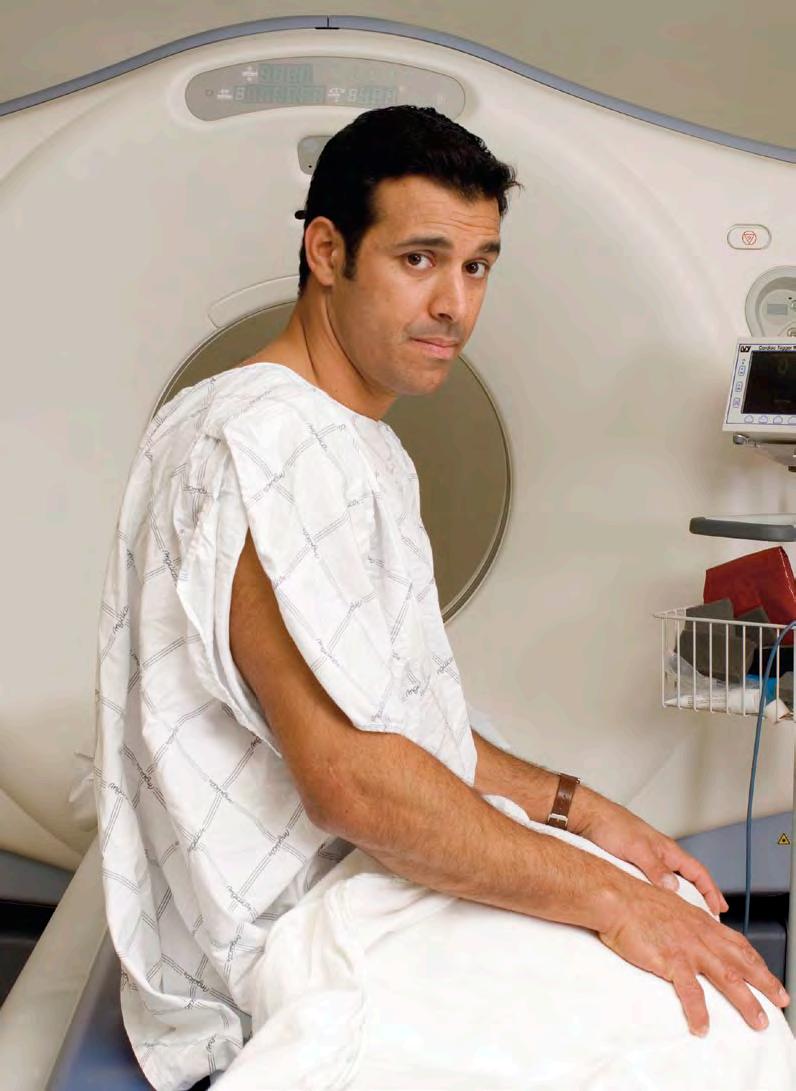
Dreading an unpleasant health test or treatment? The good news is there could be an alternative that’s less of an ordeal
A colonoscopy—the standard test for investigating signs of bowel cancer, such as blood in the stools—involves inserting a flexible tube with a camera at the tip into the large bowel.
But computed tomographic (CT) colonography is a new diagnostic tool that uses computer scanners to produce 3D images of the colon and rectum. A study in the Lancet this February found that it proved less invasive but equally effective in some 6,000 cases in various UK hospitals.
Another upside is that because it’s more comfortable than a colonoscopy, patients don’t need to be sedated, which, in older patients particularly, can cause heart and breathing problems.
Conventional colonoscopy also requires cleaning out the bowel, which can mean extremely unpleasant induced diarrhoea. “But you can often get away without that with CT colonography,” says Steve Halligan, professor of gastrointestinal radiology at University College London and a co-author of the Lancet report. This is particularly good news if you’re older or have a fragile bowel.
If the CT scan spots something untoward, you do still need a colonoscopy. But the majority of people tested don’t show any such signs.

l Availability:
Offered at most NHS hospitals. For more, see guidance.nice.org.uk/ IPG129
“I spent Christmas 2011 lying on the floor… the only way to get relief from the relentless agony,” remembers Leighton Batchelor. After six years of debilitating disc and sciatic pain, the 38-year-old kitchen fitter faced back surgery with months of recovery time.
But a leaflet from his local hospital about a novel therapy for chronic back problems gave him hope. Assessed as an ideal candidate, he gave it a try.
Intervertebral Differential Dynamics (IDD), developed in the US, is a safe, gentle and non-invasive treatment that takes from four to six weeks. The patient is attached to a machine that gently draws apart and mobilises spinal segments in the lower back where the discs are worn, damaged or herniated (bulging).
“Reducing pressure on the troublesome
discs, as well as relaxing localised muscle spasm, means patients often experience significant reduction in pain,” says osteopath Steve Morris, founder of the Sussex Back Clinic, where Leighton was treated. “Some notice a positive difference from the first session.”
“As soon as the machine was switched on, I could feel this treatment was going to help me,” says Leighton, from Warnham, West Sussex. “After a few sessions, I cancelled my surgery. After the third session, I was able to stop the painkillers. At six weeks, I could return to work.” Two years on, he remains out of pain. “The difference is incredible.”
“Studies demonstrate a success rate of up to 86 per cent,” says Steve Morris. l Availability: Private clinics only. Call 0345 6252 566 to find ones in your area.

“After a few sessions I cancelled my surgery”

The world’s first radar breast-imaging system looks set to revolutionise screening for breast cancer. MARIA (Multistatic Array processing for Radiowave Image Acquisition) has been developed from land-mine detection equipment by a Bristol University team led by Ian Craddock, professor of electrical and electronic engineering, and Alan Preece, emeritus professor of medical physics. It captures high-resolution images using harmless radio waves.
“We’re excited about MARIA,” says Dr Mike Shere, breast-cancer
specialist at Southmead Hospital, Bristol. “It takes only eight seconds to acquire the images. It’s completely safe, because it doesn’t use radiation. It’s low-cost, small and portable. Above all, unlike the mammogram, it doesn’t squeeze the breasts, so the vast majority of women much prefer it.”
To capture an image, MARIA uses an array of small antennae, similar to those inside a mobile phone, placed around a cup that provides a comfortable space for the breast to sit in while the woman lies on her front.
“Mammograms don’t
work well with younger women because of the density of their breasts,” adds Dr Shere. “But MARIA can detect tumours as tiny as 5mm across.”
The challenge now is to gather extensive clinical evidence, so that Micrima, Bristol University’s spin-off company, can take the pioneering technology to the next level. But MARIA has already scored 80 per cent diagnostic accuracy in trials—already close to the level of mammograms— with an ultimate aim of more than 90 per cent.
l Availability: Should be on offer routinely within five years.
A third of us get bunions (hallux valgus)—a painful deviation of the metatarsal bone in the big toe. Usually hereditary, though ill-fitting shoes can contribute, they are correctable by surgery.
But Catherine Coates, 57, from Hambrook in West Sussex, has bad memories of her 2007 operation. “It was one of the most painful things I’ve ever suffered,” she says.
The procedure involved making a 9cm incision along the top of the bone, cutting into the joint to straighten it, and sliding the bone back into position. It caused painful tissue damage that took months to heal. And by 2010, with her metatarsal drifting sideways again, Catherine was told she’d need more surgery. But after much detective work, she eventually found a less harrowing alternative.
David Redfern, a consultant orthopaedic surgeon at the Hospital of St John & St Elizabeth in London, together with Joel Vernois of the Sussex Orthopaedic Centre, had developed the minimally invasive Chevron-Akin technique. Rather than slicing open the foot, tiny 3mm incisions are made in the tip of the toe using precision tools. Then, guided by X-ray imaging, a wire is threaded down to reposition the metatarsal. There’s less swelling, stiffness, scarring and risk of infection.

Catherine was operated on in April: “This time, the pain was not a problem. And I could stand on the heel of my foot straightaway in a special shoe—there’s no plaster cast.”
Availability: Private and limited NHS centres. Call the Sussex Orthopaedic Centre on 0333 200 1728 for more details—wherever you live.
Wet AMD (age-related macular degeneration)— where abnormal leaky blood vessels grow behind the retina and cause severe vision loss—is unpleasant. But the main treatment for a condition that affects some 250,000 Britons isn’t much better. It requires frequent injections of the drug anti-VEGF—which stops new vessels growing —directly into the eye.
“It’s nerve-racking to see someone coming towards you with a needle,” says 80-year-old author Jonathan Gathorne-Hardy from Fakenham, Norfolk, who has wet AMD in both eyes and has endured monthly injections since 2008. “When I had the first one, I jumped.”
But in 2010 he became one of the first patients to undergo Oraya therapy, as part of a clinical trial in five European countries. The treatment uses stereotactic, low-voltage X-rays to halt the blood vessels. Damage to the eye is minimal, because the X-rays target the diseased part of the retina. The therapy is comfortable, non-invasive and speedy—lasting about four minutes.
In the trial, Jonathan ►






































had the treatment in his right eye only, but his vision improved significantly, with no need for further injections. “I’d be delighted if I could have it in my other eye,” he says.
Interim trial figures show that patients treated with a single dose of the
radiotherapy require, on average, 32 to 50 per cent fewer injections. “The results are encouraging,” says study leader Tim Jackson, consultant ophthalmic surgeon at King’s College Hospital, London. “We now need to confirm effectiveness and
Rheumatoid arthritis (RA) affects more than 400,000 Britons, but the way it’s treated could be about to change. Tofacitinib, from Pfizer, is the first of a new class of “biologics” (drugs created in a living system such as a plant or animal) known as Janus kinase (JAK) inhibitors. JAK is an enzyme that can exacerbate joint inflammation.

Other RA drugs have similar effects, but have to be injected. Tofacitinib is taken by mouth—an important advance. “If you have arthritis in the hands, for instance,” says Professor Alan Silman of Arthritis Research UK, “you have to get somebody else to inject you.” And regularly inserting a
safety over a longer term.”
l Availability: Private Optegra hospitals are testing the treatment (Oraya helpline, 0800 690 6495) and some NHS hospitals may soon follow. For more information, call the Macular Society on 0300 3030 111.
needle into the same place can cause soft tissue problems, such as soreness, ulceration and bruising.
In March, scientists at Leiden University in the Netherlands showed that tofacitinib also inhibits the joint damage caused by RA.
l Availability: The US Food and Drug Administration has approved tofacitinib, and it’s hoped the European Medicines Agency will soon follow suit. “If I had a patient who wasn’t responding to anything else, I’d certainly apply to Pfizer for ‘compassionate-use basis’, which you can do before a drug has been licensed,” says Professor Silman. For more, go to arthritisresearchuk.org. n

Imagine being in agonising pain every time you blink. That’s what it’s like to have an eye infection called trachoma. Repeated infections turn your eyelashes inwards, scraping your eye. Slowly, agonisingly, you go blind. A course of an antibiotic called Zithromax could end this blinking hell in its early stages.
That’s all it takes to end the suffering and help save the sight of 50 people. So if you can help, please just call us on 0800 781 8685 or fill in the coupon below. Thank you! Blinking
Every 15 minutes someone goes blind from trachoma. Will you help us stop others joining them?
Just £17.50 is enough to treat 50 people.
From the corporate grandeur of the Premier League to the longest-serving international stadium in the world (you’ll never guess): as the new season begins, we pick the country’s finest stadiums. Footie fans, prepare to argue...
By LoLa Borg
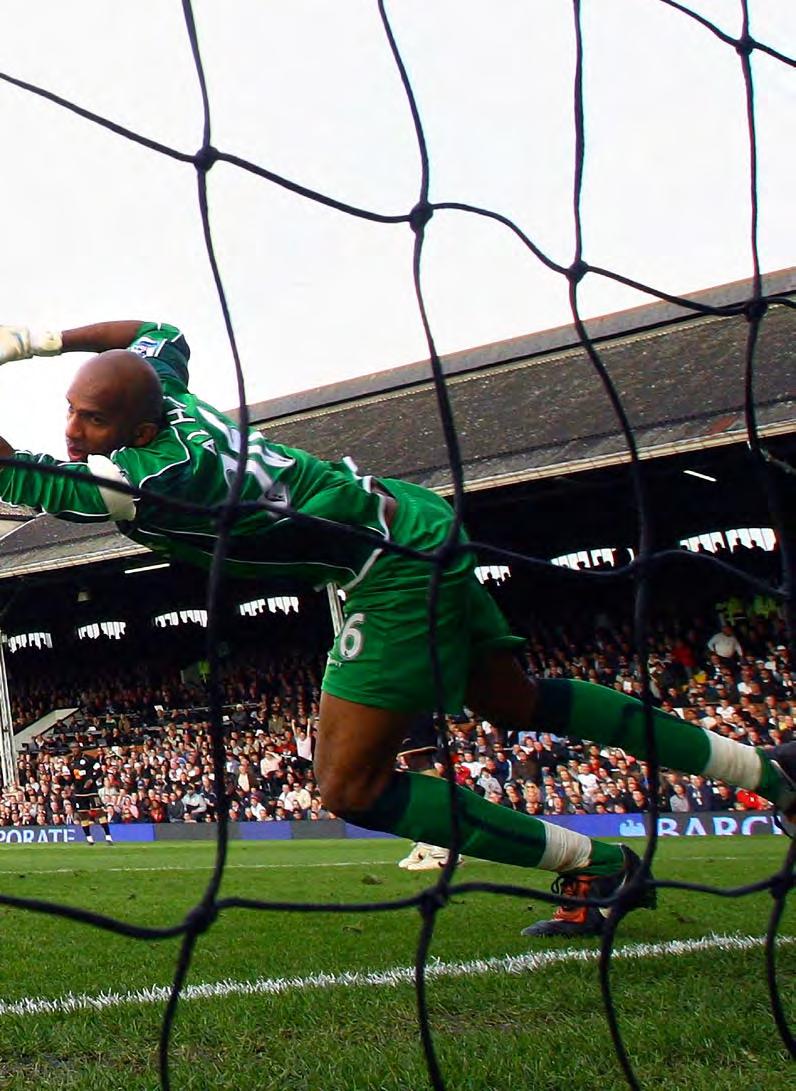
Fulham’s home ground has a perfect Thames-side location, tucked away next to elegant Bishop’s Park in one of the most discreetly well-heeled areas of London. It’s also a charmingly quirky place, whose rickety turnstiles (which, like the Johnny Haynes stand, are listed) and red-brick facade have the aura of a different, gentler age.

In Liverpool’s footballing pomp, when curly perms ruled, Anfield saw the fulfilment of many dreams. Located in the solidly workingclass area of north Liverpool—less than half a mile from the home of arch-rivals Everton— it’s another ground built by Archibald Leitch.
Craven Cottage was designed by the Glaswegian architect Archibald Leitch, who built 20 major football stadiums in the UK—including Chelsea’s Stamford Bridge, which has long overshadowed its less glamorous neighbour. The “cottage” itself, on one corner of the pitch, was added by Leitch because he’d forgotten to have changing rooms in the original design. Technically, its real name is the Pavilion and, with its ornate balcony, it does indeed look like something more usually found at a cricket ground.
Fulham’s former chairman Mohamed Al-Fayed, who sold the club in July, was responsible for the one tacky note—the much-mocked statue of Michael Jackson. (Jacko’s only link to the club was that he once attended a game as Al-Fayed’s guest.) When criticised by fans for erecting the memorial, Al-Fayed’s response was: “They can go to hell.”
Capacity: 25,700. For tours, go to fulhamfc.com
According to Simon Inglis, author of Football Grounds of Britain, it was Arsenal who first used the name “Spion Kop” for a sloped terrace (after the 1900 Boer War battle fought on a hill), but “Anfield’s Kop inspired all later imitations…Britain’s largest, grandest and noisiest terrace”.
In its heyday, the Kop held 30,000 fans —although not always comfortably. It was demolished in 1994 with the coming of allseated stadiums, but nearly 20 years later the new stand has yet to be accepted by all Liverpool fans—and that’s an understatement. Plans are now under way for a £260m redevelopment including a hotel and (shudder) a “food hub”.
Capacity: 45,500.
For tours, go to anfieldtour.com

Lucky
Known across the world, Wembley is “the home of football”, england’s national stadium and the scene of any number of great events—including the 1966 World Cup win (so long ago that the country england played no longer exists), and Live Aid in 1985. even Pele spoke about Wembley in reverential terms.
But, as any visitor knows, there’s a huge mismatch between the myth and the reality—not least because shiny corporate Wembley sits in a depressing

industrial estate and the approach reeks of cheap burgers. Built in 1923, the famous old twin towers were demolished in 2000. the new Wembley, designed by sir Norman Foster, was late and over budget, but has largely delivered. Plush and well-designed, inside it’s an enjoyable—if hideously expensive— experience for fans. And while the “McDonald’s” arch may never evoke the affection the twin towers did, it’s certainly distinctive.
But does the place have the same soul?
Capacity: 90,000. For tours, go to wembleystadium.com ►

You’d be hard pushed to find any football fan anywhere on earth who hasn’t heard of the Theatre of Dreams, as Bobby Charlton famously dubbed it. Football was originally a working men’s game—although it can be argued that United have done more than most to change that—and Manchester was the heart of the industrial north, so it’s fitting that the ground was built next to a canal once used for carrying coal.
Old Trafford, yet another ground designed by Leitch, has been Manchester United’s home since 1910—they lost their first match there to Liverpool. However, no games were played between 1941 and 1949, because of German bomb damage—and when league football began again after the war, United were forced to play their home fixtures at Maine Road, the home of Manchester City.

Today, the sheer size is overwhelming (it’s the largest club ground in the UK) and so is the mythology surrounding it. On the southeast corner is a clock commemorating the 1958 Munich air disaster; while a statue of Sir Matt Busby, the manager from 1945–69, stands outside the East Gate. In 2008, to celebrate the 40th anniversary of United’s first European Cup win, a statue in tribute to the stellar forward line of George Best, Denis Law and Bobby Charlton was unveiled directly opposite Sir Matt’s. With a wholly appropriate nod towards religious devotion, the statue is called The United Trinity.
Most grounds built a century ago have gradually been swamped by other buildings, points out Simon Inglis. But not Elland Road—which is still in a no-man’sland in the south of the city, just off the M621. Once described by Sir Alex Ferguson as “the most intimidating venue in Europe”, Elland Road certainly comes across as forbidding in The Dammed United, the 2009 film that chronicled Brian
Clough’s legendary 44-day reign as Leeds United manager.
Clough had taken over, in 1974,

Capacity: 75,800. For tours, go to manutd.com
from Don Revie—he of the dodgy car coats—who led Leeds through their great era of the 1960s and early 70s. Throughout that time, the club captain was Billy Bremner, the growly, diminutive Scot who rarely went out of his way to avoid a scrap. There are now statues of both men outside the ground. What’s most important about Elland Road, though, is the place it retains in the life of the city, and in the hearts of the locals.
Capacity: 37,900. For tours, go to leedsunited.com

Next year, when Glasgow hosts the Commonwealth Games, Celtic Park (known as “Parkhead” after the local area, or “Paradise” because that’s what fans reckon it is) will be the venue for the opening shindig. Formed as part of a drive to fight poverty in Glasgow’s East End, Celtic aimed to promote integration among the people it worked with. Today its mission statement says it has “proud Irish links…but no political agenda”. Even so, there will probably always be an intense rivalry with Rangers.
On the same site since 1892 (when the original turf came from Donegal), Celtic Park has been redeveloped

several times—and in the late 1990s a new Paradise arose “like a phoenix from the slums,” says Simon Inglis, “all curves and angles, irregular and green”. The Jock Stein stand is named after the manager who once said that “football without fans is nothing”. The Lisbon Lions stand commemorates the club’s greatest moment (below), when in 1967 they became the first British team to win the European Cup—and with a side all born within 30 miles of Celtic Park.
But the club is probably best known for its enthusiastic fan base all over the world.
When the team won against Barcelona in 2012, even Rod Stewart, a Celtic man to his core, had to have a packet of Kleenex handy.
Capacity: 60,800.
For tours, go to celticfc.net
The home of Newcastle United is all about location, location, location: it’s right in the centre of the city, five minutes from the main shopping centre. This has brought its own problems— namely past wrangles with the local council over expansion. Planning battles are also the cause of the stadium’s endearingly lopsided look, with the huge, over-dominating North and West stands.
Nonetheless, today’s St James’ Park has achieved the seemingly impossible: a modern Premier League football stadium that’s not impersonal. Maybe that’s in part down to natural Geordie warmth, from the “Howay the Lads” sign above the players’ tunnel to the legendary Toon Army of fans. And now the original gates to the ground—which were found in farmland belonging to the former chairman Sir John Hall—are being scrubbed up and are due to be put back in place.

Capacity: 52,400. For tours, go to nufc.co.uk
Formed in 1864 to give local cricketers something to do during the winter, Wrexham is the world’s third-oldest professional football club—and, according to no less than Guinness World Records, its stadium is the oldest of all that still hold international matches. (The first was in 1877.) The club’s glory days are now somewhat in the past and they’ve recently been plagued by financial problems. In 2011, fans themselves had to raise the money—some £127,000 in one day—to save the club from oblivion. Yet the jolly, red-andwhite home to the Dragons survives as an interesting and seamless mix of old and new. There are any number of glitzy new stadiums in Wales. But if you’re in the mood for something more traditional, this is the place to come. Capacity: 10,500. For more, go to wrexhamafc.co.uk. n

Thanks to: Duncan Adams, founder of footballgroundguide. com; Simon Inglis, author of Football Grounds of Britain; Michael Hogan, sports writer, Daily Telegraph; Frankie McIlheney.
Disagree with our selection? If so, we’d love to hear about your recommended football ground. Send us an email —with a picture if possible—to: theeditor@ readersdigest.co.uk.

Lauren McLean is fearless, despite close calls. She’s been drawn to adventure since childhood
Seasoned climberHer feet hit first, striking the rock with the force of a hammer blow. Then she toppled onto her side, facing the cliff on a ledge barely wide enough for her body. The rope at her waist snapped taut, but she clung to a knob of granite in case it went slack again.
The fall had happened without warning, so fast that she’d had no time to be frightened. Now she fought the panic rising in her chest. Nine hundred feet below lay the floor of Death Canyon, Wyoming. Her ankles were already swelling, ballooning over the tops of her climbing ►
by Kenneth Miller photographed by JaMes horanshoes. Ants began to swarm across her legs. As she reached to brush them off, a bolt of dizzying pain shot up her spine. She wondered if her back was broken too.
The clouds grew darker. And then it began to rain.
In Portland, Oregan, Lauren McLean had starred in her school skiing team. She spent holidays hiking and horseriding at her family’s lodge in Canada. At the University of Montana, she took up rock climbing, and after graduation got a job leading youth expeditions for Wilderness Ventures, a company in America’s Pacific Northwest.
On an outing with her students to the Oregon desert, McLean, 25, met the respected mountaineer and extreme-sports journalist Michael Ybarra, who’d discovered climbing in his early thirties while working at the Wall Street Journal. Since then, he’d travelled constantly in search of challenges to his skill and stamina. Now 44, he was always ready to hit the rocks with another devotee.
McLean told Ybarra that when her contract ended with Wilderness Ventures she’d be heading to the rugged Teton Range in Wyoming. “Let’s get together there to do some climbing,” he suggested.
And so in August 2011, McLean and her fellow Wilderness Ventures instructor Dana Ries, 21, were joined by Ybarra in Grand Teton National Park. McLean was a far more experienced climber than her friend—but both were eager to learn from Ybarra, who’d led technically complex climbs from the Himalayas to the Andes. The trio spent three days clambering up difficult rock faces, and on the fourth decided to tackle a formation called Cathedral Buttress.

They started at dawn, hiking through Death Canyon to the base of the cliff. At 8am, they stepped into their harnesses, tied themselves to nylon ropes, and began the 1,800-foot ascent. It would take nine stages—or “pitches”— to reach the top.

Ybarra climbed first, and when he finished a pitch, Ries and McLean followed, with him managing their ropes—a process known as belaying—reeling in slack until the women reached him. Then he climbed the next pitch, and the cycle began again.
The day was gorgeous, and at first the going was smooth. But as the hours passed, the

Death Canyon, so named because an explorer vanished there in 1899
group’s mood shifted from ebullient to grimly determined.
The dark clouds gathering around 4pm seemed to reflect the change. The area is notorious for sudden late-afternoon thunderstorms. “We’d better hurry,” Ybarra said. “Let’s get this done before it starts pouring on us.”
There were two possible routes for the last pitch, which started from a narrow ledge. As was his practice, Ybarra opted for the harder one. It required the climbers to scale a tenfoot overhang, clinging to the bottom before heaving themselves over the protrusion. As Ybarra ascended, the women could hear him grunting with effort for the first time. “If this is tough for him, we’re in trouble,” Ries said, exchanging a worried glance with McLean.
Trying to follow him, Ries made it part of the way, then lost her grip and dangled from her rope. She and McLean shouted to Ybarra for help, but the wind carried away their voices. Lightning crackled over a nearby peak. The pair knew they’d be perfect targets if the storm came closer.
McLean pushed herself off the wall and dangled next to Ries. “Why don’t you try shimmying up my rope?” she said. “When you get to the top, tell Michael to lower me so I can get back to the rock and start again.”
Grabbing her friend’s lifeline, Ries hauled herself to a granite protrusion a few feet above them. “See you soon,” she called, as she cleared the overhang.
Ybarra was sitting on a broad slab near the summit, anchored to the rock so he could safely belay his partners’
ropes. He winced when Ries told him McLean was dangling on the rope. “We need to get her back to the rock before the wind shifts,” he said.
The women’s ropes ran through a gadget attached to Ybarra’s waist designed to slow or stop a climber’s descent. Ybarra had rigged it to clamp the rope automatically if either woman fell. Now he hurried to reset it, intending to lower McLean gently to the nearest ledge—but in his rush somehow released the catch completely. As yards of rope shot out, Ries gasped and Ybarra’s eyes went wide with horror. An instant later, he managed to apply the brake.
Shaking, he and Ries stepped to the edge of the slab. “Lauren,” they shouted, “are you OK?”
Long seconds passed before the response came, in a quavering voice: “Not OK!”
Ybarra pulled out his mobile phone and dialled the emergency services. He was put through to a search-and-rescue coordinator for Grand Teton National Park. “We’ve got an injured climber,” Ybarra told the ranger. “I’ll tell you more when I have the details.” Then he retied his own rope and began abseiling down the cliff.
As he descended, the first cold raindrops hit his face. He found McLean 30 feet below the overhang, lying on a ledge no more than a foot wide. Fortunately, the shower ended the moment he reached her.
“I’m sorry, Lauren,” Ybarra said.
“What happened?”
“Something messed up with the belay. Where do you hurt?”
“Both legs and feet. And my back, whenever I try to move.”
“How bad is your pain, on a scale of one to ten?”
“Nine.”
“We’re going to get you taken care of,” he said. “But there’s no phone reception here. I’ll be back as soon as I can.”
Ybarra returned to the top, called the ranger and described McLean’s condition. Then he abseiled back down. “Would it help if I distracted you?” he asked McLean, dangling beside her. “Do you want to talk about your childhood?”
“Stay with me, but don’t say anything,” she said. “I need to focus on my breathing to keep away the pain.”
Ybarra fell silent and cradled McLean as best he could. His presence helped her find something that felt almost like peace.
The search-and-rescue coordinator Ybarra had spoken to was Martin Vidak, who at 4.55pm paged the Jenny Lake Rangers, the squad assigned to Grand Teton’s Jenny Lake and one of the most respected search-and-rescue teams in America. They gathered at a base a few miles from the accident site—and at 6.10 three of them boarded the park’s helicopter for a reconnaissance mission to Cathedral Buttress.
The scouting crew brought back worrying news. Thunderstorms were nearby, and it wasn’t clear whether the angle of the cliff allowed enough rotor clearance for the helicopter to get the victim out. Not only that, but the light would be gone by 9pm, and safety regulations prohibited the chopper from flying after dark. McLean might even have to spend the night there.
“We’re going to have to play this one by ear,” Vidak told his colleagues.
At 7.45, Dana Ries was sitting glumly on the buttress, huddled against the deepening chill, when she heard the drone of helicopter rotors. Looking up, she was startled to see a ranger floating towards

her, suspended from a rope. “I’m Ryan Schuster,” he said, as the aircraft set him down, along with a large bag of gear.
Minutes later, the chopper deposited another ranger, park medic Rich Baerwald. Next came a basket full of medical equipment, food, warm clothing and sleeping bags.
Baerwald shouldered a backpack full of supplies, abseiled down the cliff, and reached McLean and Ybarra a little after 8.20. “How are you doing?” he asked the injured woman.
“I’d like to get off this mountain,” she replied.
Baerwald checked her vital signs and
put a splint on her left ankle, which was clearly shattered. Another urgent concern was shock. McLean seemed stable, but Baerwald knew she’d need fluids and pain medication to remain that way. Ideally, the rescue team would get her to hospital immediately. But with the approaching storm, and fading light, that mightn’t be possible.
He radioed Schuster, and they agreed that the helicopter could squeeze between the rocks if the wind didn’t get any stronger. Then Schuster radioed the pilot, who confirmed that the storms were at a safe enough distance, but suggested attaching an extra 100 feet of rope to the 150-foot length usually used for rescues so that the helicopter could stay away from the dangerous cliff.
“I’m going to put you in a screamer suit,” Baerwald told McLean. “It’s a fullbody harness that’ll support your spine until we get you on the ground.”
“Why do they call it that?” she asked.
“You’ll see when you’re hanging from the helicopter.”
Ybarra helped strap her into the suit, and with the chopper hovering, Baerwald clipped McLean and himself onto the end of the extra-long rope. Together, they rose from the rock. McLean really did feel like screaming—but with joy, not fear. She was finally off the mountain. And the sunset was the most beautiful she’d ever seen. ►
“I’m so thankful that I can still go out and do what I love,” says Lauren McLean

Ryan Schuster spent the night on the rock, as he had after many other rescues. Ybarra and Ries decided to abseil down after dark, aided by headlamps. Both were clumsy with exhaustion, but they made it safely back to their cabins by 2.30am.

Before his death, Michael Ybarra had climbed peaks in Nepal, Peru and Alaska
At the local hospital, McLean learned that she’d broken both legs and feet, her pelvis and a vertebra in her lower back. The damage to her left foot was so severe it might have to be amputated. That night, a dose of morphine helped her sleep. The next morning, she was flown across the state line to Salt Lake City in Utah, where she underwent four hours of surgery on the mangled foot. When she woke up, she was relieved it was still there. But the surgeons couldn’t give a long-term prognosis.
Three days later, McLean’s father drove her back to Portland, where he’d installed a hospital bed in the living room of his flat. (McLean’s parents were divorced, and her mother had died the previous year.)
A month into her recuperation, she asked her dad to put her old bike on a
stand on his patio. An orthopaedist had told her she’d never walk up a steep hill again. She decided to prove him wrong. Although both legs were in casts, she pedalled every day. And when the casts came off, she threw herself into physiotherapy.
In January 2012, six months after her accident, McLean took off for New Zealand, where she worked as a fruit picker and trekked in the country. By May, she was back rock climbing in Montana. And in June, she took another job leading youth expeditions—this time in Fiji, where she also learned to surf.
Tragically, McLean’s goal to return to the Grand Teton with Michael Ybarra will remain unfulfilled. He died on a solo climb in July, after falling from a cliff in Yosemite National Park. “His death is still hard to process,” McLean says. “He was one of the strongest climbers I’ve ever seen.”
As for her own experience, it simply made her more determined to live fully. “I try to keep a good attitude. Just go slowly and methodically, and you can get through it all.” n
Although proverbs are meant to be a source of eternal wisdom, the internet turns up quite a few that, although plausible sounding, are complete rubbish:
“Wet seagulls should never fly at night.”
“An owl in a sack bothers no man.”
“It is only the hairs on a gooseberry that stop it from being a grape.”
“Uneasy lies the top hat on the head of a stoat.”


…MY DAD BEING FAMOUS. I was born and spent my early years in Denmark, and it didn’t take me long to realise that my father Claus Toksvig (pictured left) was very well known. Back then, Danish TV started at about 7pm. There was an hour of news read by my father, followed by a programme about our Queen’s collection of spoons, and that was it. He was our Richard Dimbleby and the whole country seemed to know who he was. He’d met my mother in London. She was a studio manager at the BBC and—can you believe this?—women working for the BBC back then had to give up their jobs if they got married.
…MOVING TO ThE US. Dad got a job as a foreign correspondent and, when I was about seven [in 1965], we relocated to the US. It was fantastically exciting, but I struggled with the school system over there. Thanks to my father’s influence, I was a fast reader
and I loved arguing about stories I’d read in the newspaper. Unfortunately, the teachers didn’t like to hear a little Danish girl disagreeing with their analysis of the Second World War. I was eventually thrown out, but it wasn’t because I was a rebel or anything like that. Dad’s work meant we moved around a lot, so I was absent for days at a time...and I was bored! There just wasn’t enough for me to do.
…BOARDING SChOOL. At 14, we moved to England and I was sent to a school near Guildford. I hated it! Absolutely the worst four years of my life. I always say that boarding schools are run by therapists to turn out future clients. There was no way I was sending my kids to such a place. I love spending time with them— why would I want to send them away? I had a look round the local schools [Sandi lives in Kent] and they went to a great comprehensive. There’s a lot of talk about the education system in this country, but if you’re concerned about your child’s school, get

Knitting at her grandparents’ house during the school holidays; (opposite) was Sandi the most media-savvy toddler in history?
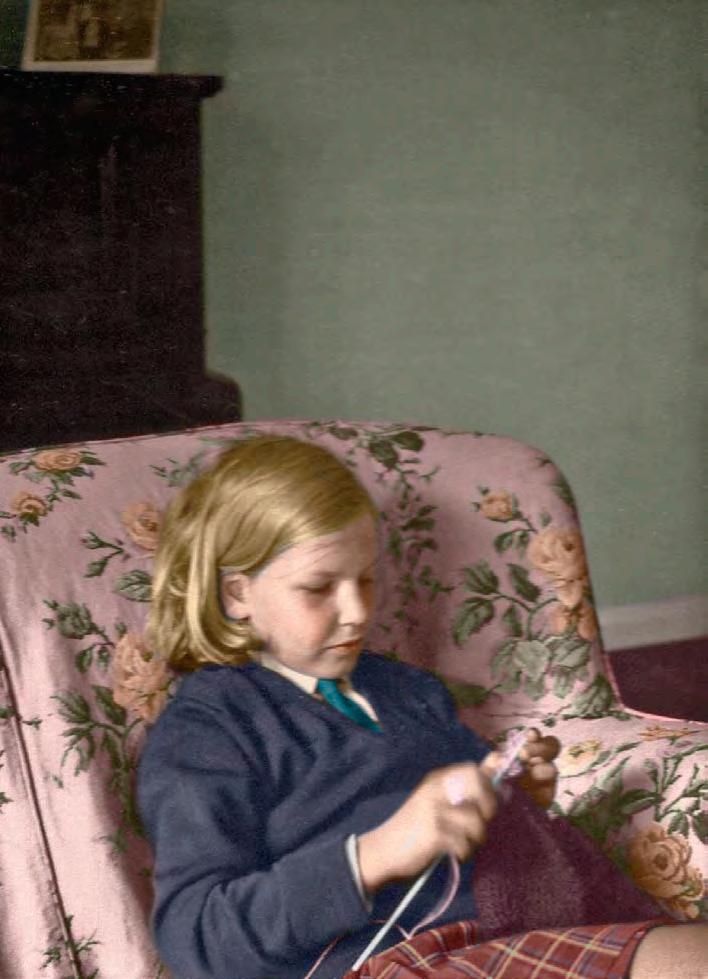
“The teachers didn’t want to hear a little Danish girl disagreeing with them”
involved. Become an active parent and give them extra help at home.
◄ I discovered the Footlights, which was the university’s revue-show thingy. There was quite a line up while I was there—people like Stephen Fry and Hugh Laurie. Obviously, I had no idea who they were at the time. They were just “those funny blokes”.
Of course I was pleased, but I think it meant far more to my parents. My dad had never been able to go to university and he was thrilled. It was a tough regime and some students fell by the wayside, but I loved that challenging atmosphere. I’d also been acting in plays and putting on shows throughout my school years, so I was overjoyed when
Even with all the acting and comedy at Cambridge, I didn’t have the slightest interest in it as a career. I wanted to be a lawyer. Out of the blue, somebody told me about a job at Nottingham Playhouse and I thought, OK, get this out of your system, then get stuck into law. That was 33 years ago—surely some kind of record for the world’s longest gap year! In the early Eighties, I started doing Saturday morning kids’ TV, I joined the Comedy Store Players [with Josie Lawrence and Paul Merton], then Whose Line Is It Anyway? happened and, almost without me noticing, comedy became my job.
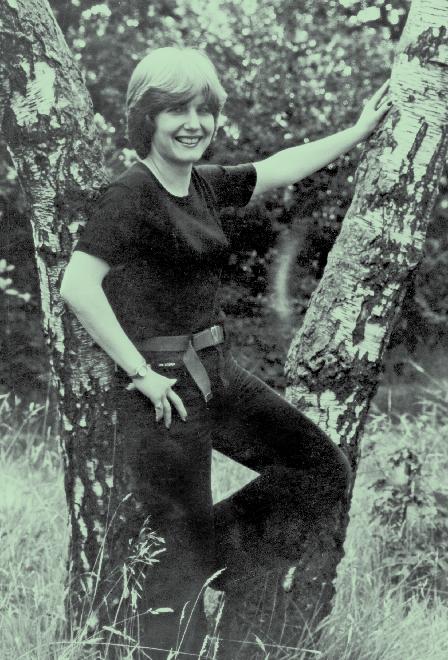
Law is still one of the things I’d love to do. Maybe one day I’ll finally get to save the world from the lofty heights of the courtroom.
My former partner [Peta Stewart] and I were talking for years about wanting to have them. Obviously, our situation was slightly different to most families, but I honestly believe that anyone thinking of having kids needs to have long and serious discussions about what they’re about to do. We tried to go through every

eventuality and problem, but the truth is that you only really know how life is going to change after you hold that little bundle in your arms and go, “Wow!”
Does the biological connection make a difference? [Sandi’s children were carried by Peta and fathered by a friend, Christopher Lloyd-Pack, by artificial insemination.] Not to me, it doesn’t—I wouldn’t have cared if we’d got them from Tesco. Being a parent is all about the love you give to your child. I sat down for dinner with my children recently and I was so full of love for them I thought I was going to burst!
…GETTING DEATh ThREATS. In the early Nineties, I was warned that I was about to be outed by a tabloid, so I did it myself. At the time, I don’t think there was a single, solitary “out” gay woman in the
“We had death threats. People actually wanted to kill me!”
British media, and I was told my career was definitely over. Making that decision to tell people wasn’t easy and it got very heavy. We had death threats. People actually wanted to kill me! It’s impossible to understand how much psychological damage has been done over the years, just by people having to keep such an essential part of themselves secret. Look at poor Alan Turing [the mathematician who helped crack the Enigma code]—he was chemically castrated for God’s sake! When he died, this country lost one of its greatest minds. Thankfully, things have changed and you’d be hard-pressed to find anybody who doesn’t have a friend, relative or colleague who’s gay. Even the Tory party passed a law on equal marriage!
…WRITING MY FIRST BOOK tales from the Norse’s mouth IN 1994. Like almost everything in my life, writing just sort of happened. At no point did I spend months sweating over my great work, desperate for a publishing deal. Someone came to me and said, “Do you fancy writing a book?” My father was a journalist; my brother Nick is a journalist;

my sister Jenifer writes. It’s in the blood. Dad used to compare writing to eating fish. “First you have to land the fish. Then you fillet out the best bits.” I just write and write until there’s something on the page, then I winkle out the good stuff. Do I get writer’s block? I’ve got three kids and a stepdaughter. I don’t have time!
Sandi doesn’t belittle anyone on The News Quiz
to diffuse the situation. And if that didn’t work, I’d go to bed. I’d literally stand up and say, “Good night.” The pandemonium would continue for a while until one of them would be sent upstairs to see what had happened. “Mum, it’s 10 o’clock in the morning. Why are you in bed?”

Debbie and I have known each other for years, but there was just this one day where I looked at her and it was like being struck by lightning. It was such a fabulous feeling—I wish everyone could be as happy as I am. Over the years, the question people tend to ask her is, “What’s it like to live with Sandi? She’s a comedian. You must be laughing all the time.” Debbie just smiles and looks embarrassedly at the floor. “Oh, yes,” she says. “It’s hilarious!”
I WAS NO GOOD AT DISCIPLINING ThE KIDS. Being a mum has always felt like such a blessing to me that I just couldn’t bring myself to shout at my children. If they were misbehaving I’d try to make them laugh; I’d use humour
The problem with some quiz shows is that they’re just too competitive. That’s why I’ve always preferred stuff like Call My Bluff and QI—because they’re fun. The News Quiz [Sandi took over the long-running Radio 4 hit in 2006] has that same easy-going, non-competitive atmosphere. No one’s after the best lines. No one’s trying to belittle the other guests. Anyone who’s been to a recording of the show will tell you that the first thing we do when we come out onto the stage is have a hug.
I don’t really like interviews; I’ll do them, but I don’t have that burning desire to see my words splashed across every newspaper in the land. So when somebody explained Twitter to me, I thought about it for a few seconds and said, “Not interested.” If it’s your thing, then great. Knock yourself out. Enjoy your Twittering. Personally, I just think it’s a lot of sad maddoes showcasing the very worst of humanity. Trolling! I mean,
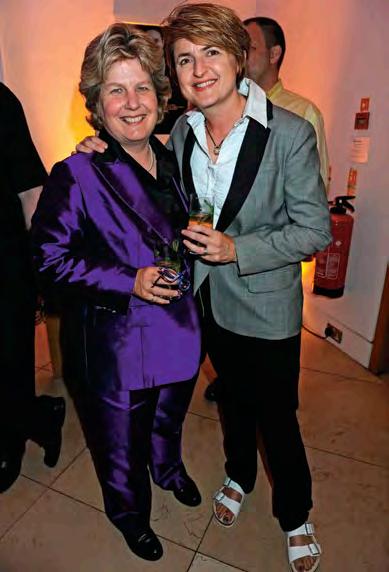
“I wish everyone could be as happy as I am”: Sandi and Debbie
c’mon. That’s just like screaming at all the other drivers from the safety of your car. There’s a Twitter account with my name on it, but my agent looks after it for me. And I never, ever Google myself.
WORK TOO
If I want to clear my head, I either get out my loom—I’ve got a wooden, four-shaft table loom—and make a rug, or I go kayaking. We live on
the Kent coast and getting out on the water is the most wonderful feeling. Sadly, days like that don’t happen very often.
I’ve always been rubbish at relaxing. I’m touring the UK this year, which I find really tiring—just the constant moving from place to place—but the atmosphere at the shows more than makes up for any tiredness. People come to see me because of The News Quiz, QI or Call My Bluff. There are some who are simply short, gay people, pleased to see another short, gay person on stage!
It happened just a few weeks ago. I still have a house in Denmark and I suppose it’ll always be home, but I’ve been here a long time and Debbie said, “Look, you’re interested in politics, you’re always talking about it, and yet you’ve never been able to vote in a general election.” I’m waiting to hear from the Home Office. My mother’s British so, technically speaking, I should be OK, but wouldn’t it be funny if they refuse to have me! I can just see them looking at the application form. “Sandi Toksvig? Not a chance!” ■ As told to Danny Scott
Sandi is on tour with her show My Valentine from early October, coinciding with her new book Peas & Queues: The Minefield of Modern Manners (£12.99).
“Swag swag swag, on you/Chillin’ by the fire while we eatin’ fondue”
Justin Bieber, “Boyfriend”
The worst pop lyric of 2012, as selected by “Entertainment Weekly”. Runners-up include ”Roman Reloaded” by Nicki Minaj (“You at the bottom of the barrel scraping/I’m out in LA at the ‘Ice Age’ taping”) and “Pontoon” by Little Big Town (“Party in slow motion/ Out here in the open/Mmmmmmm…motorboatin’!”)

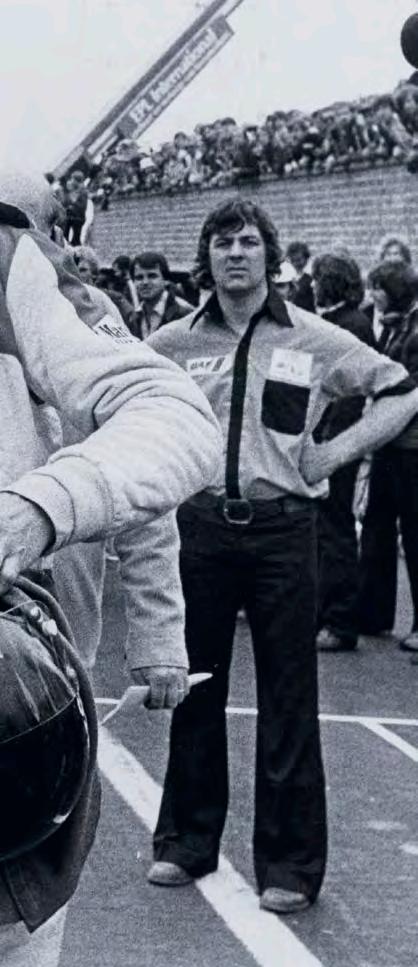
The 1976 Formula 1 season saw dashing Brit James Hunt in a perilous race for glory with Niki Lauda. With new film Rush charting the epic battle out this month, here’s the inside track on their fierce rivalry bY b E nj I w I l S on
a REMaRK aBLE chaMpionship
Austrian driver Niki Lauda had won the 1975 Formula 1 World Championship and was leading Hunt comfortably in the 1976 standings, before crashing at the Nürburgring track in Germany— the tenth of 16 races. With Lauda out injured for three races, Hunt ►
Hunt raced through the rain in Tokyo— and won the championship

◄
closed the gap to just two points. But Lauda returned for the Italian Grand Prix and Hunt was then retrospectively disqualified from the earlier British GP, which he’d won,
for taking a short cut back to the pits during a race suspension. When he retired from the Italian race, Lauda was 17 points ahead in the championship with only three rounds left.
“Forty years ago, if you raced for five years there was a two-out-of-three chance that you’d die,” says three-times world champion Jackie Stewart.
A big part of the problem was the relative amateurism of the sport.
“There were a lot of drivers who’d turn up at their home Grand Prix with an old F1 car they’d bought, wax it, put some oil in it and tootle around at the back of the grid,” says BBC F1 producer and reporter Roy Calley.
Indeed, though he had a swaggering bravado on the track, Hunt got scared. He’d vomit violently before races and once told a colleague, “Sometimes I think of all the friends who have died on the track and I wonder if I will
Still, Hunt won the next race and the one after. Lauda withdrew from the last round in Tokyo because he felt it was too wet and dangerous. Hunt came third—and pinched the title.
be the next. I thought this morning, wouldn’t it be lovely to be a professional golfer? A nice walk in the sunshine, 18 good holes, then a little time at the 19th?”
In fact, 1976 was the first year when there wasn’t a death at a Grand Prix, though the 1970s saw an average of one fatality per season, down from 1.4 in the 1960s and 1.5 in the 1950s.
But with TV money and more sponsorship flooding into the sport, it has become much more professional and safety conscious over the last three decades or so. The many improvements include emergency air supplies being fed into drivers’ helmets, stronger cockpits and better gravel traps.

There have been no deaths in F1 since Ayrton Senna was killed at Imola, San Marino, in 1994.
August 1 was a pivotal day in the 1976 F1 championship— and it almost cost Niki Lauda his life.

Lauda’s horrific crash at the Nürburgring track in Germany
Lauda had no recollection of his crash at the Nürburgring—a notoriously twisty, narrow track, bordered in places by steep mountainsides. He remembered driving out of the pits after changing tyres, reaching a certain corner—then finding himself in a helicopter being taken to hospital. It seemed that he just lost control, hit a barrier, slewed across the track, hit another barrier and burst into flames. Other drivers came and dragged him out but he had burnt his lungs, broken
The new Hollywood movie makes much of the rivalry between the flamboyant James Hunt and the more thoughtful Niki Lauda—as did the British press at the time. But though they did criticise each other publicly, this was mainly for PR. The pair had become close on the Formula 3 circuit, shared a flat in London at one stage and though
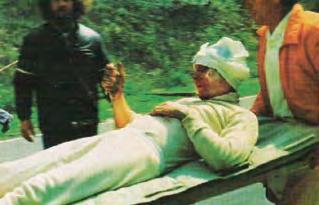
most of his ribs and very soon slipped into a coma. The next day, a priest read him the last rites.
But amazingly, he pulled through and, despite burns to his face and hands, six weeks later he was finishing fourth in Italy.
Hunt called Lauda “Rat” because of his rodent-like features, they had a great deal of mutual admiration.
“The thing about the 70s,” says Alan Henry, former Guardian F1 correspondent, “is that the drivers, because of safety concerns, were probably far more respectful towards each other than you would see with the
current F1 drivers. They knew that if there was an accident they’d probably die or be seriously injured.”
The real rivalry was between Hunt’s and Lauda’s fiercely competitive teams, McLaren and Ferrari. The 1976 season was extraordinarily political with a great deal of bad blood. This culminated in Ferrari insisting that Hunt’s win at the British GP be wiped from the records—even though his short cut had gained him no real advantage.

James Hunt smoked 40 cigarettes a day, drank heavily and, at one stage while he was racing, had a drug problem. Then there were the ladies.
“I like sex as much as the next man,” Lauda once said. “Unless that next man is James Hunt.”
But his prowess on the racetrack was arguably less impressive. He was nicknamed “The Shunt” for his frequent minor crashes and though he could beat anyone on his day, his day came too rarely. He’d never won a

Nice work if you can get it…
race until 1975 and only found himself in a competitive car in 1976 because two-time champion Emerson Fittipaldi had made the bizarre decision to leave McLaren for his brother’s privately owned team. As well as the lucky breaks
of Lauda’s crash and withdrawal from the last race, Hunt’s 1976 victory was based more on his daredevil character than ability. As his parents once put it, he drove away from his driving test “like a lunatic” and never once slowed down.

A born perfectionist, Lauda analysed every detail of a race in advance
“James was a wild one, but Niki was the best of that era”
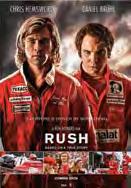
Though Niki Lauda was Austrian, he had a markedly German temperament. He was known for looking at a circuit analytically and playing his drive through his mind before the race. That’s standard procedure these days, but it was far more unusual in the 1970s.
“He always tried to win at the slowest possible speed for safety. I think he was the first real driver who thought about racing as opposed to just getting into a car and driving it as fast as he could,” says Roy Calley. Indeed, Jackie Stewart has said he will not watch Rush because of its implication that Hunt and Lauda were equals is distorting history.
James Hunt never won another F1 championship and retired from the sport in 1979, becoming a BBC commentator

and pursuing various business interests.
“He always said that he’d win the world title, maybe try and defend it and then get out because that would give him a good chance of living into his seventies,” says Alan Henry. “If he was in F1, he couldn’t see himself getting past 40. It was ironic that he actually died [of a heart attack] at 46.” Lauda’s quality showed through again in 1977, the first of another two drivers’ championships he would claim before retiring in 1985. His post-racing projects have included forming his own airline, Lauda Air, and working as a non-executive chairman for the Mercedes AMG Petronas F1 team. n Rush, directed by Ron Howard, opens in cinemas nationwide this month.
“James was a wild one, but not a particularly good driver. Niki Lauda was the best of that era.”


Welcome to the pages that help make life simpler, easier and—we hope—more fun!


Unlike keen gardeners, wildlife likes untidy gardens with plenty of long grass and piles of rotting wood. And as the Royal Society for the Protection of Birds has found that 60% of species are in decline, maybe it’s time they took priority.

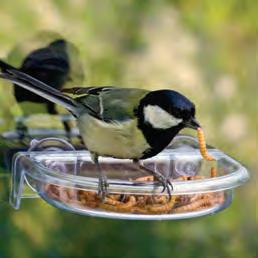
Luckily there’s room for compromise. Leaving the back of the lawn and borders undisturbed, along with that hole in the fence you’ve been meaning to fill in, gives wildlife space to breed, hibernate and roam. Then sink an old washing-up bowl in the ground to provide water or, better still, dig a small pond with sloping sides so creatures can climb out.
borders undisturbed, along breed, hibernate and roam. Then sink an old washing-up prefer simple open blooms from spring until autumn.

If you’re stuck in an unrewarding job, you’ll know how frustrating it can be. But it’s also an opportunity to prepare yourself for promotion.

richer the food source, so berry-bearing shrubs and robins, starlings, greenfinch and 90 species of insect.
Bees and butterflies prefer simple open blooms to showier varieties, so grow crocus, foxgloves, honeysuckle, old roses, lavender, Michaelmas daisies and ice plant to feed them from spring until autumn. The bigger the plant, the richer the food source, so berry-bearing shrubs and fruit trees are vital. If you only plant one, make it a crab apple, which feeds robins, starlings, greenfinch and 90 species of insect. And if all you have is a balcony, fill containers with flowers and herbs and invest in a window bird feeder (£4.99 at shopping. rspb.org.uk).
What you need is vision, so aim high, says coach Nina Grunfeld, who runs Life Club workshops for many companies. “Then plan how to get there. What are your strengths and what qualities do you need? Should you move sideways, or change jobs or industries?”

balcony, fill containers with feeder (£4.99 at shopping. and surprisingly free from
the Christmas party will get your name
Although it’s important to achieve in your present post, you may need to network beyond your manager to get recognised, says Grunfeld. Attending open meetings, chatting to directors at social dos and volunteering to organise the Christmas party will get your name known. But be subtle so you come over as confident, not pushy.
Perfectionism is impossible when swayed
Once you progress, you may need to discard some once-useful qualities. Perfectionism is impossible when decisions have to be taken fast, and trying to control everything is insanity if you have trusted sta . Just don’t be too swayed by their opinions. “When you’re a leader, you may need to trust your instincts more,” says Grunfeld.

your instincts more,” says Grunfeld. asked to do X urgently. I’ll make it trick.) Then stay calm and smile—that
In the meantime, show enthusiasm for the job you’re in and say no diplomatically if you’re overwhelmed.
(“I know it’s important but I’ve been asked to do X urgently. I’ll make it my priority tomorrow,” should do the trick.) Then stay calm and smile—that will really get you noticed.
Then all you need to do is to avoid harmful chemicals to claim your reward—a garden rich in butterflies, birds and bees, and surprisingly free from blackfly, ants and slugs. Club do
Like the Wild West, the internet has too many bandits. We asked IT experts Choose (choose. net) how to protect ourselves from... Email chancers. The message is headed “tax refund confirmation” and it comes from services@hmrc.gov.uk. It looks valid, as does the website to which you’re directed, but it’s a con to extract your bank-account details. Lesson one: never click links in unknown emails. Instead, google the organisation’s o cial website, checking the ID at the bottom matches that in the address bar, then make contact direct. And check that your anti-virus software covers every device. Website rogues. Malware steals information when we browse. To avoid picking up a bug, install good security software and every update it o ers. It’s worth blocking pop-ups and banners that may be malign (go to “help” on the browser) and locking down WiFi. Choose a WPA-encrypted password and change any ID that’s a name or location—the network provider’s site has instructions. Porn merchants. From the end of this year, TalkTalk, Sky and Virgin Media will automatically block porn unless subscribers request it and the Government wants other providers to do the same. Until they do, set parental controls on every device that connects to WiFi, including games consoles. But as many 11-year-olds know how to switch them o , it’s just as important to talk to kids about staying safe.


Thanks to the Energy Companies Obligation, those who can least a ord to switch on the heating can have a new boiler and home insulation installed for free, just by calling their supplier.

Only people on income-related benefits who are elderly, disabled or have kids are eligible, except in areas of “fuel poverty” where anyone can claim (apart from those in social housing). Everyone else is entitled to help under the Green Deal, which means paying for a home assessment, usually £120 but free in Scotland and from some councils and suppliers. Once you have it, claim up to 50% cashback on each improvement and get a Green Deal loan for the rest—call the advice line (0300 123 1234) for details.
The idea is that repayments will be covered by the energy savings, but it’s not a guarantee. What’s more, it’s based on average use, so if you’re home all day or have a big family, you could lose out. And the loan passes to the next owner if you move house, which could put o potential buyers.

The answer to the question “Is this wine any good?” is often right before our eyes. The label tells us:
It can be a large company, a co-op or an individual producer, in which case the smaller the better. “Vin de France can come from anywhere in the country, unlike Chateau Latour,” says Stephen Running of thewineschool.co.uk.
99% of New World wines highlight the grape variety, but in Europe (apart from Germany) wine is often made from a blend of grapes and the vineyard is more important. “It’s like cheese,” says Running. “When you buy Stilton, you know how it’ll taste without understanding what’s in it, and the same is true of Chablis or Rioja.”










In Europe, where unpredictable weather can make a huge di erence, look for a sunny but not scorching year such as 2009 and 2010.
In the EU, there are set terms to indicate quality, which in France ranges from vin de table to premier grand cru. The French AOC (appellation d’origine contrôlée) and the Spanish and Italian equivalent DOC (denominazione d’origine controllata) mean wine that’s better than average in any language, but labels like “superieur” are meaningless.
Full-bodied reds can top 15% ABV, while German whites may be as low as 8%.

It’s time to build some mental muscle if we’re going to follow a TV drama, let alone tackle a tax return. Here’s how to cope with: Losing the plot Concentrating on complex tasks gets harder, says Barbara Strauch, author of The Secret Life of the Grown-Up Brain (£9.99), so sign up for a course. If cost is an issue, join a University of the Third Age group (about £12 pa) or study online with Coursera, which relays lectures from top universities for free.
Slow reactions Variety forges new connections in the brain. Debating with people, holding a toothbrush in the “wrong” hand or taking a new route to the shops can help us think faster.
Memory lapses Try brisk exercise. A fast-pumping heart forms new brain cells in the hippocampus— the bit that lays down memories.
Feeling all over the place An active social life improves the brain functions that help us plan. To boost both, join a group—a book or investment club, National Women’s Register discussion or a MensShed, where guys share power drills and thoughts.
● I’m not surprised to see you. The number of couples scarred by their last holiday from hell means that September is peak time for break-ups.
● I might underwrite your costs. Though there’s no legal aid for divorce, except in cases of domestic violence, I can tell you how to obtain a payment from your bank or spouse. I might even agree to a Sears Tooth Agreement, where I foot the bill and you pay me back out of your final settlement—so ask me, if you’re strapped for cash.
● A prenup can be binding if it’s fair, no pressure was applied and it was signed at least three weeks before the wedding, so no one was bounced into accepting.
● Common-law marriage is a myth. If you’re unmarried, the only financial obligation your partner has is towards dependent children, however long you’ve been together. Unless you can show you’ve contributed financially, you have no claim on their assets and no automatic right to live in their property. But if you marry your long-term lover and then split, the time you’ve lived together will be taken into account.
● Don’t go for mediation too soon. You can get legal aid to
pay for it and it’s compulsory before you go to court. But it won’t work unless you trust it and are willing to compromise, which is unlikely when you’re feeling raw.
● Your partner may be richer than you think. However modest your lifestyle, they may have money stashed in a secret account. If we suspect them, we can employ a forensic accountant to investigate and if your partner has lied, they could go to jail. Just don’t be tempted to snoop on them yourself. Accessing their mobile or laptop without permission could see you in the dock instead.
● You don’t have to split up before divorcing. make financial sense to live separately under the same roof. It’s easier if you’re still on speaking terms and can agree on how the bills are paid, but if not the court may grant you interim maintenance.
misbehaves outrageously or tries to deceive the court, each side pays their own costs and it doesn’t a ect who has the children.
● Expect assets to be split 50:50 once each party’s “reasonable” needs have been met. Exceptions may be made if there’s a prenup, inherited wealth, if one partner made a fortune before the marriage took place, or if maintenance is payable.
● Want to divorce without my help? Then download the DIY divorce forms from gov.uk/ divorce. But any oversights are your responsibility, so pay a solicitor to check them. Going to court can cost
It can a fortune. Consider a divorce,


● You’re not the innocent party. The law isn’t interested in who left home or had an a air. Unless your partner





collaborative divorce, where partners and their solicitors hammer out terms, or family law arbitration with a lawyer who helps you reach a legally binding agreement instead. Women should stay put. Foreign divorce laws are often less generous to wives, so if your husband suggests starting a new life in the sun, insist on a “post-nup”— an agreement in case you divorce —before you go. ■



There are some rather unusual things a doctor can prescribe for his or her patients. Years ago, people used to be prescribed Guinness, and in fact while working in surgery at the beginning of my career I twice prescribed a tot of whisky. But it’s very difficult to justify six years at medical school when you’re writing Famous Grouse on someone’s drug chart.
I’ve always liked the idea of prescribing someone gold, which is used in certain cases of rheumatoid arthritis. Unfortunately, unless your doctor likes you very much, it will come in the form of a tablet or injection rather than an engagement ring. But sometimes I’ve wanted to prescribe something that has yet to make it into NHS spending policy: a haircut. If you want to help people, you could do a lot worse than become a hairdresser. Not only is hair of social and cultural importance, but since becoming a doctor I’ve learned it can also be a good indicator of how we’re feeling.
When a person’s mental state begins to deteriorate, one of the first signs can be that they stop

What’s happening on top of your head is a good indicator of what’s going on in it
combing their hair. It seems that what’s happening on top of your head is a good indicator of what’s going on in it.
A few weeks ago I was asked to go on a home visit to see Mrs Daniel. She was in a serious accident last year and her GP was worried that she was developing agoraphobia as well as depression. “My world has fallen apart,” she told me, as I sat in her back room drinking tea. There were pictures of her and her husband dotted round the room, but those pictures and the Mrs Daniel in front of me couldn’t have been more different. I
Her eyes now looked sunken, she’d lost weight, but the most dramatic change was her hair. In the pictures her elegant, silver hair was neatly trimmed and coiffured; now it was matted and hung limply round her face. The GP had noted in her letter to me that she was concerned about Mrs Daniel’s deterioration in self-care. Someone needed to intervene.
I wondered if, as well as starting her on antidepressants, getting her hair done would give her a confidence boost, which in turn would mean that she’d feel happier leaving the house and more able to get back to her old self. But cuts in the NHS tend to be more concerned with budgets than barnets.
Back on the ward, I discussed Mrs Daniel’s plight with some of the team. “Ask Brendan,” one of them suggested. Brendan’s an occupational therapist on another ward, but he used to be a hairdresser. I gave him a call and he agreed to help, so a few evenings later he paid her a visit, scissors and hairdryer in hand.
When I saw Mrs Daniel last week, she was transformed. “He’s done such a good job, hasn’t he? I’ve been down the Irish Club to show it off,” she beamed. “He’s wasted in the NHS,” she added.
I, however, think that’s the best place for him.
Max Pemberton is a hospital doctor and author. His most recent book is The Doctor Will See You Now
There are a few variations on this myth, with some people saying shaving also makes hair grow back darker, faster or coarser. For the hirsute among us, who long to be smooth, but fear making matters worse, relax. It’s all totally untrue. Multiple scientific studies have shown that shaving hair—anywhere on your body—has no effect on the way it grows back.
where did the myth come from?
It probably comes from the fact that when shaved hair begins to grow back, it lacks the natural fine taper at the end of the hair shaft that unshaved hair has, giving the impression of coarseness or thickness. As for it making hair grow back darker, as the new hair has not yet been lightened by the sun it looks as though it’s darker, but given time, it will lighten up slightly. so there’s nothing to worry about?
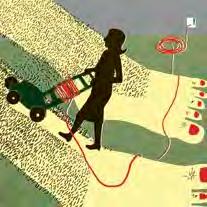
Not really. Shaving is an effective short-term solution to hairiness. Of course, it only provides smooth skin for a day or so before the regrowth begins to appear, so many people opt for waxing, although this is quite painful. There are some new products on the market, such as Inhibitif, that can be bought over the counter. They are applied to newly shaved skin over several months and make the hair grow back even thinner and sparser than normal, to reduce shaving.











If your days out are being ruined by too many visits to the toilet you may be su ering from an overactive bladder.
Over 7 million people in the UK su er too, so you’re not alone.
Luckily there are treatment options available including e ective medications from your doctor.
To find out more about overactive bladder and the help available visit
www.bladderproblem.co.uk
Or call our free helpline on 0800 011
4766













1. Have two nice cups of tea. Green is better than black, but any tea is good. A Dutch study found that only 2.4 per cent of healthy Rotterdam residents who drank two or more cups of tea a day had a heart attack within six years. That compared with 4.1 per cent of non-tea drinkers.
2. Luxuriate in bed. Getting the right amount of sleep will help keep your ticker tickety-boo. Too little (less than seven hours) and you have a slightly higher risk of heart disease, according to a Harvard study of 70,000 women. But too much is bad for you as well—the same study found that women who slumbered for more than nine hours also had an increased risk.


Cycling may help angina sufferers more than surgery
According to Blood Pressure UK, 75 per cent of Brits don’t know their blood pressure reading. You can learn yours—and whether you need a change of lifestyle or even medication—by going to one of 1,500 “pressure stations” during Blood Pressure Week, September 16–22. To find your nearest one, go to bloodpressureuk.org.
3. Get on your bike. German researchers asked 100 men with mild chest pain, or angina, to either exercise for 20 minutes a day on a stationary bike or have an artery-clearing procedure called angioplasty. A year later, only six of the bikers had had a heart attack, stroke or other problem, compared with 21 men who underwent the angioplasty. Do talk to your doctor, though, before embarking on a fitness kick if you have angina.
4. Have more sex. It counts as physical activity, which is, of course, good for the heart. Maybe that’s why University ►
men’s health is he feeliNg frazzled?

Recent research from Sweden suggests that men under constant stress are 45 per cent more likely to develop diabetes. But guys are good at hiding their angst. So how can you tell when things are getting to them?
Look out for:
1. Road rage behaviour
2. Shouting at the sport on telly
3. Getting hooked on video games
4. Drinking more
5. Gastrointestinal problems
6. Headaches
7. Violence
If your man is displaying one or more of these signs, be supportive and non-judgemental. If it goes on, suggest that he sees a doctor.
of Bristol researchers found that men who do it at least twice a week are less likely to have a stroke or any other cardiovascular problem. And it’s good for women too. What’s not to like?
5. Indulge in dark chocolate. The good news from several studies is that savouring dark chocolate several times a week benefits your heart. This effect is probably down to compounds called flavonoids, which help the arteries stay flexible. Go for 70 per cent cocoa content and avoid the more fatty milk chocolate—it could raise cholesterol.
6. Raise a glass. A study in the Journal of Agricultural and Food Chemistry found that men who drank one beer a day for a month lowered their cholesterol, increased their blood levels of heart-healthy antioxidants and reduced their fibrinogen, a protein that contributes to blood clots. And red wine is even better—it’s up to ten times higher in flavonoids.
Citrus fruit is full of vitamin C, which, according to recent research, our retinas need for good nerve cell function and better eyesight. Leafy greens, such as spinach and kale, are a good source of lutein and zeaxanthin, which reduce the risk of macular degeneration, the most common cause of blindness.


Carrots and sweet potatoes are high in beta-carotene, which can help protect eyes. A source of vitamin A, beta-carotene is converted in the retina into a protein essential for the perception of light.


Flora pro.activ Buttery. Proven cholesterol lowering never tasted so good.
Clinically proven to actively lower cholesterol by 7-10%*, with a rich buttery taste and creamy texture. Now, lowering your cholesterol doesn’t mean giving up the tastes you love.
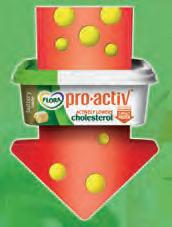
www.floraproactiv.co.uk
This is the time of year when we often sign up for new activities—but it’s easy to make excuses for not taking exercise. Here’s how to surmount the obstacles
l Hurdle: “I’m too busy”
Clearing it: You don’t need daily hour-long workouts to reap healthy rewards. Ten minutes of walking, stair-climbing or squats several times a week can help you sleep better, think more clearly and feel good.
l Hurdle: “I don’t know where to start”
Clearing it: Ask a personal trainer at a gym you’re interested in joining to advise you on the activities that would suit you best. or if you prefer exercise at home, there are workout DVDs and apps for beginners.
l Hurdle: “I try exercise but my weight won’t budge”
Clearing it: Weight loss shouldn’t be your goal. Concentrate on the improved blood pressure and stamina, and the lower risk of diabetes. But remember too—the more muscle mass you have, the faster you’ll burn calories.

Take control. Build at least one activity you love into every workday. Try meeting a friend or going out for a walk at lunch.
Open up with your boss. This relationship is key to happiness at work, so make sure you know what’s expected of you and ask for regular feedback. You could even negotiate taking on more of the work you like and losing some tasks you don’t.
Say no to negativity. Don’t be a workplace whiner. If your workmates want to wallow, leave them to it and hang out with the happy gang instead—it will lift your mood and make time fly.
Back at work after the holidays and wondering where you put that nine-tofive motivation?
Here are six ways to make sure you’re happy and productive
l Hurdle: “I can’t afford it”
Clearing it: Borrow workout
DVDs from the library, watch videos on YouTube or take up walking or running—all you need are decent shoes. If you really want a personal trainer, pool finances with friends and hire one as a group.
Build relationships. You spend a lot of time with your colleagues, so you need to invest in these crucial relationships. Do a good deed when you can.
Don’t procrastinate. Tackle something on your to-do list that’s been really bugging you. If it’s a big job, chip away 15 minutes at a time. It’ll be done sooner than you think.
Up the energy factor. Moving around boosts your mood and metabolism. Get up and go to see a workmate for an opinion or update. Energy is infectious—if you have it, your colleagues will soon be feeling the buzz too. n
Fighter pilots have to withstand huge G-forces in combat or they risk blacking out. This presented a major dilemma for flight researchers… and they spent a lot of money trying to solve the problem. Their research worked and the pilots were able to fly aggressively.
But they also found an amazing discovery. They discovered that some of the pilots now had lower blood pressure!
Curious researchers sought to find out why this was true. This research led to the development of the Zona Plus® therapy device, where the researchers discovered a unique ‘triggering point’ that multiplies the normal response of isometric handgrip exercise into substantial blood pressure drops.
Early research showed such a large blood pressure drop that doctors didn’t believe the small studies. However, as more and more studies were published they all showed similar results. Finally, after several years of results, the Zona Plus® is becoming accepted around the world. The clinical evidence just keeps getting better, with 15 independently published journal articles showing significant blood pressure drops in 95% of patients.*


“As long as I can remember I’ve always had elevated blood pressure. My blood pressure peaked at very high levels particularly in stressful situations. Being quite an energetic character I took it as God given. I did take my medication, but only reluctantly and not very consistently. Shortly after starting with my Zona Plus Therapy, my blood pressure dropped so quickly that I felt dizzy and had ringing in my ears. It turned out that my body just needed time to adjust to a lower blood pressure. Now my blood pressure is normal, I feel great and take better care of myself. Zona Plus helped me to finally achieve healthy blood pressure levels but also increased my resolve to do something about this disease.” Mr J Blattner
We all know aerobic exercise is good for the heart and typically drops blood pressure a little, but the Zona Plus® isometric therapy done just 12 minutes a day decreases blood pressure by two to three times that much. You can see a video at www.zonahealth.co.uk
The therapy produces physiological changes in the body, including improved endothelial function, nitric oxide production and improved vagal tone. The combined effect causes lower blood pressure.
The therapy takes just 12 minutes a day, five times a week, and your results are guaranteed.**
The Zona Plus® gives you the Power To Change® your life, try it enjoy the benefits.

QMy cat was attacked by a fox that came from a country estate behind our house. It’s been domesticated by a neighbour, who feeds it and its brood every night. Can I claim damages for the £450 vet’s fees we paid?

A This is a complex legal area so get alternative advice, but the issue at stake is negligence. If someone has control of animals and they cause damage, they’re liable if it can be demonstrated they were negligent. There are many cases on the books of bee-keepers being made liable for the damage inflicted upon neighbours from their hive. If it can be shown that feeding a wild animal was negligent and also that the act of feeding it incurs ownership (by domestication), then it’s possible you could sue your neighbour.
The country estate is likely to escape without charge because it hasn’t acted in any way to affect the wild animal. The nuances of the 1971 Animal Act are so fine that lower-court decisions are often fought and reversed all the way up to the Supreme Court.
More than
60,000 people are injured every year opening packaging in the home, costing the NHS £12m
But you’ve hit upon an interesting area of law—this case could easily be a postgraduate dissertation for some enterprising future judge!
Q
I opened a can of fizzy soft drink and it sprayed all over my dress, which had to be professionally cleaned. I never shook the can, so can I be responsible or is the shop or the manufacturer to blame?
A
There are frequent claims from incidents in this vein, but they usually reach the courts only where there’s physical injury. In some cases people have had plastic soda bottles explode after they were slightly disturbed —one barmaid received £750 compensation for two black eyes and some scratches.
Donal MacIntyre is an investigative journalist and a former presenter of ITV’s London Tonight. Please email queries to excerpts@ readersdigest. co.uk
The essence of consumer law is that the manufacturer has to sell you a product that’s safe. If it can be shown that the can or bottle was over-carbonated (outside standard industry limits) or that any manufacturing flaws in the can/bottle caused the unexpected explosion of soda, you may have a claim. The legalities of this are complex, but there’s a safety lesson here—and it goes as much for cans of soft drinks as it does for bottles of champagne. ■


The human brain is the most complex, mysterious and intriguing organ. It contains around 14 billion nerve cells –enough to stretch from Earth to the Moon.
What does your brain do for you? Think what your brain does on ‘autopilot’, managing myriad processes that keep you functioning normally – from breathing to sleeping, from awareness of hunger and thirst to involuntary emotional responses. At the same time, it is processing a constant flow of information from the outside world, turning it into coherent data you can respond to.
Why nurture the brain?
Although the brain is flexible and resilient, continually adapting to your environment and personal development, age-related changes do happen. Some cognitive functions start to change in the mid-thirties, so it’s very important to ensure your brain stays healthy. Brain cells that form part of the complex neuronal network can’t be replaced and need more micronutrients than any other part of the body. Consider taking a supplement such as Vitabiotics Neurozan Plus to help safeguard your dietary intake of these essential nutrients, such as iron, zinc and omega-3 DHA.














“I told him about his pension—now he's sulking because he wants to take early retirement”
Pensions are so complicated, and yet so important, that for the next few issues we’re devoting part of each
The question this month, then, is, “When should you start a pension?” And the answer is— as early as possible! In fact, as you can see below, the ideal is if someone starts a pension for you when you're born. That’s because your money will have lots of time to grow on its own without much being put in.
Pensions for babies. Yes, quite seriously, if you have enough money each year (and you don’t need much) to put some away for your children, a pension is a very good thing to put it into.
You—and other members of the family—can invest up to £2,880 a year for your child (or adult offspring) and the Government will add in the tax you would have paid on this money, bringing it up to a maximum of £3,600.
The earlier you put the money in, the more eye-wateringly impressive the sum will be when they come to retire. If you invest the full £2,880 for the first ten years of the child’s life, by the time they reach 55—the minimum age at which they can access the fund—they should have well over £700,000 to spend. If they wait until they’re 70, they should have more than doubled that to somewhere over £1.8m.
Money column to a clear, no-nonsense explanation of the whole tricky business cartoon by royston
If you’re not in the happy position of having your own childhood pension (and I certainly wasn’t!) then the rule still stands: as soon as you start work or realise you need one, don’t delay. The earlier you get that money in, the more it will increase.
Workplace pensions. In 2012, the Government brought in a new rule that all employers must enrol their workers into a company pension within the next three years. This is for employees aged
over 22, and earning more than £8,105 a year. They also have a duty to pay a minimum amount into their employees’ pension schemes, starting at 1% now, and slowly rising to 3% by October 2018.
So if you’re in work, or going to be soon, you’ll automatically be put in your company’s pension scheme and your employer will have to pay towards it. Basically it means that you’ll be building up a pension without really noticing it, which is always the best way. Again, the earlier you start, the better. If you’re in your twenties when you start earning, your money will have a good long time to grow.
50+ pensions. If, like many people, you’re in your fifties with no pension or other savings, it’s still not too late to start. You may need to put off retirement for a few years, but if you assume working until 70—and that’s becoming the norm anyway—you still have almost 20 years for your money to increase, which is a decent amount of time.
If you work for a company, make sure you're enrolled into their pension scheme. If not, you can put money into a stakeholder pension—or, if you’re adventurous, into a self-invested personal pension (SIPP), a pension that you manage yourself rather than getting a pension company to do it for you.
Can you manage without a pension at all? Yes, as long as you have money invested in other products. A pension is really only one type of investment to build up your retirement fund. It’s useful because of the tax breaks when you put the money in, and because you can’t get your hands on it until you’re 55. But if you don’t like the idea, you don’t have to have one. Just make sure you put money into other things, such as stocks and shares, property or bonds, to build up a fund for when you stop earning.
If you think you can’t afford another holiday this year, think again. Thanks to the internet, there are many more opportunities now than ever before
I’m a big fan of house swapping. It means that you can have a holiday anywhere in the world for just the price of the travel and your food. Provided you’re happy to have strangers in your home while you live in theirs, it will work. Sign up to one of the agencies, such as HomeExchange.com. (Most charge an annual fee of around £100.)Then start choosing your destination.
fascinating fact
Self-employed workers are missing out on up to £91,512 over their working lives because they do not receive employer contributions through a company pension scheme, according to Prudential

If you have babies, another useful site is the National Childbirth Trust’s (ncthouseswap. ning.com). There you can swap with families who already have baby equipment in the home. Think of all the packing and carrying you’ll spare yourself!
For an inexpensive place to stay, check out Airbnb.com. This was set up a few years ago to enable homeowners to rent out a spare room, or their whole home, to tourists. It means that ordinary people can make some cash from their space without having to rent to someone full-time— and that others can get a cheap, and often very nice, place to stay. Similar sites include Wimdu. com and Onefinestay.com.
Remember you can use Avios (which used to be Air Miles), Nectar points and Tesco Clubcard points among others to pay for hotels, transport and attractions. And to build up the points, it’s worth using the right cards where you can—and finding out about which credit cards can add even more. The Lloyds TSB Duo card, for example, gives you Avios on almost every purchase.
There are some genuine bargains to be had online if you’re flexible on dates. Travelzoo.com has some amazing deals on package holidays if you book a day or so before you leave. Join Voyage-prive.co.uk to get holiday offers sent to your inbox. And of course there’s Lastminute.com and Laterooms. com for regular late offers too.

the one thing you must do this month...
...is pick up some garden bargains. Around this time, home and DIY stores sell off BBQs, plants, garden furniture and outdoor games, so there are great bargains to be had.
Make your own sandals and get 10% off with our exclusive deal at Slinks.com. These clever sandals are made up of a base that’s available in a choice of colours, styles and finishes— and can then be combined with a variety of uppers, so you get three sandals in one. Perfect for that winter holiday! Just use the code rdSlnkS13 at the checkout. offer expires September 30. jargon buster accrued benefits
At the same time, though, protect your outside goods by checking that they’re covered by your home insurance. The average UK garden is now worth nearly £2,000. And yet, according to Lloyds TSB, 44% of homeowners have no idea if their garden contents are insured.

These are pension benefits for the years you’ve worked at a particular place up to a given date. They may be worked out in relation to what you’re earning now or to the amount you’re expected to earn later. ■
Jasmine Birtles is a personal finance writer and the founder of moneymagpie.com

At Bimuno® we understand that when you want to get on with your life, good digestive health is important.
Live life on your terms with Bimuno IBAID, a unique patented formulation, specially developed by international experts in digestive health.
Published scientific studies* have shown that some prebiotic Galacto-oligosaccharides, such as those provided by Bimuno, can help encourage and sustain a healthy level of your beneficial ‘good’ gut bacteria, helping you to maintain your intestinal comfort.
Try Bimuno IBAID soft chewy pastilles and feel the difference for yourself. Visit bimuno.com for more information.
Find us on or follow us on
Available from
*Studies on file. Bimuno IBAID is the result of nine years of intensive scientific research with the University of Reading. Bimuno is a food supplement. Food supplements are intended to supplement your diet and should not be regarded as a substitute for a varied diet and a healthy lifestyle. Bimuno® is a registered trademark which is the property of Clasado Inc for a Prebiotic Transgalactooligosaccharide.
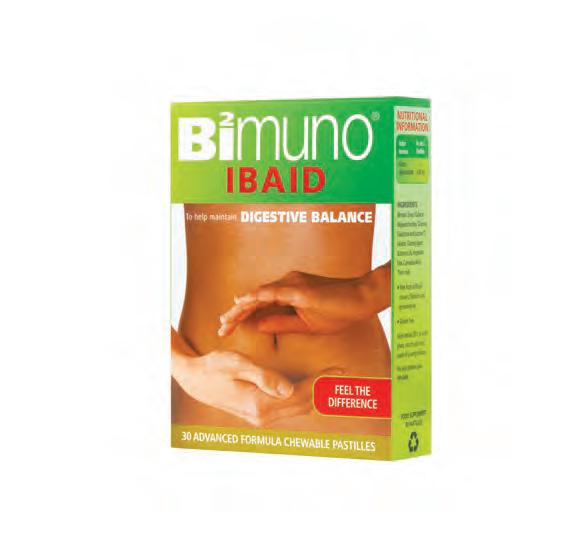
These ingredients work wonderfully well together —the sweetness of the grapefruit and ginger nicely balances the saltiness of the bacon chops. Serve with a side dish of steamed French beans, broccoli, carrots and mangetout tossed in a little crème fraîche or soured cream just before serving.
225g long-grain white rice salt and black pepper
2 ruby or pink grapefruit, about 375g each 50g stem ginger in syrup
4tbs stem-ginger syrup from the jar
4 lean bacon chops, about 115g each bunch of watercress
1. bring a large saucepan of water to the boil. add the rice and some salt, then return to the boil and cook for 12–15 minutes, or until the rice is just tender.
2. Meanwhile, cut the peel and all the white pith from the grapefruit. then, holding the fruit over a bowl, cut the segments of grapefruit from the connecting tissue and add them to the juice in the bowl.
3. roughly chop the ginger and add it to the grapefruit segments with the ginger syrup.
4. heat a large frying pan. snip the fatty edges
of the chops to prevent them from curling up. Dry fry the chops for 2–2½ minutes on each side, or until golden. Drain off any excess fat from the pan.
5. add the ginger and grapefruit mixture to the pan. bring it to the boil and allow it to bubble gently for a minute or so, then season with black pepper to taste.
6. Meanwhile, rinse and dry the watercress and discard the stems.
7. Drain the rice and arrange it on plates with the watercress. top with the chops and the sauce. ■

Win £77,700 Cash - 7 reasons to solve the puzzle
Our Puzzle coordinator and competition managers have discussed at length benefits for partaking in puzzle challenges such as the £77,700 puzzle displayed opposite.
Our 7 top reasons for you to participate:
1. “The chance to win £77,700 cash!”
2. “I like to exercise my brain”
3. “To win one of the many bonus cash prizes”
4. “It’s FREE to enter”
5. “I feel a sense of achievement in solving puzzle problems”
6. “It’s always fun!”
7. “A chance to qualify for other skill prize competitions”.
All you have to do is find the ONE word that can NOT be found in the puzzle grid.
Based on 2012 readership figures, less than 1% of readers submitted correct answers to the Wordsearch Cash Giveaway competition*
*statistics independently verified by LMG Accountants
Only a small percentage of potential competitors will submit correct answers in time.
But please remember, as it is our largest ever cash prize you must solve one of our most difficult puzzles –including diagonally reading words.
EQLPWKMFDTLGJMTVH
IEHECONOMETRICSGI
SZHTTBUHQGYSPGNBG
EIQJKELECTROLYSIS
RGQMYLOBENOBHSIWK
ER R EVTNRVPWEIVCTZ
NPNGEMEUAOXWUEDGU
DT K DOHGRBBJX U HLFH
I FZFTVUNKCSXVQSZL
PGZAZCITHVBWEYHLJ
IREVZATAF Q IGTJMUG
TFOHRG H RLREZTVLZJ
ODRSEAZITBTMTRBCV
U OPWLJHORSESH O EXH
SGXF T HZYDLFA O MLNS
SECLO V ERQVVFVN M XG
over 18 to qualify.
Solve the puzzle now – FREE entry takes less than one minute and your entry will be confirmed over the phone and in writing. Don’t miss out – ENTRY LINE
Please note: you must be a British Resident
This tremendous cash prize sum of £77,700 has now been safely set aside under authorization by competition managers to be paid out following a successful draw.
CLOSES
THURSDAY 12TH OF
£77,700 FREEPHONE ENTRY LINE
Confirm your entry in less than 1 minute by Thursday 12th of September.
0800 063 9162
If your answer is correct we will be in contact by post.
*YOU MUST BE A UK RESIDENT OVER 18 TO PARTICIPATE. CALLS LAST UNDER 1 MINUTE AND ARE FREE FROM A BT LANDLINE. CALLS FROM MOBILE NETWORKS WILL NOT BE INCLUDED IN YOUR STANDARD INCLUSIVE MINUTES AND WILL INCUR AN ADDITIONAL CHARGE. Competition name: Lucky 7 Cash Giveaway. This competition may be advertised in various forms of print and online media and may include different graphic representations and layouts. As a responder to this promotion Churchcastle Ltd and other 3rd party companies may contact you with offers by post or text. If you don’t wish to receive these offers write to Dept O, 6 Castleham Road, St Leonards on Sea, TN38 9NR or call 0808 126 3083. One entry per person. Postal responses close 1 week from the on sale date of this publication. Each correct entrant is allocated a unique number between 1 and 777,777. The winning number will be independently drawn and the £77,700 prize will be awarded if there is an exact match with an active entry. Bonus prizes available: 3 x £7000; 15 x £700; 58 x £70. One number will be drawn for each bonus prize and the prize will be awarded if there is a match with an active entry. Approximate odds of winning a cash prize: 1:10101. Draw date: 04/10/2013. Participating in this competition constitutes the right to use the name, hometown, testimonial and photograph of all winners for promotional purposes without further consent. Actors’ photos may be used to represent genuine winners.This skill competition is not connected to this publication. The organisers are not responsible for printing or technical errors and reserve the right to amend competition details, entrants unique numbers and the draw process in order to ensure a fair draw. Our Registered Office is 21 Buckle Street, London E1 8NN, but if you have any queries about this competition, please write to: Lucky 7 Cash Giveaway, 6 Castleham Road, St Leonards on Sea, TN38 9NR or call 0142 479 7531. © Churchcastle Ltd 2013. T/A Lucky 7 Cash Giveaway. Job number 1671. Registered in England No. 4301808.

QThere’s a patch of wall at the end of my garden that I want to cover with a climber.
What would you recommend?
AFirst of all, you need to construct a makeshift trellis. An inexpensive shortcut is to run strong galvanised wire through some metal vine eyes that have been hammered into the mortar between the bricks.
As for plants, clematis is ideal. Take the plant out of its pot and tease the roots loose if they’re spiralling around the rootball.
Scaling the heights: clematis is a vigorous climber
Position the clematis in a hole, spreading out any loose roots, so that the top of the rootball is four inches below ground level. Then back-fill round the rootball, firm and water. Using several short bamboo canes that have been stuck into the soil parallel to the wall, spread out the plant’s stems and tie them to the canes, then tie these to the wire. You should do this for all climbers.
Q
We’ve had geraniums in our garden for several years now. I’ve been told it’s a good idea to separate the established clumps into several pieces, but I’m not sure how to go about it. Can you help?
A Autumn or winter is the perfect time to divide geraniums or other perennials, as they’re dormant during this period. Lift a clump using a garden fork and shake off excess soil. Insert two garden forks into the clump back to back and then pull the handles together to lever it apart. Repeat until plants are a good size. This is the best way to split fibrous-rooted plants such as geraniums, michaelmas daisies and Japanese anemones.
Replant the small divisions into soil that’s been refreshed with some well-rotted compost or manure and a handful of planting fertiliser. Ensure the plants are at the same depth as they were growing previously.
QI want to plant up a few containers for some autumn colour. Is there anything I should bear in mind?
APlanting containers at this time of year means paying even more attention than usual to good drainage—compost that’s soggy and poorly drained is liable to freeze in winter and kill or damage the plants, particularly bulbs. Put in a layer of drainage material about two inches deep. Pieces of broken pots are ideal, but large stones or chunks of polystyrene trays also work. Lay fine plastic netting over the top to prevent the spaces becoming clogged with compost.
Part fill the container with a free-draining potting compost. Then pack the plants closely into the container so they’re all at the same depth as they were in the planting pots. Leave a gap of at least half an inch between the top of the compost and the rim to allow room for watering. Firm the compost and water it well. Stand the container on pot feet or pieces of tile so excess water can drain.

l Check that bulbs potted for forcing for flowers in late winter or early spring are still sound and moist. Bring indoors any with buds above soil level, but keep them cool.
l Check plant ties and tie in any new shoots before the autumn gales.
l Pot up some of the best summer bedding plants—such as ageratums, busy lizzies, helichrysum and petunias—to keep for spring cuttings.



Send your gardening questions to excerpts@readersdigest.co.uk
climbing frame to make a fruit cage to protect your strawberries or other fruit from hungry birds. ■
Many thanks to Gill Cordock of Yorkshire for sending this in
Email your gardening tips and ideas—with photos, if possible—to excerpts@readersdigest.co.uk. We’ll pay £50 if we use them on this page.


“I
can stay in the home I love which is my life” A stairlift really can make all the difference. An 81-year-old great grandmother has spoken out about how a stairlift has changed her life.
“Thedifferenceisablessing,”says MrsSergison.“Isimplycan’texplain how much the Acorn Stairlift has helpedme.Mostimportantly,Ican stayinthehomeIloveandwhichis mylife.”



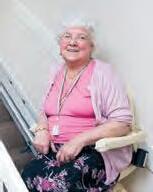


I spent most of the late Nineties convincing people that the web wouldn’t blow up. Back then, the mere idea of an internet company made some investors gasp. Fast forward 15 years and Yahoo recently paid a cool £20m for an app built by a 17-year-old British schoolboy.
Every day, the media is stuffed with stories about how technology is transforming business. The online outlets of our major supermarkets now offer everything from groceries to garden furniture. Most high-street retailers let us choose “mouse to house” or local collection, and tablets are fast becoming our primary shopping platform.
I’m not quite mad enough to suggest the web is a magic business-boosting bullet, but we’ve only seen a fraction of its game-changing potential. Gadgets such as Google Glass— a computer you wear like a pair of specs—and “non-computing” touch screens in bus shelters and kiosks will pale in comparison with the future integration of online experience into everyday life—and the impact this will have on business. online
In the circumstances, it’s easy to assume that every business is online. Yet 99% of the UK’s five million companies are small and medium-sized. Of those, just 36% have a website and only a third sell goods and services online. If they sold and marketed

Is this what they mean by cloud computing? Too many businesses aren’t taking advantage of new technology

digitally, economists predict there would be an annual £18bn boost.
It’s vital that small firms access the right help to unlock the web’s huge and varied benefits. Cheeringly, out-of-the-box options (the kind that need no training or expertise) allow any organisation to enjoy digital marketing, advanced customer analytics, cloud computing and seamless payments processing. The key for these organisations is realising why they should.
Ever dreamed of becoming your own boss? There’s never been a better time to start a business. Online platforms such as eBay and Facebook Money make it super-simple to find and connect with customers and manage your own hours.
Croesus-like riches aren’t guaranteed, but web tools can help make your good idea grow.
Are you inspired to share your digital skills with others? Visit go-on.co.uk/ rdigest for more.
Or to find a local taster session, call freephone 0800 77 1234
l Businesshelp.lloydstsbbusiness.com is stuffed with online business tools, ideas and guides on everything from marketing and social media to improving your search-engine rankings.

l Dropbox.com offers free online and offline access to all your photos, docs and videos. Download the app for onthe-go access, or send links to share with others.
l Prime.org.uk (the Prince’s Initiative for Mature Enterprise) is full of online resources to help over-fifties gain sustainable self-employment.
l Use the scanner Pro app to manage your expenses. Turning an iPhone or iPad into a portable scanner, take pics of your receipts and categorise them before sharing.
l Evernote.com lets you capture, store and share notes, photos and audio in virtual “notebooks” across your devices.
l hootsuite.com makes it easy to manage your social media community and juggle multiple accounts and networks from one dashboard.
l Google Apps lets you access documents, spreadsheets and slide shows anywhere on Google Docs. Several people can work on one file simultaneously.
l inDinero can help small businesses manage their finances by linking bank and credit card accounts to one central dashboard.
Until recently, enjoying catch-up TV online or watching online movies meant viewing via a PC, laptop or tablet. Connected TV uses the internet to bring these services direct to your telly. Many new TVs are “smart”, meaning they can be connected to the internet easily through a broadband connection. But if you’re happy with your old TV, several set-top boxes offer internet access too. Alternatively, give your Blu-ray player or games console a go. Head to thefutureisconnected.co.uk for more information. ■


At the recent Goodwood Festival of Speed, a car was sold to a telephone bidder for £19.6m. We don’t know who the buyer was or why they were prepared to go to such expense, but we do know it makes the Mercedes W196 Grand Prix car (below), driven by Argentinian racing driver Juan Manuel Fangio in 1954, the most valuable car ever sold.
How much can an old car be worth? The answer is, of
course, it’s worth whatever someone is prepared to pay for it. While we all scrimp and scrape, the global mega-rich are still prepared to throw whatever money it takes to get a car that excites them.
Industry expert Angie Voluti, who’s launching

the Vintage Value Trends classic car value service this year, says truly classic never goes out of style, even in cars. “E-Types, for instance, will always be a safe bet. Pre-war cars, however, are more popular than ever.”
But there are routes in for the average enthusiast too. “Rover MGBs and Triumph Spitfires will always put a smile on anyone’s face and I wouldn’t rule out a hike in values.”
Maybe that classic-car thrill could be yours, even if you don’t have a spare £20m knocking about.
» Read about the classic-car rally in Angoulême, southwest France, on p128.
Golf BlueMotion (from £20,335)
If you’re searching for an economic new motor that rides well, this one is based on the brilliant new Golf platform allied with a frugal engine that delivers up to 88mpg. That’s a wow figure. It’s the new standard in fuel-saving hatchbacks.


Rather than the hassle of buying a classic car, why not try one out at a track day? Just £249 gets you three hours behind the wheel of four classic Mustangs, each with its own personality. Time to live the American dream (classic americanmuscle.co.uk). ■


Would you like to downsize, release capital and be able to make the most of your leisure time...
You could move to a beautiful location and have a new detached home with a high-spec interior, that’s a delight to live in and easy to maintain. Its simpler than you think with The Park Life Group - with over 50 parks across 17 counties. People from all walks of life choose to live in a park home, or buy one as a second home, and become part of a friendly community. With almost 70 years of excellence, The Park Life Group offers remarkable value for money and superb customer service. Call us today for more details on our stunning homes available across the country.




Please Note: Library Photographs may have been used in this advertisement, merely to depict the make or model of home for sale.
These are just some of the homes available at our parks across the country
Come and see for yourself at one of our Open Days and go to www.parklifegroup.com for more details.
Truro Heights - 31 AUG & 1 SEP
Kenwyh Hill, Truro, TR1 3DY
Tregatillian Park - 31 AUG & 1 SEP
St Columb Major, TR9 6JL
Thornlea Park - 31 AUG & 1 SEP
Littlehampton, West Sussex BN17 7QD
Hedge Barton Park - 31 AUG & 1 SEP
Fordcombe, Tunbridge Wells, Kent TN3 0SL
Radwell Court - 7 & 8 SEP
Radwell, Bedfordshire, MK43 7HS
Folly Park - 7 & 8 SEP
Clapham, Bedfordshire MK41 6AL
Peppercorn Park - 7 & 8 SEP
Clapham, Bedfordshire MK41 6HB
Kingsmead Park - 7 & 8 SEP
Rushden, Northants NN10 0NF
Rymer Point Park - 14 & 15 SEP
Barnham, Nr Bury St Edmunds IP24 2PY
Waterbeach Park - 14 & 15 SEP
Denny End Road, Waterbeach CB25 9PF
Cotswold Manor - 14 & 15 SEP
Stratford Bridge, Ripple, GL20 6HE
Cheltenham Spa Parks -14 & 15 SEP
Bamfurlong Lane, Staverton, GL51 6TD
Regency Court - 14 & 15 SEP
Allhallows-on-sea, Rochester, ME3 9TD
Takeley Park - 21 & 22 SEP
Takeley Park, Takeley, CM22 6TD
Wickham Court - 21 & 22 SEP
Fareham, Hants PO17 6JS
Westgate Park - 21 & 22 SEP
Westgate, Sleaford, NG34 7QP
Truro Heights - 28 & 29 SEP
Kenwyh Hill, Truro, TR1 3DY
Tregatillian Park - 28 & 29 SEP
St Columb Major, TR9 6JL
Thornlea Park - 28 & 29 SEP
Littlehampton, West Sussex BN17 7QD
Hedge Barton Park - 28 & 29 SEP
Fordcombe, Tunbridge Wells, Kent TN3 0SL
Part Exchange Available: Solicitor and Agents fees paid.
Part Exchange Example:
Park Home Price: £129,950
House Price: £200,000
Cash to you: £70,050
LINES OPEN 7 DAYS A WEEK 01242



Christine Kent’s honeymoon took her to a classic-car rally in Angoulême, France
of shops, cafes, restaurants and bars to suit all tastes. Sitting at a bar, sipping a beer or having a coffee during the day, deciding where to eat in the evening while watching the classic cars parade by, is all part of the well-behaved and enjoyable atmosphere of the weekend.
Send us a photo of your favourite holiday, tell us briefly what made it so special, and if we include it on this page we’ll pay you £50. See address on p4.
It’s late summer in France: time once again for classic motor racing in the city of Angoulême. The Circuit des Remparts is an annual event not to be missed on any occasion. Indeed, as my husband Peter and I live in France, we even planned the date of our wedding in our local mairie office, so we could go as part of our honeymoon.
Angoulême is the vibrant regional capital of Charente in south-west France, with plenty
There’s a Concours d’Elegance parade of vehicles on the Friday evening; on the Saturday, there’s a classic car rally through the surrounding Cognac countryside, which usually involves a lunch en route for those participating. The racing is on the Sunday. During the weekend, the whole of Angoulême is awash with classic cars parked throughout its streets for everyone to view. Tickets for the racing, usually about £20, include entrance to the paddock, where you’re up close and personal with the drivers and their cars. The track is a road circuit and surrounds the remparts of the city. There’s plenty of seating in the stands provided, but the view and the atmosphere under the tree-lined ramparts is where we chose to watch from.
For the Sunday evening, we
had booked into the Auberge de l’Etang Bleu, Vieux-mareuil, a 45-minute drive outside Angoulême. Its restaurant, classified “gastronomic”, was superb, with silver service and a dining room lit by chandeliers. The Auberge has been owned by the same family for more than 50 years and was dripping with antiques and artworks that could have graced any chateau. It was the perfect ending to an unbelievable weekend.
French Country Cottages has seven properties to let near Angoulême (french-countrycottages.co.uk). If you have a classic car, Cottages and Classics has an enticing Circuit des Remparts package, from £595pp (+33 5 46 33 36 09; cottagesandclassics.co.uk).
theweekenders.co.uk
Longings for weekends away often start off as a vague notion —somewhere child-friendly, in the middle of nowhere, a city break, etc. This website brings focus to vague plans in a few clicks. Want some seaside in East Anglia? No problem. There are gaps in the portfolio—no Romantic London, for example— but it’s a website with promise, good design and well-written hotel and destination summaries. Let the planning commence!
Sicily’s most southerly airport opened earlier this year and this month
Ryanair begins twiceweekly flights to Comiso in Ragusa from London Stansted, cutting down transfer times for guests journeying to the island’s south-east, which includes the ancient city of Modica. Long Travel has seven nights from £477pp, including the new flights, accommodation and car hire, staying at Il Paesino apartments near Palazzolo Acreide (01694 722 193; long-travel.co.uk).


Celebrating local ice cream and seafood and other Cornish delights, the tresco and bryher Food and Drink Festival, on September 14 and 15, is your calorific motivation to escape to the Scillies this month. There’ll be demonstrations, tastings and specially crafted menus on both Tresco and Bryher. For those who can’t make it, there are autumn foodie workshops on bread-making and pasties. Find out more at tresco.com.
Landscape photographer
John Gravett leads photography

holidays, snapping the beautiful scenery around his Lake District base in braithwaite. Courses are intensive and hone in on particular skills such as black-and-white photography, flora and fauna, and more. Dates for next year are released this month, so book early to avoid disappointment. From £685pp (full board) for six nights (lakeland photohols.com, 01768 778 459). ■
An unassuming civil servant and a 12-year-old girl are the heroes of this month’s novels

Held in Belgium, Expo 58 was the first World’s Fair after the Second World War, with nations from both sides of the Iron Curtain invited to display their latest scientific advances. Inevitably, the stated aim was to foster “the unity of mankind”. Equally inevitably, what followed was six months of ferocious international rivalry, as the participating countries sought to steal each other’s technological developments through a network of spies.
Coe is always willing to experiment with different styles in the same book: his most famous, The Rotters’ Club, even finished with a 13,955-word sentence. Yet, unlike many literary experimenters, he never forgets his duty to entertain—a duty he takes particularly seriously here. Among much else, we get several dollops of Ealing comedy (complete with a mild-mannered Brit as the reluctant hero) and several more of oldfashioned spy movies (complete with blokes in trilbies and trench coats). He also has plenty of fun with how
BY JAMES WALTONJames Walton writes and presents the BBC Radio 4 literary quiz
The Write Stuff
?

name the author Answer on page 134
Can you guess the writer from these clues (and, of course, the fewer you need the better)?
1. He’s considered one of the greatest British novelists of the 19th century—and greatest British poets of the 20th.
2. He gave up fiction after getting ferocious reviews in 1895.
3. He’s buried in Westminster Abbey—except for his heart, which is in Dorset.
much, and how little, Britain has changed since 1958.
The result may not be his most profound novel, but it’s irresistibly enjoyable—not least because it’s one of the few comedy thrillers I can think of that really is both funny and thrilling.
by Meg Rosoff (Penguin, £12.99; ebook, £7.99)
In recent years, the line between fiction for adults and fiction for children has become interestingly blurred, with certain novels impossible to categorise as one or the other. Think, most famously, of The Curious Incident of the Dog in the Night-Time or The Boy in the Striped Pyjamas.
Meg Rosoff already has form in this area—notably with How I Live Now, which next month will receive another burst of publicity with the release of Kevin Macdonald’s film version. Meanwhile, her new book brilliantly pulls off the same trick. The narrator is 12-year-old Mila, whose best friend, annoyingly, has just discovered boys—and who is herself torn between the desire for adulthood and wanting to be a proper, carefree child again, kept safe by the people she trusts.
Visiting America with her dad, Mila then gets involved in a mixture of road trip and mystery story when an old friend of his goes missing, leaving a wife and baby behind. (Rosoff is also sharp on how good 12-year-old girls are with babies.) What follows is a memorable portrait— touching, alarming and funny by turns—of that time in your life when you first realise how badly adults can mess things up.
Dominion by C J Sansom (Pan, £8.99). Hugely acclaimed thriller set in an alternative 1952 Britain ruled by the Nazis and with Churchill leading the underground resistance.
Servants by Lucy Lethbridge (Bloomsbury, £8.99).
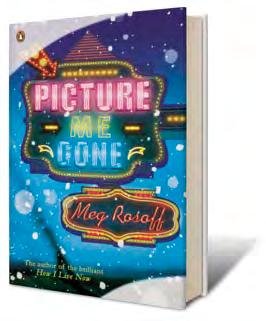
By no means the standard Downton Abbey cash-in. Instead, a brilliantly researched and often eye-opening account of 20th-century life below stairs.
The Hydrogen Sonata by Iain M Banks (Orbit, £8.99)
The last science-fiction novel by the much-loved Banks who died in June.
A Survival Guide for Life by Bear Grylls (Corgi, £7.99)
Inspiring tales and life lessons—taken from his adventures and applied to everyday life.
Coco Chanel by Justine Picardie (Harper, £8.99)
Authoritative and eyeopening biography of the French fashion designer (left), including her time as a “horizontal collaborator” with the Nazis in occupied Paris.
September’s paperbacks ►

A revealing insight into the world of forensic science—and how the mystery of the Romanov royal family was finally solved

Forensic science is now such a familiar part of life—not least because of TV crime shows—that one of the most startling facts in Silent Witnesses comes right at the beginning. For much of human history, Nigel McCrery reminds us, there were only two ways of knowing that a suspect had actually committed the crime: if they told you, or if somebody else saw them do it. The story of how all this changed is the subject of this fascinating book.
McCrery is certainly well placed to write it. Not only did he work for nine years in the police, but since moving into TV, he’s created both Silent Witness and New Tricks. That background is put to superb use here, as each chapter takes a different theme and explains how the breakthroughs were made.
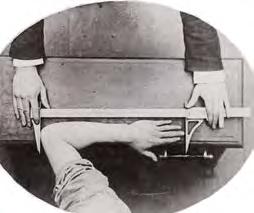
Before fingerprinting, there was... arm measuring
Chapter one, for instance, tackles the surprisingly tricky problem of how to identify someone. It’s also a chapter where you end up feeling a bit sorry for the French scientist Alphonse Bertillon. In the 1880s, it was Bertillon who came up with a revolutionary system of measurements—including the circumference of the head and the length of arms, legs and fingers—that finally enabled the police to establish beyond all doubt that they’d got the right person. Yet, in little more than ten years, his system was obsolete, replaced by the rather simpler method of fingerprints. (And fingerprints, of course, have the added advantage that criminals don’t tend to leave their head measurements at the crime scene.) From there, McCrery moves on to blood, ballistics—the science of finding out which gun fired which bullets—and trace evidence, the kind that has to be studied with a microscope.

r D e XCLu SIV e : nIGeL
mCCrery’S
ChoICe of the fIVe beSt forenSIC
Postmortem by Patricia Cornwell
It’s impossible not to mention Cornwell in this list and Postmortem is the novel in which we first meet her now-iconic chief medical examiner, Dr Kay Scarpetta.
Déjà Dead by Kathy Reichs
Reichs’s debut starts with the discovery of a carefully dismembered corpse. As the body count rises, forensic anthropologist Temperance Brennan must
CrIme noVeLS ►
Along the way, there are plenty of surprises. The first case solved by ballistics came in 1794—but it wasn’t until 1901 that scientists could distinguish human and animal blood. McCrery also illustrates each stage of the progress with vivid historical case studies, which serve up the kind of whodunnits that wouldn’t disgrace his TV shows. (Be warned: some of the studies are not for the faint-hearted.)

The book finishes with perhaps the biggest breakthrough of them all. DNA evidence was first used successfully in Leicester in 1987. A few years later, it was central to a classic cold case in which McCrery himself played a significant part. The Russian royal family had been shot by the Bolsheviks in 1918, and in 1989 some bodies were officially exhumed from what seemed to be their likeliest burial place. But were these really the lost bones of Tsar Nicholas and the other Romanovs?
Given the location in which they were discovered, the fact that one of the skulls had golden bridgework (which Nicholas Romanov was known to have had), and the fact that when that same skull was superimposed against a photo of Nicholas it matched perfectly, it seemed highly probable that these truly were the bodies of the Romanovs. However, as compelling as the circumstances might be, there was still no absolute proof, and so doubts lingered.
“It’s not all miracle breakthroughs, you know”: Emilia Fox assumes the steely-eyed look of an overworked forensic scientist in the TV show Silent Witness
Silent Witnesses: a History of Forensic Science by Nigel McCrery is published by Random House on September 5 at £18.99 ‘‘ ►
It is at this point that my involvement in the story begins. I came across the story of the remains while I was working on the BBC show Tomorrow’s World in 1992. Fascinated, I contacted the Russian Forensic Science Service in Moscow to find out more, and was put through to one of their leading DNA specialists, Dr Pavel Ivanov. He outlined what they had done so far, but explained that they had insufficient funds to bring the remains to England for DNA analysis. I offered to pay, which he was delighted about. The next step was to contact the then Home Secretary (and
There can’t be many people who’ve had an entire royal family in the boot of their car
fortunately my own constituency MP), Ken Clarke, who authorised the DNA work to be carried out at Aldermaston, the UK Home Office’s forensic science service. It was to be done by a British scientist, Dr Peter Gill, who was extremely excited at the prospect. Pavel Ivanov then flew into the UK carrying nine right arms in an old British Airways bag. The bag promptly went into the back of my Volvo and we drove to Peter Gill’s house. I couldn’t help but wonder how the police might react if they stopped me and found that I had nine skeletal arms stashed away. Still, there can’t be many people who’ve had an entire royal family in the boot of their car.

Only DNA analysis could reveal the truth about the Romanovs
The genetic analysis of the bones was carried out over a number of weeks, testing against samples of relations to the Romanovs, such as the Duke of Edinburgh, whose maternal grandmother Princess Victoria of Hesse and by Rhine was the sister of Tsarina Alexandra. At the end of this period Peter Gill had established that the remains were indeed those of the family. It was momentous news, and obviously received a great deal of media attention. Given that there was no longer any doubt about who they were, the remains of the Romanov family were also finally able to be given a proper burial. They were interred in the vaults of the cathedral of St Peter and St Paul in St Petersburg on July 17, 1998. There they now lie, along with so many great tsars of Russia. I subsequently received a letter from the Russian Forensic Science Service thanking me for my help in the project, and also received the thanks of the surviving members of the Romanov family. I am very proud of both.”

an D the name of the author IS … Thomas Hardy. (Those ferocious reviews were for Jude the Obscure—or “Jude the Obscene” as it was called in the press.)
uncover the identity of the killer.
The Chemistry of Death by
Simon BeckettFor something with a more British flavour try this novel featuring forensics expert David Hunter, working in an isolated Norfolk village.
Seeker by Bernard Knight
The first of the Crowner John Mysteries, which feature Sir John de Wolfe, a former crusading knight appointed to a position roughly equivalent to county coroner. Fans of Brother Cadfael will particularly enjoy it.
It’s important to remember forensic science has a long history. The most famous of all literary detectives often employed early forensic techniques —and Doyle famously based him in part on the forensics pioneer Dr Joseph Bell. n

William Dalrymple is a multi-award-winning historian, writer and broadcaster. He’s also co-founder and co-director of the Jaipur Literary Festival. His latest book Return of a King: The Battle for Afghanistan, about the first Afghan war (1839–42), is out now.

The summer after I left university, I embarked on a trip tracing Marco Polo’s journey from Jerusalem to Mongolia. During those four months I kept a diary, and it was Robert Byron’s style that I plagiarised. I’d read The Road to Oxiana at Cambridge and it was different from any travel book I’d ever opened—stylish and substantial, witty and romantic. I savoured every word. Better than any creative-writing course, Byron was my tutor. This is surely the greatest modern travel book.
As told to Caroline Hutton
When I was making the transition from travel writer to historian and wondering how to use primary sources to best effect, I read this eye-opening book based on the letters of the Lennox sisters, who were at the centre of Anglo-Irish society and politics in the late 18th century. Their letters were filled with topics ranging from the high drama of elopements and unsuitable marriages to very intimate details; reading them feels like eavesdropping on private conversations. As my first history book White Mughals was also largely based on letters between siblings, I was inspired by the way Tillyard brought all the characters to life in non-fiction, while also succeeding in making it a gripping read.
by Cormac McCarthy


To my mind, McCarthy’s descriptive powers make him the best prose stylist working today, and this book the Great American Novel. It’s a beautifully written, dark, bleak western—but unlike any western I’d ever known. In my latest book Return of a King I had to write scenes of extreme violence and I turned to Blood Meridian to work out how to do that well. There’s a great art in learning not to overplay violence and McCarthy is a master. He pares it down, often using unemotional, matterof-fact descriptions that heighten the horror. So while the atrocities that occurred during the retreat from Kabul in 1842 form the emotional centre of my book, that chapter was also the shortest. ■











win £50 for every reader’s joke we publish. Email excerpts@ readersdigest.co.uk or go to facebook.com/readersdigestuk
¶ The stressed-out doctor spotted Bob the hypochondriac sitting in the surgery waiting room as he walked through to speak to the practice nurse.
“Not again, Bob,” said the overworked GP. “You were only here on Monday afternoon, and now on Wednesday morning?”
“Couldn’t come yesterday though,” replied Bob, “I was ill.”
M Noone, Lancashire
¶ A young, inexperienced bank robber gets caught during his first stick-’em-up and ends up in court.
Crucial evidence—including CCTV recordings from the bank lobby—has gone missing. After weeks of deliberation, crossexaminings, conflicting witness statements, a hung jury and a huge deal of frustration, the young man is found not guilty.
As the foreman states the verdict, the rather lucky defendant pipes up, “Does that mean I can keep the money?”
Robert Bluck, Birmingham
¶ Ivan Pavlov walks into a bar. The bartender rings the bell for last orders. Pavlov thinks, Cripes—I forgot to feed the dog. Seen on Reddit

“miss, how are you able to do that without an app, or computer? are you, like, a witch or something?”
¶ an inebriated man was stumbling down the street, swaying, with one foot on the kerb and the other in the gutter. A policeman passing in his car pulled over and said, “I’ve got to take you in, mate. You’re obviously drunk.”
The intoxicated man asked, “Officer, are you absolutely sure I’m drunk?”
“Yes, my friend, I’m very sure,” said the bobby. “Let’s go.”
Breathing a sigh of relief, the wastrel replied, “Thank goodness. I thought I was crippled!” Seen on the internet
¶ Miss Finch was giving her class a lesson on the meanings of various adjectives. “I want everybody to try to use the word ‘brilliant’ in the same sentence...twice!”
“My father bought my brilliant mother a brilliant dress,” said little Jenny.
“Very good,” said Miss Finch.
“My mother planned a brilliant banquet and it turned out brilliantly,” said little Jack.
“Ooh, great,” said the teacher. Then little Johnny spoke up.
Recycling day should be renamed, “See who’s an alcoholic in your street” day Comedian Matt Rudge
“Last night at the dinner table,” he said, “my sister told my dad she was pregnant. He said,
‘Brilliant, just bloody brilliant!’ ” Seen at jokes.wikia.com
my HP deskjet has started writing plays on its own. Harold Printer
Comedian Mark Restuccia ►

The Trouble wiTh sepTember by josh widdicombe
Award-winning comedian Josh Widdicombe is 5ft 6.5in tall, and his favourite TV show is The Simpsons. Each month, he lets us know just exactly what his problem is.

It’s not that I dislike September, it’s just that I struggle to find anything to like about it. Summer is essentially over, Christmas is a speck in the distance. It’s a no-man’s-land, populated by people nostalgic for their summer holiday and impatient to open the first door of their advent calendar.
Some complain that the build-up to Christmas gets earlier every year; well, maybe this is September’s
fault rather than Christmas’s. If there was a bit more going on, people wouldn’t start counting down the days until they can drunkenly settle down in front of The Snowman.
September is at best downtime, a 30-day hangover from the fun that we had the month before, as we prepare ourselves for the fun that’s coming up. Maybe we should be thankful. We can’t go straight from the excitement of Pimm’s in the sun to winter excitements of huddling around the pub fireplace, trying to convince ourselves that mulled wine is festive and not just sickly.
In fact, thinking about it, maybe we need more months like September. Let’s embrace this month of nothingness as something different to look forward to after a packed summer. And, if that fails, at least it isn’t that long until Christmas.
The internet is alive with tales of time wasted by misleading estate-agent descriptions. We collated a few helpful translations of the agent-speak found in adverts (provided by users of web forums).
CHarming = inconvenient
good aCCess to motorway network = you won’t get a job around here
kitCHen reCently renovated = owner added new unit handles
deCePtively sPaCious = has lots of mirrors
vibrant area = beware of muggers
retro deCor = comes with vomit-inducing avocado paisley vinyl floor internal viewing
reCommended
= looks terrible from the outside in need of modernisation = in need of demolition sea glimPses
= get your binoculars out Close to transPort links = railway line at bottom of garden.
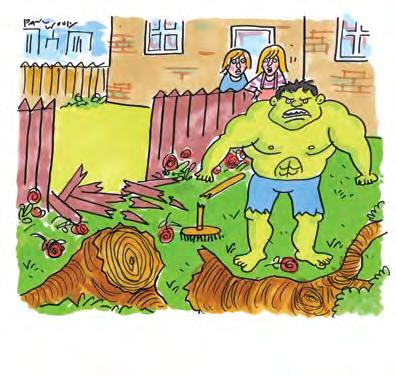
“for someone with green fingers, he’s absolutely useless round the garden…”
In contrast to the codified communications above, at least these notices are refreshingly frank.


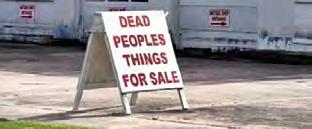

¶ Q: Why is Peter Pan always flying?
A: He Neverlands. Seen at 9gag.com
¶ I didn’t go to university. I screwed up my A-Levels. I say screwed up, but I’m being a little hard on myself—technically they came back ungraded. I wrote to the examining board and said, “Well, if you can’t be bothered to grade them, I can’t be bothered to go to university.”
Comedian Jack Dee
¶ I went to a restaurant and ordered a baby roast chicken. They gave me a burnt egg.
Comedian Piff the Magic Dragon
¶ My friend left his laptop on the floor of my room. My gran thought it was a scale. Conclusion: my gran weighs £950. Seen at awesomephilia.com
ladies and gentlemen, please welcome Justin moorhouse
favouriTe one-liner?
“A cyclops and a unicorn. Now that’s an accident waiting to happen” –Rohan Agalawatta
do you have a favouriTe of your own jokes?
“My sister used to say the best way to a man’s heart is through his stomach. She’s no longer a cardiac surgeon.”

Justin moorhouse is on tour with his show Justin Time. for details, see justinmoorhouse.com
worsT heckle received? Millennium eve. I was playing a last-minute gig at a packed club in Nottingham. I was doing this character called Derek Randall, a really pathetic insurance salesman—and it wasn’t going well. This bloke stood up slowly and looked at me with compassion in his eyes. He said, into silence, “’Ey, why don’t you do us all a favour and just leave it?” So I walked off the stage to the sound of my own footsteps. I threw the costume away and never played that character again.
funniesT Thing ThaT’s ever happened To you?
I was about 17 and on my first ever lads’ holiday in Spain. Me and my friend were sitting outside a taverna and the shop opposite had a very wide, six-foot deep fruit-and-veg display. It was pristine—an amphitheatre of fruit. A blind man walked past with a stick and hit the leg of the stand. It all came down.
favouriTe Tv show?
¶ I wish Noah had swatted those two mosquitoes.
Seen on a church sign posted online
The Young Ones. I was 12 or 13 and it was the first TV show me, my brother and my dad watched. My mum hated it. I was too young to know what alternative comedy was, but it did feel new and fresh.

finally, who’s your comedy inspiraTion? Les Dawson. At face value, he’s an old-school comic doing mother-in-law jokes. But there’s much more to him. ■
Grab a cup of tea and a biscuit and bend your mind to these six puzzles, ranging from the mildly puzzling to the pen-chewingly fiendish
1. disco liGhts
Cross the maze from bottom to top. You may only travel from a pink block to a yellow one, from yellow to blue, from blue to green and from green to pink on your way

to the destination. You don’t have to start at a pink block, but you must follow the correct colour sequence. Diagonal moves aren’t allowed.
2. Geometric Gap
Your task is to deduce which of the four options given in each case completes the set.



3. sudoku To win, you have to put a number from 1 to 9 in each outlined section so that: • every horizontal row and vertical column contains all nine numerals (1–9) without repeating any of them • each of the outlined sections has all nine numerals, none are repeated. If you want more of a challenge, try timing yourself too.
difficulty HHH
* Entry is open only to residents of the UK, Channel Islands, Isle of Man and Republic of Ireland aged 18 or over. It is not open to employees of Vivat Direct Limited (t/a Reader’s Digest), its subsidiary companies and all other persons associated with the competition.
Make this set of scales balance perfectly by placing all five of the supplied weights at the top of the puzzle in the pans—one weight per pan. The weight of the rods and pans can be ignored, but each individual weight is directly affected by its distance from the tipping point at the top.
1. disco lights

2. Geometric Gap: B
3. sudoku: If you solved it within: 15 minutes, you’re a true expert; 30 minutes, you’re no slouch either; 60 minutes or more, maybe numbers aren’t your thing.

4. a Weighty problem
£50 prize question (answer will be published in the october issue)
place a number in the central box by which all the numbers can be divided without leaving a remainder. the number is greater than 1
answer to august’s prize question:
and the £50 goes to… Christine Herrington from Lancashire
w I n £100 and a Cartoon pr I nt
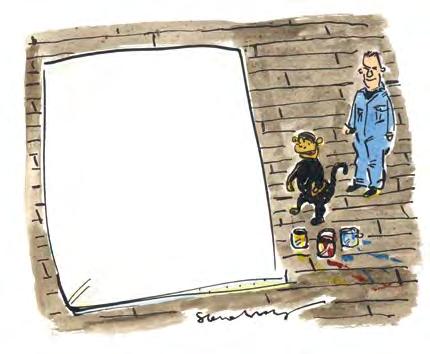
Think of a witty caption for this picture and you could beat the experts at their own game. The three best suggestions will be posted on our website in mid-September alongside an anonymous caption from our professional cartoonist. Visitors can choose their favourite— and if your entry gets the most votes, you’ll receive £100 and a framed copy of the drawing. Submit to captions@readersdigest.co.uk or the address on page 4 by September 6. Enter and vote online at readersdigest.co.uk/caption. We’ll announce the winner in our November issue. n

Well, it was a closer contest this month, but reader David Anderson’s very patriotic caption, “He’s fine. He’s just spent the afternoon watching Andy Murray,” was still the clear winner over cartoonist Steve Way’s effort “Shsh, your father is reviewing his energy policy.” The readers are still well ahead in the scoreboard— can the cartoonists catch up?
scoreboard readers 14 cartoonists 5

New series of Downton Abbey! Read our special feature on all things above and below stairs
• How honest are we? The answer will surprise you!
• Alzheimer’s—understanding the disease and getting help
PLUS The return of our 100-Word Story competition
specsavers.co.uk

Includes all frames, lenses and Extra Options. Excludes reglazes, safety eyewear, contact lens products, non-prescription sunglasses. Applies to one pair of glasses, from £69 range or above. Cannot be used with other o ers. Monday to Friday. Discount not transferable in whole or part for cash. SKUs 25381658, 25144444. ©2013 Specsavers. All rights reserved.
